THE TECH ISSUE



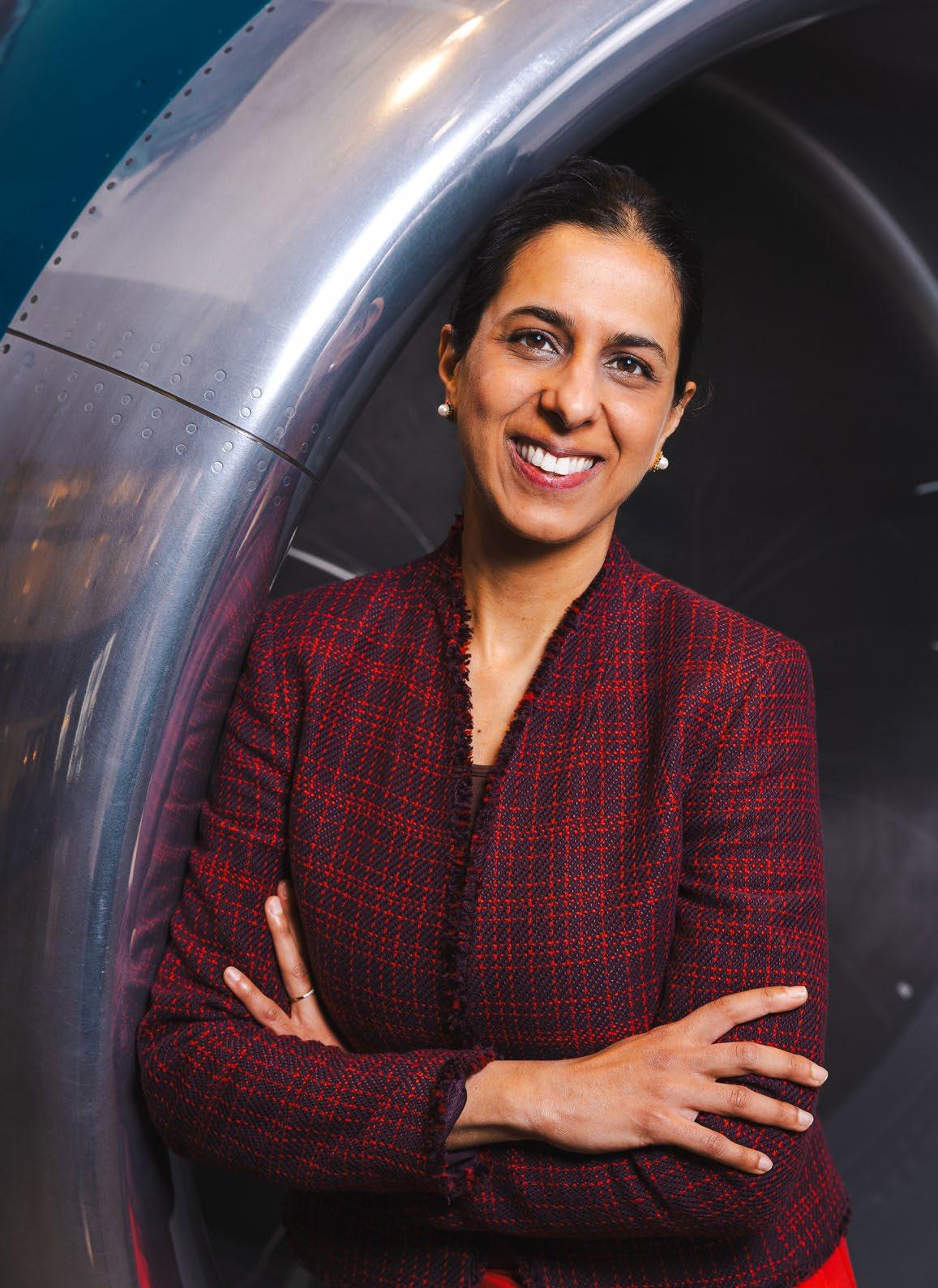
United Airlines’ Javaria Neagle embraces challenges as catalysts for growth to strengthen her relationships and inspire her team to thrive in uncertainty P68 ↘







United Airlines’ Javaria Neagle embraces challenges as catalysts for growth to strengthen her relationships and inspire her team to thrive in uncertainty P68 ↘


Families and formative experiences helped six leaders realize that a legal career was destined since childhood
P16
Clemson University’s “forever business” philosophy guides Beth Crocker’s work in sustainability and stewardship
P25
David Modzeleski leads with a “one team” approach at media giant Warner Bros. Discovery
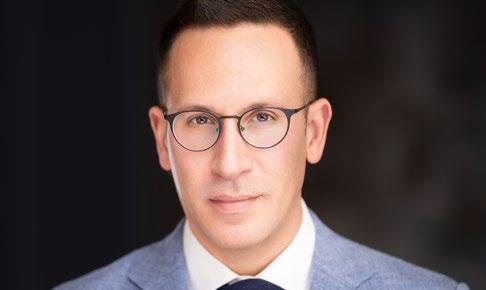
P50
Sarah Decker champions a safer digital world with purpose and passion at McAfee
P58
Kyanna Sabanoglu continues to expand her IP and privacy purview at Meta

P78
Georgia Magno brings two decades of international legal expertise to Baker Hughes
P98
Tom Yebernetsky is a Navy veteran with a love of all things automotive, and he’s right at home at Ford
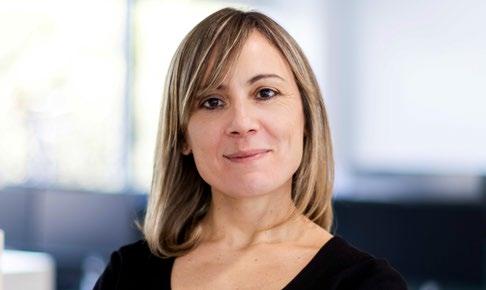
P112
Ala’a Wafa explains why she chose to remain at a company she only intended to be at for two years
P116
Steve Heckle of LKQ Corporation sums up decades of finding new ways to bring order to chaos

P135
Alan Bowie reflects on how his family and intellectual curiosity have shaped the varied career path he charted to Simon & Schuster
P142
Bo Han talks IP strategy, protecting scientific breakthroughs, DEI, and being a working mother at Orbital Therapeutics
P164
Valencia Gallon-Stubbs comes home to Daytona Beach to lead the general counsel’s office at BethuneCookman University
P183
Chandra Mitchell builds a new legal function at newly public Pactiv Evergreen

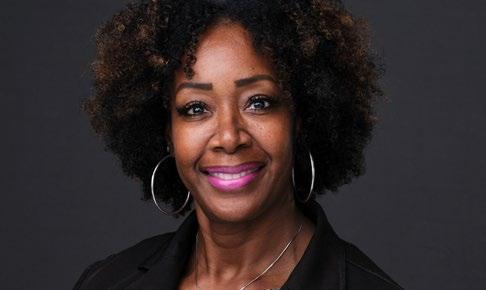
Creative
VP, Editorial
Frannie Sprouls
Managing Editor
Melaina Cecilia de la Cruz
Contributing Editors
Megan Bungeroth
Rhiannon Root
Kristen Tatroe
Hana Yoo
Contributing Writers
Zach Baliva
Frank DiMaria
Will Grant
Keith Loria
Billy Yost
Art Director
Anastasia Andronachi
Designer
Arturo Magallanes
Photo Manager & Video Director
Cass Davis
Head Developer
Jose Reinaldo Montoya
Contributing Photo Editor
Sarah Joyce
CEO & Publisher
Pedro A. Guerrero
Chief of Staff
Jaclyn Gaughan
SALES
Directors, Sales
Samantha Hershman
Aleksander Tomalski
Director of Talent & Development, Guerrero Media and
Lead Recruiter, Guerrero Search
Haylee Himel
Senior Content & Advertising Directors
Megan Apfelbach
Kara Thomas
Content & Advertising Manager
Shayna Wood
Reprints
AUDIENCE & ENGAGEMENT
VP, Hispanic Division
Head of Audience & Engagement
Vianni Lubus
Social Media Coordinator
Rodrigo Cortés
Director, Events
Jill Ortiz
OPERATIONS
Chief Operating Officer
Tere Pérez Lobatón
CFO
Cedric Reingold
Senior Director, Client Operations
Cheyenne Eiswald
Manager, Client Services
Andrew Evangelista
Editor’s Letter
evolves. It’s small talk topic number two, right after the weather. But what I don’t think we talk about enough is how the legal system evolves alongside it—and sometimes in spite of it. So, we’re having that conversation right here in our Tech Issue, where seven attorneys take you inside their mission to support, regulate, and innovate within the tech space.
It’s easy to feel overwhelmed by the headlines about AI, data breaches, and the blurry boundaries of intellectual property in digital spaces. When I look at these issues through a legal lens, I feel a surprising sense of reassurance. As someone who is a little unsettled by the unchecked capabilities of AI—reading the Wikipedia entry for “technological singularity” was a bad call on my part—I take comfort in knowing there are entire legal disciplines dedicated to keeping an eye on tech. They’re here to make sure innovation doesn’t outpace ethics, and that the humans behind the code are held accountable.
That sense of accountability and intention is something we saw firsthand during our cover shoot with Javaria Neagle, head of litigation at United Airlines. The shoot took place at United’s Chicago headquarters, just a few minutes from our own office. I had the chance to attend and meet Javaria in person, who brought such an incredible energy and warmth to the day. She was as personable as she is impressive, and while her work isn’t solely tech-focused, she explained how everyone’s role in the company has a direct impact on the customers. And her story is one that reflects the dynamic, thoughtful spirit at the heart of this issue.
While the Tech Issue grounds us in the present (and future), our focus section, “Dreams in Motion,” looks back to the childhood origins of our featured executives’ legal aspirations. The concept of it came from years of reading about attorneys whose earliest inspirations came from being the best debater on the playground or watching Legally Blonde . It’s taught us that often, a story begins earlier than we’re used to telling it.
Not all of us end up in the careers we envisioned at age ten (I did not become a soap carver in New Zealand), but when someone does, it’s a beautiful, affirming thing. It’s proof that the kid versions of us would be proud, and a reminder that early dreams don’t always fade; sometimes, they just evolve.

Melaina Cecilia de la Cruz Managing Editor









Open the door to diverse audience reach, business leaders, and talent pools with Guerrero.
Share in Our Mission





Celebrating legal leaders’ latest efforts and achievements, including transactions, expansions, negotiations, and inclusion initiatives
Leigha Hanby learned how to avoid career stagnation and to deliver a coherent, relatable story during litigation at Dick’s Sporting Goods
By Frank DiMaria
LEIGHA HANBY HAS BUILT HER LEGAL career around two major themes: subject matter agility and the dramatic art of storytelling.
As senior corporate counsel at Dick’s Sporting Goods, Hanby says that lawyers must flexible and be open to professional growth. When their accomplishments become their professional identities, they run the risk of self-limiting.
“[At Dick’s Sporting Goods] the business has developed in an area that,
fortunately, has allowed me to expand my area of practice within this company and to use my strengths,” she says.
In a company that assigns sports metaphors to its associates, customers, and operational strategy, Hanby is the utility infielder of the legal department. Her litigation background has fostered an openness that’s become an asset to her career.
“The answer to the question, ‘Have you done this before?’ rarely needs to be ‘yes,’” Hanby says. “It needs to be

Hanby Senior Corporate Counsel Dick’s Sporting Goods
“I think of trial as theater … The goal is to create a coherent narrative that can bring a dense or unfamiliar topic to life in a way that the jury and judge can relate to and understand.”
something more along the lines of, ‘I can, and this is how I would approach it.’”
Starting at Dick’s with just three lawyers on her team, she quickly learned that adaptability is essential. “On a smaller team, you have to avoid staying stagnant in your career growth and development,” Hanby says.
The other overarching cornerstone of Hanby’s career is theater. As an undergraduate at Duquesne University, Hanby double majored in theater and psychology. She is as passionate about her transition from her theater and psychology background as she is about her accomplishments as an attorney.
“I think of trial as theater,” she says. “We develop the story through depositions and discovery, craft its components through pretrial practice, and highlight key elements with themes. The goal is to create a coherent narrative that can bring a dense or unfamiliar topic to life in a way
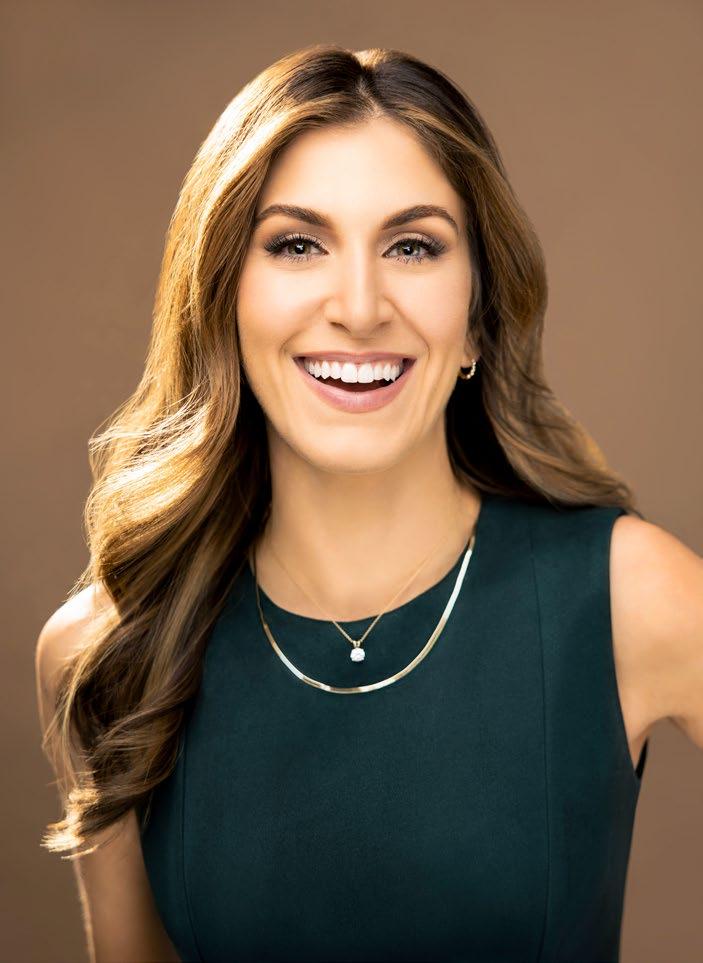
that the jury and judge can relate to and understand.”
Outside counsel have seen Hanby’s ability to roll with the punches and finesse compelling trial narratives firsthand. “Leigha is comfortable being uncomfortable,” says Brendan Ryan, a partner at Kirkland & Ellis. “She embraces the unknown and rolls up her sleeves to solve problems. Plus, she has great trial instincts. Whether writing a brief or examining a witness, she knows how to craft stories that resonate. She’s everything you’d want in an in-house partner, and then some.”
Originally hired as corporate counsel in Dick’s real estate group, dealing with lease administration, construction, and facilities, Hanby’s portfolio has expanded to include general litigation matters, including real estate, regulatory, and consumer complaints.
Her key focus is cotenancy, a leasehold right negotiated between parties to ensure the quality of a real estate asset.
“It’s a tiered rent structure by which tenants pay full rent if certain conditions are met,” Hanby says. At roughly 50,000 square feet, Dick’s stores are generally considered anchors at shopping centers and malls.
Hanby started her legal career at Goehring, Rutter and Boehm (GRB), a midsized regional law firm in Pittsburgh. While still a student at the University of Pittsburgh Law School, she clerked at GRB before joining the firm full time. She supported several areas at the firm, honing her skills in litigation, real estate transactions,
family law, estates and trusts, and municipal law.
“That was a great learning opportunity to cut my teeth in all these subject matter areas,” Hanby remembers. GRB’s smaller size allowed her to be an integral part of an “old-school law firm culture with a very collegial atmosphere.” In 2016, she transitioned to Dick’s.
Many lawyers mistakenly assume moving in-house limits their trial experience, Hanby says. That’s not true at Dick’s.
For instance, in October 2024, Hanby tried and resolved a twelve-year dispute in Florida’s Southern District in which the company claimed a mall owner tortiously interfered with a sublease between Dick’s and Sears, resulting in loss of revenue.
During COVID-19, Hanby engaged in constant negotiations with Dick’s landlords. Like other retailers, Dick’s was forced to shutter its stores.
“We had to organize around understanding where we could operate, when we could reopen, and when we were obligated to pay rent,” Hanby says. “We have great lease language, and much of our portfolio allowed us to exercise our co-tenancy rights. Unlike many other retailers, many of our leases have express abatement language, so in the majority of instances, we worked collaboratively with our landlords to come up with a negotiated resolution.”
Hanby embodies supportive leadership at Dick’s, where she supervises a legal analyst and interns. “People do their best work when they feel trusted to

“The answer to the question, ‘Have you done this before?’ rarely needs to be ‘yes.’ It needs to be
‘I can,
is how I would approach it.’”
have agency over their area of responsibility, when they have influence to effect improvements to their work and when they are given grace to make mistakes as they grow,” Hanby says.
When working with legal interns, Hanby gives them uplifting messages and urges them to have faith in themselves. “I remind them that their core attributes and strengths brought them to this place,” she says. “There is no reason to do anything but to trust that those elements of their identity will serve them well in the future.”
Gunster:
“We had a problem during jury selection—most folks loved Dick’s. But one man had a bad experience there, something really personal. The judge excused him. Trial continued on, but Leigha didn’t forget that man. Mindful of the company’s mission and guided by humanity, Leigha made sure he was directly and respectfully addressed. Smart and kind is an unbeatable combo.” —Christine Payne, Shareholder

By Keith Loria
dreamed of becoming a veterinarian and graduated from Clemson University with a degree in animal science.
While pursuing her degree, Crocker developed a new interest in agriculture. Rather than going to vet school right away, she spent a year working various farm jobs. After those around her suggested she go to law school, she did some research and learned about a unique niche.
“I found there was a specialization in agricultural law, and that aligned with my new passion,” she recalls. She earned her law degree at Drake University in Iowa, a prominent agricultural state, followed by a master’s in agricultural law from the University of Arkansas. She says these educational experiences “set me on my new career path.”
She returned to South Carolina, working in agricultural law for the state’s Department of Agriculture for about a decade. Then her undergraduate alma mater came calling.
“Clemson had some interaction with me because they also have some agriculture regulatory responsibilities for the state,” Crocker explains. “They invited me to submit an application for a position they had.”
She got the job and has spent the better part of the last twelve years working as senior associate general counsel for Clemson University. The university owns more than thirty thousand acres of land, including experimental forests and research farms. Crocker plays a crucial role in assessing land management tools and exploring opportunities for land use, recreation, teaching, and research as well as for forest conservation and sustainable forestry practices.
“Every day, I have a couple meetings scheduled. I like to talk about things before they are a problem. Or if people are concerned about a pending issue, that’s the ‘counsel’ part of my title,” Crocker shares. “But I may also be talking about the specifics of negotiating agreements or going over red line changes. It’s a lot of contract work, which means I’m reading a lot and asking clients questions about what they are trying to achieve or evaluating risk. I also spend time interpreting statutes and drafting or updating regulations for our regulatory arm, which oversee various aspects of livestock and crop production agriculture in South Carolina.”
Her initiatives align with Clemson’s “forever business” philosophy, promoting ethical land management to ensure benefits for future generations. “We work
for an institution that will outlive us, the current administration and students, so that’s what we mean by the ‘forever business’ and being guardians of the institution Clemson University,” Crocker says. “You can’t foresee the future, but you’re trying to do the best job you can to help the people today and those coming after you.”
Crocker is one of seven attorneys on the Clemson internal team, each with their own specialty, and she likes the diversity that that provides for clients. But the team also calls on external attorneys in a variety of subject matter areas.
“Clemson leadership has a strong interest in the sustainability and good stewardship practices of the Clemson experimental forest and other university lands, so I am trying to learn as much as I can about cutting-edge land management tools, timber harvest contract terms, conservation easements, carbon credits, solar options, and wetlands mitigation,” Crocker notes. “I’m doing my own research but also engaging outside counsel that specializes in those areas so we can help get the client the most up-to-date information on the initiatives they are interested in.”
Her role extends beyond agriculture at Clemson and regularly includes business contract negotiations. When Clemson recently initiated a multimillion-dollar state procurement process for a new ERP system selection, Crocker carefully balanced compliance and legal oversight, assessing global vendors for their alignment with the university’s core values and responsible
Beth Crocker Senior Associate General Counsel Clemson University
“Agriculture is the number one industry in [South Carolina], and we’re proud to play a role in educating, conducting research, and providing regulatory services for those farmers.”

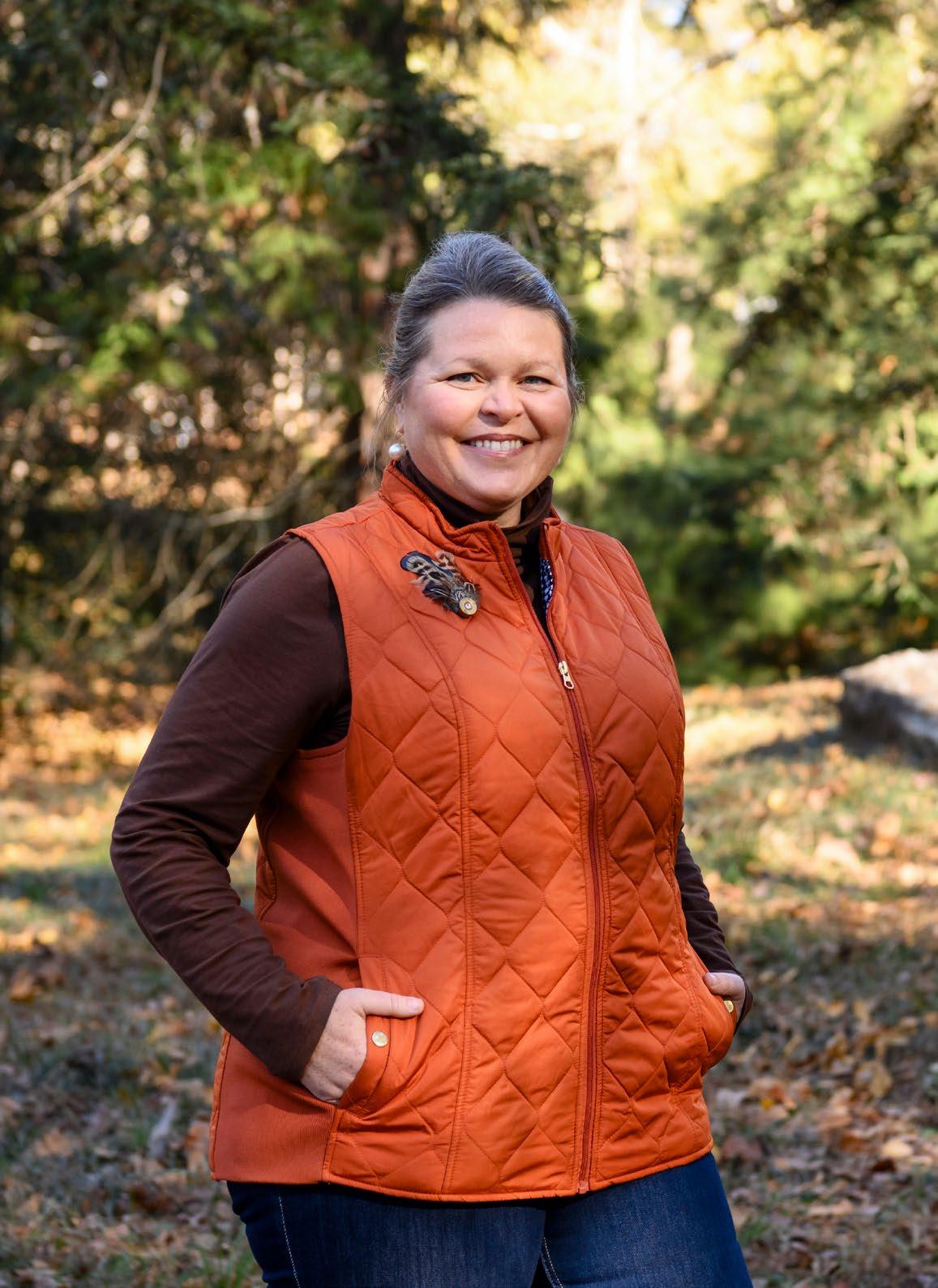
“You can’t foresee the future, but you’re trying to do the best job you can to help the people today and those coming after you.”
AI practices. Her approach went beyond mere technical compatibility; she prioritized identifying vendors with the highest integrity to foster a long-term working relationship between the parties.
“The state procurement office has a variety of tools and services we [state agencies] have access to, because these types of contracts for products and services can be difficult to negotiate sometimes,” she explains. “Outside counsel often has the manpower and technical expertise to help,” but procurements, such as selecting an ERP system, are complex and filled with risk analysis and business considerations unique to Clemson that factor into negotiations.
“I need to explain the culture at Clemson and where our pressure points are. Price is important, but also timely and innovative service to help Clemson best manage its diverse operations.”
When not in the office, Crocker stays connected to her original love: animals. She has competed in the prestigious Westminster Dog Show with her Boykin Spaniels, the South Carolina state dog. She currently has six Boykin spaniels among her eight pets.
“It is a little brown dog created by South Carolinians to be hunting and family companion dogs,” she explains. “You can train them to do anything—to hunt deer, turkey, birds, or obedience, agility, dock diving, and so much more. I have been blessed to be invited to Westminster the last five years based on qualifying points throughout the year.” She goes to an average of two competitions a month (either show or field events) and trains her dogs throughout the week. “It is my favorite hobby and a great break from work,” Crocker says.
Crocker is also looking forward to Clemson’s upcoming vet school. She’ll do her part to help the program get up and running for its expected first class in fall 2026.
“In the year ahead, I’ll also continue to support my ag guys with their goals of helping farmers in South Carolina to be as productive as they can be,” she enthuses. “Agriculture is the number one industry in the state, and we’re proud to play a role in educating, conducting research, and providing regulatory services for those farmers.”

Committed to excellence in client service and our profession
Tireless advocacy, business sense, and working side by side with clients toward the same goals – that is the character of who we are. A full-service law firm with a national footprint, we provide corporate, litigation, intellectual property, and government relations services to clients including Fortune 500 companies, private equity and venture funds, portfolio companies, and emerging growth companies and start-ups. Nelson Mullins is a leader within the profession, and we are committed to serving the public welfare.

Erica McKinney reflects on the importance of becoming a mentor as she continues to rise at McDonald’s
By Will Grant
ERICA MCKINNEY’S PATH BEGAN WITH a childhood dream of becoming a lawyer.
She doubled down on her aspiration in college by securing prestigious and highly competitive clerkships and internships. She was a White House intern during the Obama administration, a judicial intern for the United States District Court of Maryland, a legal intern for the governmental affairs division of the American Bar Association, a judicial law clerk for the Superior Court of the Washington, DC, and a judicial law clerk for the District of South Carolina.
How did she achieve so much?
McKinney knew where to start. She enrolled in programs that could widen her perspective at places like the
Charles Hamilton Houston Pre-Law Institute, designed to provide guidance to first-generation and diverse law students preparing for a legal career.
“That program was life-changing for me,” McKinney says. “It unveiled some of the mystery behind what law school would look like and what I should expect. And that’s where I met Judge Simmons.”
Simmons, a mentor of McKinney’s, gave her sage advice to map out her own goals and pursue those prestigious clerkships.
It was on the guidance of people like Simmons, as well as professional colleagues and other judges McKinney studied under, that the lawyer was able to gain valuable insight and build up her
career. This is also what inspired her to provide the same kind of example for the next generation of legal professionals.
She’s mentored alumni from her undergraduate alma mater, the University of Illinois; fellow members of the National Employment Law Council; and numerous young attorneys looking to follow in her footsteps.
Now working in-house as McDonald’s senior employment and litigation counsel, McKinney has found the perfect place to engage in mentorship efforts, both informally and through the internship program, which she now owns.
“McDonald’s is a place where I constantly feel supported and where I’m allowed to grow,” the senior counsel says. “I know that I wouldn’t truly be
“I know that I wouldn’t truly be me if I didn’t put energy into mentoring others, because I know the kind of difference it can make.”
Proskauer
congratulates Erica McKinney Senior Counsel, Employment Litigation Practice Group at McDonald’s Corporation on her recognition in Modern Counsel
me if I didn’t put energy into mentoring others, because I know the kind of difference it can make.”
Heading up the internship program at McDonald’s is also a smart business move. It’s a way to provide valuable experiences to future lawyers who may wind up under the golden arches themselves someday.
And even if they don’t, they will have strong positive memories of an organization that clearly cares about nurturing diverse and engaged legal minds.
The legal team at McDonald’s, which stands out for its diversity and strong female representation, is still incredibly rare, as are female lawyers of color like McKinney. McKinney urges younger attorneys to seek out roles that celebrate their diversity.
“Sometimes you have to take introductory roles. That is true of so many lawyers of color,” the legal counsel says. “Continue to build a strong community of people around you that support you outside of your organization. It can feel very isolating at times, so tap back into those communities that put you more at ease.
“But as your career continues,” she says, “look for organizations where your perspective matters so that you can confidently step into those spaces with the knowledge that you belong there.”

Proskauer is a leading law firm, providing a wide range of legal services to clients worldwide. To learn more about the firm, visit Proskauer.com
Gus Makris reflects on auditors, private practice, and helping Dow continue to grow through sustainability energy initiatives
By Billy Yost
GUS MAKRIS IS SENIOR MANAGING COUNSEL and head of the Office of Tax Counsel at Dow. From overseeing the company’s global tax planning, to leading the tax and structuring aspects of its mergers, acquisitions, and other transactions, to playing a role in Dow’s tax controversies and audits—if it’s tax related, it comes across Makris’s desk.
And given that his employer is the Dow, the country’s largest chemical and plastics producer, Makris has his work cut out for him. He represents a company that had 2023 annual sales of $45 billion and operates in an industry that’s always front and center for regulators.
Tell Them What You’re Going to Do, Then Do It
Despite the high stakes of his job, Makris is remarkably calm. During our conversation, the tax attorney
often spoke in metaphors—the sign of a true “legal translator” who has figured out the best way to break down complex tax law for laypeople—and maintains the demeanor of someone who has seen it all several times over.
The attorney spent six years in private practice before going in-house at Turner Broadcasting in 2012. He spent seven years there before moving back to his home state of Michigan in 2020 and joining Dow.
When it comes to working with auditors, his approach isn’t based on cunning or intrigue.
“Like any other major company, we are constantly under audit around the world,” Makris explains. “My approach is to be direct and honest. That may seem obvious, but the point is to recognize that you may meet with auditors who have been misled in the past, and before they listen to what you have to say, they’re
“One of the most important things I learned early in my career was what it meant to do an excellent job. You have to know what you’re aiming at before you can hit it, and I was fortunate to work with great lawyers who helped direct my aim.”
going to decide whether they can rely on what you say. So, establishing an honest and direct line of communication is paramount.”
Makris ensures that not only he but also the rest of his team abides by this rule of transparent, straightforward behavior. The minute someone thinks you’re trying to pull the wool over their eyes, things can spin quickly out of control.
“There is little point in being coy, and so I generally just tell the auditor what I’m going to do and then I do it,” Makris says simply. “Obviously we look to resolve audits quickly and efficiently, but if we have a fundamental disagreement and we can’t resolve it, then I just tell the auditor that we will appeal and we go from there. It doesn’t make sense for us not to be clear about what we’ve done and how we intend to proceed.”
Makris began his career at Cravath, Swaine & Moore in New York. When asked to reflect on any early lessons, he pauses before saying that while law school teaches you to think like a lawyer, it is private practice that teaches you to be a lawyer.
“One of the most important things I learned early in my career was what it meant to do an excellent job,” Makris says. “You have to know what you’re aiming at before you can hit it, and I was fortunate to work with great lawyers who helped direct my aim.”

Gus Makris Senior Managing Counsel Dow Inc.
King & Spalding congratulates Gus Makris on his welldeserved recognition by Modern Counsel for his leadership at Dow.
“There is little point in being coy, and so I generally just tell the auditor what I’m going to do and then I do it.”
Makris says he also learned the importance of an ownership mentality. “Starting your first real job is intimidating, and why wouldn’t it be? You don’t know what you’re doing yet. I thought I was there to support the more senior lawyers and it took a few months to realize that I was there to jump into everything, to learn and know and be responsible for all the details. That’s when you can start running.”
When Makris went in-house at Turner, he had another chance for a novel education. Suddenly, the tax attorney had to learn accounting. “You can understand a business or a transaction without understanding accounting, just as you can understand how to cut hair without speaking Spanish,” Makris explains, setting up another metaphor. “But if you are going to be an effective barber in Spain,
you need to speak Spanish. And if you are going to be an effective counsel in business, you need to understand the common tongue, which is accounting. At Turner, I was fortunate to learn from some great ‘bilingual’ attorneys.”
The Chance to Lead
At Dow, Makris is also learning the language of sustainability, thanks to the company’s increased investment in sustainable energy practices. One of Dow’s most ambitious projects is a $6.5 billion net-zero ethylene cracker and polyethylene complex in Fort Saskatchewan, Alberta. It will be the world’s first net-zero emissions integrated ethylene cracker and derivatives site.
“Dow is a leader on this front and that’s exciting,” Makris says. “Our plan continues to be ‘Decarbonize and Grow.’ It takes a lot of energy to create our products, and so it is exciting to be at a company that is a leader on both sustainability and growth. In an environment where both customers and regulators expect more, we are at the head of the pack, and we are moving forward. I’m proud to be part of the team.”
& Spalding:
David Modzeleski leads with a “one team” approach at media giant Warner Bros. Discovery
By Keith Loria
AS
SENIOR VICE PRESIDENT
OF LEGAL AND head of global intellectual property (IP) at Warner Bros. Discovery, David Modzeleski leads a global team of fifty IP professionals with a remit that includes managing trademark, copyright, patent, antipiracy, and IP policy matters for the entirety of the business. His team operates with a key goal in mind: to protect the company’s iconic intellectual property assets.
That portfolio includes some of the most noteworthy brands in entertainment, including DC Comics (Superman and Batman), Warner Bros. films and TV, Harry Potter, HBO, Looney Tunes, CNN, Turner, and Discovery, to name just a few.
Though Modzeleski had an inkling he might pursue law, intellectual property wasn’t initially on his radar. “As a child, I don’t think I really understood what being a lawyer was,” he says. “We had a few fam-
“Over half of my team is devoted to trademark and brand protection matters,” he explains. “We have over 65,000 active trademarks worldwide, not to mention an active global brand protection strategy. As you can imagine, we do a lot, both offensively and defensively, to manage a portfolio of that size. It’s a lot of work, but also a lot of fun.”
ily friends who were successful lawyers and seemed to enjoy what they did. That was my first exposure, and it did spark my interest.”
As he learned more about different types of law and understood that not all lawyers ran into the courtroom to try cases like TV lawyers, he set law as his goal. Still, upon graduating college with a liberal arts degree, he deferred going to law school for a couple of years to make sure it was what he wanted to do. In the meantime, he took a job at a Big 5 accounting firm doing management consulting.
“While I enjoyed it and learned a ton, I didn’t enjoy it enough to change my initial plan,” he recounts. “I went to law school and had a pretty traditional career path.”
That path included a summer associateship at a major DC firm, interning for a federal judge, writing for the law review, clerking in the federal district court in Alexandria, Virginia, and then joining the firm where he had summered as a second-year law student, Arent Fox (now ArentFox Schiff).
“Interestingly, I didn’t have much exposure to IP in law school, or even during my clerkship. I landed in the IP group at the firm because I had a mentor who thought I would be a good fit and there was a need,” Modzeleski recalls. He learned on the job and worked across various trademark portfolios, focusing primarily on brand portfolio management, copyright, and related matters.
“I was lucky to link up with several partners who took an interest in me early on and gave me meaningful devel-
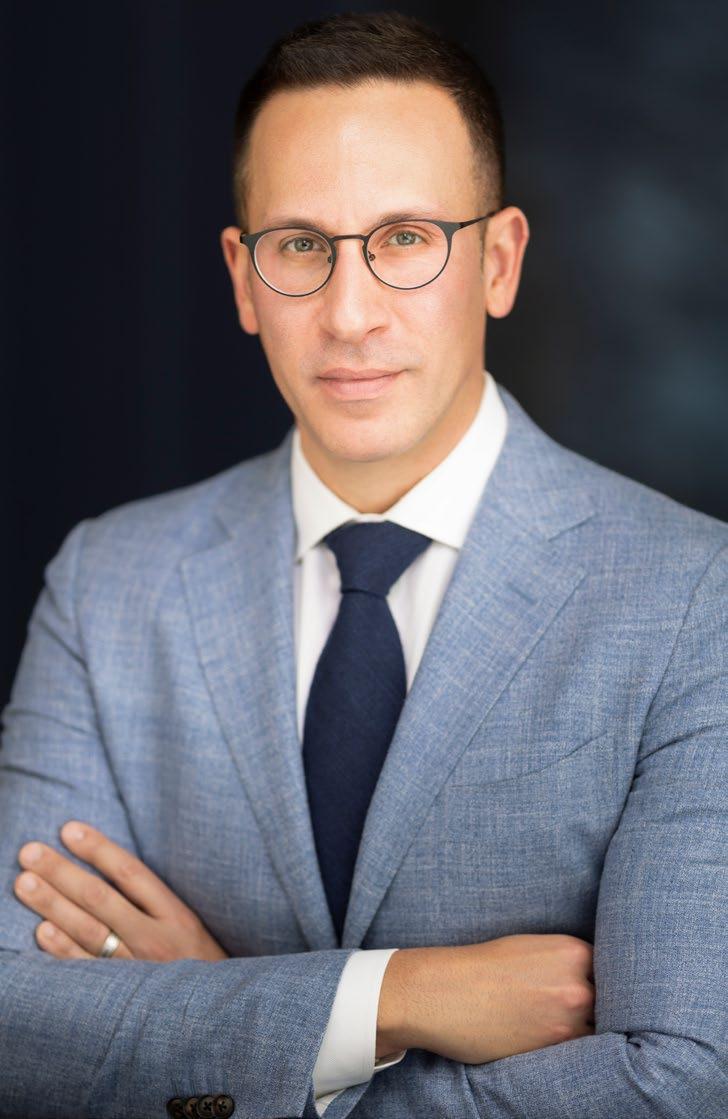
David Modzeleski SVP of Legal and Head of Global IP Warner Bros. Discovery

opment opportunities. And I quickly established strong relationships with several firm clients, which made my practice very enjoyable. I acted as de facto in-house counsel for these clients in many respects,” he says.
After almost eight years, Modzeleski transitioned in-house to Discovery in 2012 to lead its IP group. “This was a unique opportunity to go to a company I admired and work across IP issues in an industry that was exciting to me: media and entertainment,” he shares. “It was something I couldn’t pass up.”
Modzeleski’s initial responsibilities included trademark, copyright, patent, and antipiracy matters. But his media and entertainment career grew as the company changed over the next dozen years. By 2018, after Discovery merged with Scripps, he began leading the global litigation function for the company.
Fast-forward to 2022, when Discovery merged with WarnerMedia to become the media giant Warner Bros. Discovery. “I was fortunate to work on the deal team, supporting it not only from an IP perspective but also running point on various separation planning activities
“I think my team would describe me as supportive and someone who views their success, both individually and collectively, as my success.”
“We have over 65,000 active trademarks worldwide, not to mention an active global brand protection strategy. As you can imagine, we do a lot, both offensively and defensively, to manage a portfolio of that size.”
related to the transaction, Modzeleski says. In 2023, he was tapped to lead the newly integrated global IP department.
Today, Modzeleski is responsible for managing one of the most iconic IP portfolios in media and entertainment and leading a team of experts across trademark, copyright, patent, and related disciplines. He handles any number of IP matters on a given day related to these areas, not to mention issues involving content protection, antipiracy, and IP policy.
Emerging technologies like artificial intelligence (AI) are also top of mind for him and his team. “As you can imagine, we are spending a lot of time on AI and supporting the business on these issues from an IP perspective.”
Modzeleski truly values the team he has built in his current role. “I think my team would describe me as supportive and someone who views their success, both individually and collectively, as my success,” he offers. “I try to give them the tools and support to succeed in their respective roles, and it is very rewarding to see their achievements.”
Fross Zelnick:
“In addition to being an excellent lawyer, David is direct, decisive, and practical, which is everything an outside lawyer can hope to have in an in-house client relationship.”
—James Weinberger, Partner
Gibson, Dunn & Crutcher:
“David brings together the right mix of substantive legal skills and practical common sense to see issues on the horizon and implement solutions to protect some of the most valuable IP in the media and entertainment world.”
—Howard S. Hogan, Partner
ArentFox Schiff:
“David’s innovative approach to navigating complex and nuanced issues makes him one of the most creative business and legal minds in the media and entertainment industry.”
—Anthony Lupo, Chairman



Coca-Cola is busy preparing for its partnership with the 2026 World Cup, but it hasn’t lost sight of something other organizations are turning their backs on: a commitment to DEI
By Will Grant
WHEN THE US SUPREME COURT struck down affirmative action in higher education in 2023, the burgeoning diversity, equity, and inclusion (DEI) space sustained a major blow. While high-profile companies like Ford Motor, Lowe’s, and Google have scaled back or entirely ended DEI initiatives, the Coca-Cola Company is standing behind its commitment to promoting diverse voices and creating equitable and inclusive environments for its employees and communities.
“Diversity, equity, and inclusion are at the heart of our values and our growth strategy and play an important part in our company’s success,” Coca-Cola’s diversity and inclusion website leads off as of April 2025. “We leverage the remarkable diversity of people across the world to achieve our purpose of refreshing the world and making a difference. Our aspiration is not only to mirror the diversity of the communities where we operate, but also to lead and advocate for a better shared future.”
Coca-Cola’s DEI initiatives are centered around three pillars: creating a workforce that mirrors the markets it serves, enabling inclusive culture where employees thrive, and advancing equity within its business, communities, and marketplace.
With that goal in mind, Coca-Cola has created a variety of inclusion networks to help minorities connect with each other and allies. In the US, Coca-Cola boasts an Asian Pacific, Black Employee, Hispanic + Leadership, KO-GEN, LGBTQ+ & Allies, Military Veterans, This-Ability, and Women’s Inclusion networks along with a whole host of business forums that provide networking, volunteer, and professional development opportunities focused on select skill sets and industries.
Coca-Cola’s focus on embracing diversity will be on full display in 2026 when the US plays host (along with Mexico and Canada) to the FIFA World Cup. Coca-Cola, an official sponsor of the 2026 World Cup, is one of FIFA’s longest-standing corporate partners with a formal association that dates to 1974.
Since 2006, Coca-Cola has sponsored the FIFA World Cup Trophy Tour, which has allowed millions of people the opportunity to see the actual cup in “World Cup” up close and personal. The tour is also an
ideal way to help activate fans, both new and old, and build excitement for the upcoming World Cup tournament.
From 2019 to 2022, FIFA revenue reached a record $7.57 billion, despite the COVID-19 pandemic. While television rights were the highest source of income, marketing rights with partners like CocaCola, Adidas, and others have helped the sport truly become an iconic world event.
The company also landed a long-term partnership agreement with the US Soccer Federation to “support the sport’s growth across all levels by using the reach and relevance of its brands to build participation, champion player development, promote inclusion, and engage fans,” according to a 2023 Coca-Cola press release.
“We’re incredibly excited to have Coca- Cola North America join US, Soccer and there’s no better time for us to embark on this long-term strategic partnership,” US Soccer President Cindy Parlow Cone said in the release. “This is a pivotal time for soccer in our country, and we have a massive opportunity to realize exponential growth in the United States in the coming years.
Coca- Cola’s global impact on the sport is undeniable, and having an iconic brand with us on our journey during this unique moment in time will be game-changing.”
The partnership with the US Soccer Federation includes the creation of legacy events that will create opportunities
for US Youth National teams as well as Extended National Teams throughout the country.
Aiding Coca-Cola’s commitment to DEI along with its marketing efforts is general counsel for Canada and USA North as well as head of legal for North America, Scott Kirkpatrick. Kirkpatrick, a baseball coach in his spare time, is no stranger to the sporting world. He’s also garnered recognition as a Legal 500 GC Powerlist honoree and 2015 Canada “Rising Star: Leading Lawyers Under 40” feature. For nearly fourteen years, the lawyer has headed up senior legal counsel duties at Coca-Cola, earning two promotions including his current role.
The generalist has expanded his purview through the decade and will now be a legal lead for one of the most high-profile ad campaigns anywhere on earth.
Scott Kirkpatrick, General Counsel and Executive Vice President (Canada and USA North) at CocaCola Ltd.
Driving change, guiding decisions and shaping strategy: Scott Kirkpatrick continues to raise the bar for today’s legal leaders. Gowling WLG is privileged to call Scott a client and an alumnus, and we’re proud to support his ongoing success.

“Scott
—Lori
Bennett Jones is proud to recognize Scott Kirkpatrick for his exemplary leadership and achievements as General Counsel and EVP at Coca-Cola. Congratulations on this well-deserved feature.
Lisa Haidostian details the fascinating work that’s accompanied major changes at Walgreens
By Billy Yost
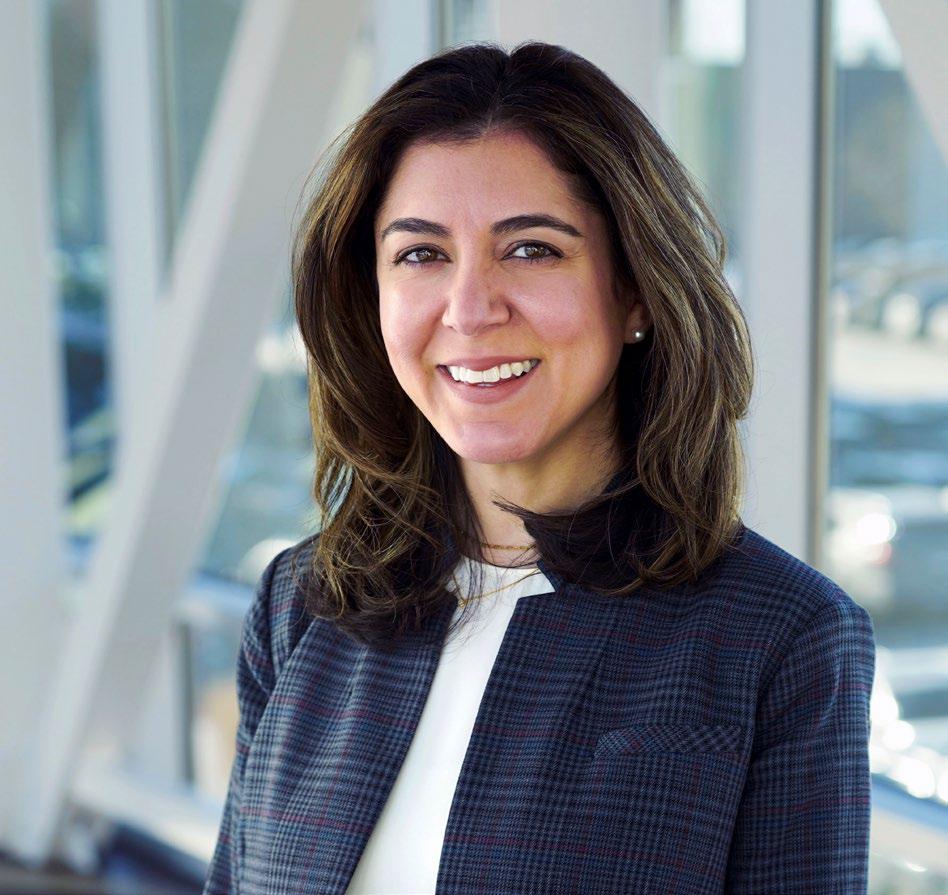
Lisa Haidostian Senior Director and Managing Counsel of Commercial & Securities Litigation Walgreens
WALGREENS IS IN THE MIDDLE OF A massive turnaround. The pharmacy chain plans to close up to 1,200 stores and announced in early 2025 that it has agreed to be taken private after almost one hundred years as a public company. But analysts are hopeful this big move could help mark the beginning of a recovery for one of the best-known names in pharmacy.
A turnaround isn’t easy. But it has been a learning experience unlike any
“I still have a very demanding job, but most nights I’m not staying up past midnight preparing for a deposition. My husband and I are trying to model a balanced life for our kids: two parents committed to their careers but also fully invested in their family.”
other for Lisa Haidostian, senior director and managing counsel for commercial and securities litigation at Walgreens. Haidostian came in-house in 2021 after nearly a decade at Chicago-founded firm McDermott Will & Emery.
“There’s no doubt that a turnaround environment can be challenging, but I’ve tried to find opportunities,” Haidostian explains. “There are chances to stretch yourself and further your development in ways that might not have been available otherwise.”
Haidostian says she focuses on the aspects of her job that she can control. She loves her work, genuinely enjoys being around her coworkers, and she has faith in the direction her company is headed. She believes she has the dream job for her, focusing on litigation strategy and big picture issues.
The attorney has also had the opportunity to expand her own practice. A year into her in-house role, Haidostian was asked to manage compliance for Walgreens’ US healthcare segment, a wholly new experience for her. She eventually returned to her litigation practice, but says the detour was a good chance to develop different legal muscles.
“I was excited about the opportunity,” the attorney explains. “I learned some important lessons about working proactively with a compliance team to anticipate issues and try to head them off before they become actual problems. We work with our compliance group early and often to anticipate or mitigate potential problems before they bubble up.”
And while returning to high-stakes litigation was the right move for Haidostian, the attorney says going in-house
gave her the opportunity to focus on a bigger picture for her entire life, not just her career.
Haidostian went in-house, in part, to have a better handle on work-life balance. The attorney and her commercial litigator husband have two children, currently four and six. After nine years at a law firm, Haidostian was ready for a different approach.
“I still have a very demanding job, but most nights I’m not staying up past midnight preparing for a deposition,” the attorney says, laughing. “My husband and I are trying to model a balanced life for our kids: two parents committed to their careers but also fully invested in their family.”
Today, the attorney says she’s proud of the life she and her husband have created for their children in the heart of Chicago. When Haidostian is home with her family, she’s present. The inherent demands of supporting a major company and indulging her husband’s interest in discussing even the more mundane aspects of litigation mean she rarely escapes the law completely. But the couple manages to balance their work talk with enjoying their lives with their children.
Additionally, Haidostian has stayed connected to the pro bono work she engaged in previously. The senior director started working with the National Immigrant Justice Center (NIJC) while at McDermott, eventually joining the organization’s board. When she came to Walgreens, she made it clear that it was important for her to continue working on asylum and other immigration-related cases.
“Walgreens has been very supportive of me continuing that work,” Haidostian says. “Our NIJC clients have usually been through incredible hardships and are just trying to create the best lives for themselves and their families. I’m grateful to be able to help them.”
Haidostian encourages other in-house lawyers to find ways to keep doing pro bono work. She positioned her request internally as a way to build more engaged relationships with outside counsel as well as being the right thing to do.
“Most companies want to do the right thing,” Haidostian says. “They want to give back, and it creates good development opportunities for their in-house lawyers. It’s a win-win for everybody.”















It was a record at the time: 315 million downloads in three months. The app saw its US unique visitor count spike by nearly 50 percent in the same period. The impressive growth came as isolated Americans looked for a way to cope with the stress wrought by COVID-19 lockdowns. Where did most turn to? It wasn’t Netflix, Zoom, Snapchat, YouTube, or Twitter. Most sought entertainment, relief, distraction, and connection on a four-year-old short-form video platform called TikTok.
The events caught the attention of Catherine Razzano, a veteran in-house lawyer and compliance expert. At the time, she was leading compliance improvements for Panasonic Avionics Corporation while the company was under a deferred prosecution agreement for Foreign Corrupt Practices Act violations. Having always had an interest in the tech sector, Razzano downloaded TikTok and started learning more about both the platform and its competitors.
Two years later, Razzano received a phone call from a recruiter. A tech company known as ByteDance was looking for a leader to build the legal compliance func-
By Zach Baliva



RAZZANO Former Head of Global Legal Compliance
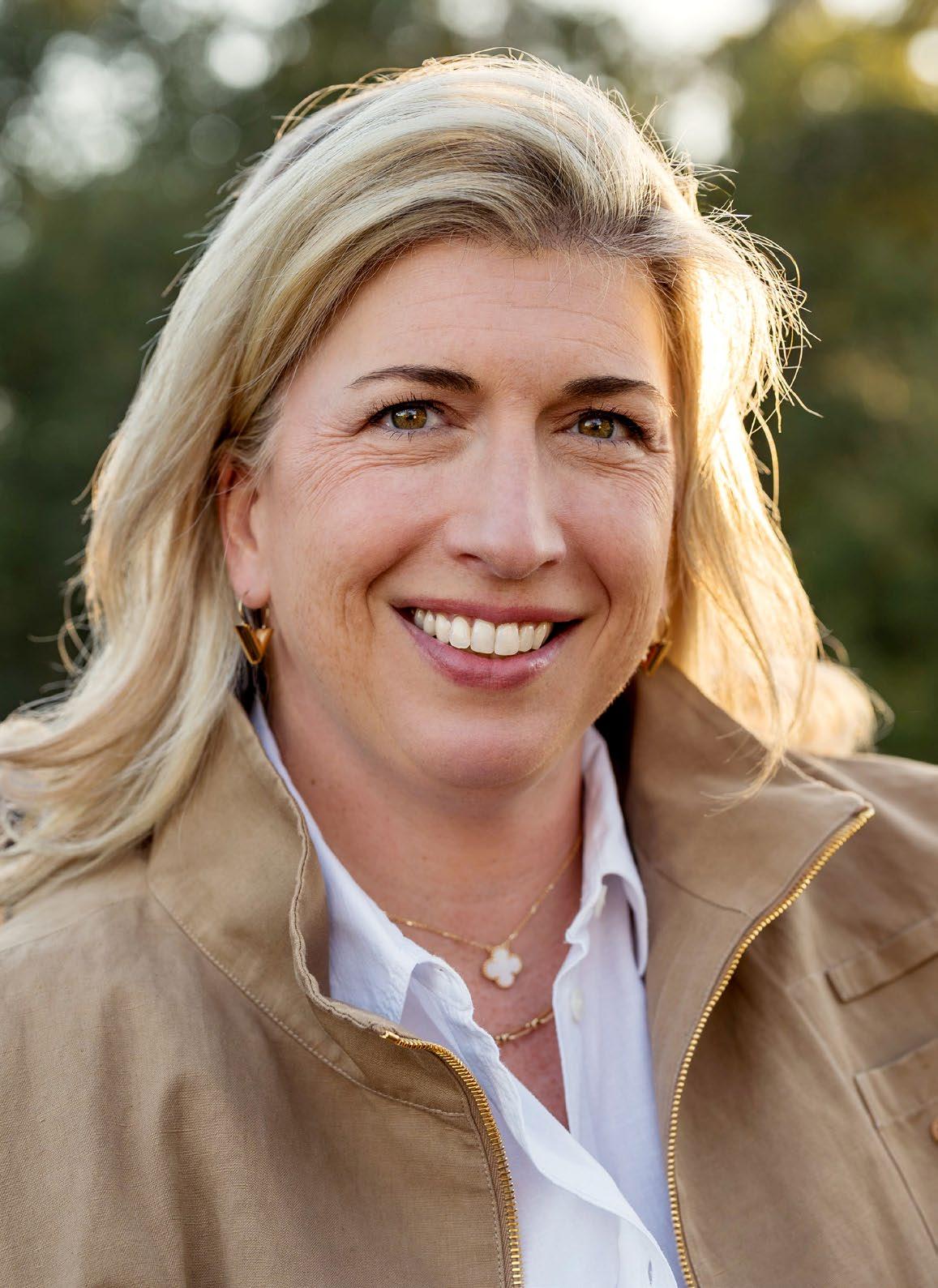
tion, with a focus on global antibribery and anticorruption compliance controls, for its most popular app: TikTok.
Razzano, whose previous work was mostly in the manufacturing and defense sectors, was looking for a change. “I knew that TikTok was still going through a huge growth curve,” she says. “I was interested in getting more directly into the tech industry, and TikTok seemed like a great fit.”
Research confirmed her hunch. As Razzano tapped into her professional network for input and advice, she heard good things about the company and its legal leaders. Friends and colleagues shared her excitement about the potential of working for a large startup with unicorn status and seemingly limitless potential to chart a successful path forward.
But what excited Razzano most was the chance to build a large, best-in-class compliance team for a high-growth company looking to go public. “I knew there would be investment, resources, and support for me to build a strong center of excellence,” Razzano says.
No one could have predicted the triumphs and challenges at TikTok that would affect Razzano in her new role. Three months after she joined, TikTok overtook Instagram and became the world’s most downloaded app. Then came allegations about privacy violations and public safety concerns from agencies like the FBI.
Lawmakers summoned the company’s CEO to Capitol Hill. Later, they passed a bill requiring the sale or ban of the app by early 2025. ByteDance is challenging the law.
Moving into a new sector and getting more fully equipped to lead global legal compliance at a fast-paced, highly scrutinized multinational tech company required Razzano to lean on everything she had experienced in the earlier stages of her life and career.
Razzano was born into a family of lawyers. Her dad, brother, uncle, and cousins are all in what she jokingly refers to as “the family business.” Hearing family members discuss legal issues around the dinner table and visiting her father in court as a young child gave Razzano a front-row seat to a day in the life of an attorney.
While her dad bragged about attending Georgetown, she chose the Catholic University of America’s Columbus School of Law in Washington, DC. Razzano interned for the United States Court of Appeals for the Federal Circuit while in law school and later
clerked for the Honorable John M. Facciola in the United States District Court for the District of Columbia.
After clerking, like many young lawyers, Razzano entered private practice as an associate in the complex litigation and dispute resolution group at Clifford Chance US LLP and then as part of the business fraud group at Cadwalader, Wickersham & Taft LLP. Ultimately, Razzano wanted to be as close to her client as possible, so she decided to go in-house at General Dynamics Corporation in 2010 as assistant general counsel and director. She later joined Pana-

sonic Avionics in 2018 as vice president and chief ethics and compliance officer.
Razzano has stacked up accomplishments and experienced many milestones during this time. She played a senior role in a high-profile FCPA matter for a defense contractor and quickly rose from junior associate to senior counsel. Along the way, Razzano built a reputation for her litigation skills and growing subject matter expertise in business fraud and the Foreign Corrupt Practices Act.
At General Dynamics, she oversaw the company’s anticorruption compliance program, trade compliance program, internal compliance audits, and led domestic lobbying and regulatory compliance. She then rebuilt Panasonic Aviation's ethics and compliance program while under a DOJ monitorship.
After leaving the partner track at Cadwalader to go in-house, Razzano became interested in sharing her experience to mentor and help younger female lawyers. “Other women poured into me, and I wanted to do the same for those just starting out,” she says. “By sharing my good and bad experiences authentically, I hope to demonstrate how others can build and shape the career that’s right for them.” Razzano resolved to look for formal and informal opportunities to provide mentorship, which she still does today.
Assuming her role as head of global legal compliance, Razzano built a compliance function anchored by centers of excellence that address specific areas, including antibribery, anticorruption, trade controls, sanctions, antimoney laundering, payments compliance, and ESG compliance. Her department also supports TikTok’s investigations and ethics teams. A network of regional compliance officers in
“OTHER WOMEN POURED INTO ME, AND I WANTED TO DO THE SAME FOR THOSE JUST STARTING OUT. BY SHARING MY GOOD AND BAD EXPERIENCES AUTHENTICALLY, I HOPE TO DEMONSTRATE HOW OTHERS CAN BUILD AND SHAPE THE CAREER THAT’S RIGHT FOR THEM.”
“I KNEW THAT TIKTOK WAS STILL GOING THROUGH A HUGE GROWTH CURVE. I WAS INTERESTED IN GETTING MORE DIRECTLY INTO THE TECH INDUSTRY, AND TIKTOK SEEMED LIKE A GREAT FIT.”
TikTok’s largest markets helps her unite and manage all compliance activities worldwide. The company now has close to forty global legal compliance lawyers in a total of six countries.
With elections, global conflicts, technology shifts, labor shortages, rising inflation, and unpredictable user behavior, 2025 brings a lot of uncertainty for a company like TikTok. Razzano’s leadership has given the company a global compliance framework that strives to keep pace with its rapid growth and respond to the volatile current landscape.
Editor’s note: At time of press, Catherine Razzano is now global ethics and compliance leader at Palo Alto Networks.
Steptoe LLP: “Congratulations to Catherine Razzano on her profile in Modern Counsel. We are proud to work with Catherine and the legal and compliance team in representing TikTok.”
—Ali Burney, Partner, Investigations and White-Collar Defense

Steptoe’s Investigations and White-Collar Criminal Defense practice is renowned for defending individuals and companies in the nation’s highest-profile criminal prosecutions and investigations. Leveraging our extensive trial experience, strategic insights, and creative problem-solving, our team regularly takes tough criminal cases to court and has a track record of success.


Bill Burtis integrates compliance into Juniper’s DNA, building trust, fostering innovation, and giving the business a competitive advantage

By Frank DiMaria
BILL BURTIS Chief Compliance Officer, VP, and Deputy General Counsel Juniper Networks




The ancient practice of tenkara—a fly-fishing technique originating in the mountains of Japan that strips angling down to its simplest form—has taught Bill Burtis patience, focus, and mindfulness, virtues useful as Juniper Networks’ chief compliance officer.
“[Tenkara] is not merely casting the line into the water to see what you might catch. It requires strategic thinking, considering the type of fly, reading water conditions, and the approach. These same skills directly apply to my professional life,” Burtis says. “In my role, it is important to maintain composure, read the environment, make strategic decisions, and execute them effectively.”
Since his arrival at Juniper, whose customers include the top one hundred global service providers and thirty thousand enterprises, Burtis has been on a nine-year mission to transform compliance into a strategic asset.
“My goal is to rewrite the narrative on corporate compliance—moving it from a perceived necessary burden to a business-enabling function,” Burtis asserts. “Once people’s perception of compliance changes, organizations can integrate it into their business strategy and goals, driving innovation.”
According to Burtis, compliance programs should be strategically embedded as growth enablers rather than dismissed as obstacles. “Compliance builds a solid foundation for long-term success. When integrated into a company’s DNA and culture, compliance fosters trust and provides a competitive advantage.”
“In today’s market, high-trust organizations are a differentiator,” Burtis emphasizes. “Every customer seeks to partner with someone they can trust. Compliance is fundamental to the vision.”
Breaking down compliance misperceptions helps employees and leadership work together to create transparent spaces where employees feel safe stepping forward with issues. By valuing employees’ opinions and encouraging a strong speak-up culture, compliance becomes a catalyst for innovation across the product line. The result: building a better business.
If compliance doesn’t partner with the business, then “you’re never going to be part of the conversation, and valuable insights and opportunities to drive a culture of compliance will be missed,” Burtis says.
Burtis leads a team of over twenty-five compliance professionals scattered across the globe, holding that team up as a compliance model. “If we don’t get it right, no one else will,” he says. “We lead by example.”
With more than eleven thousand employees worldwide, one of Burtis’s biggest challenges is ensuring that HQ messaging resonates with those in the field. Burtis uses his creativity and marketing skills—and carefully considers cultural components and diversity—to meet people where they are.
“We spend a lot of time focusing on compliance communications and training to make sure the messaging is relevant, on point, and personalized where we can,” Burtis says. He provides information in bite-size micro learnings to ensure his compliance efforts are responsive to employees' specific needs globally.
“We’re trying to make things digestible and accessible,” Burtis says. To ensure his compliance program is scalable, adaptable, and relevant, he often relies on senior-level individuals at Juniper who have a history with the company and deep regional expertise.
As the leader of Juniper’s Integrity & Compliance Group, Burtis cultivates an environment of transparency, trust, and accountability, focused above all on impact while connecting each team member to the broader mission. While his employees seek his guidance and support, they own their projects.
“I believe in this culture of support and challenge. Constantly pushing the team to take ownership,” Burtis says. “But I also challenge them by asking, ‘Is this the best we can do?’”
In 2023, Compliance Week named Burtis its CCO of the Year, an honor based on input from former and current colleagues, vendors, internal and external clients, and stakeholders. Although a personal triumph, the award recognized his team's collective work in transforming Juniper’s compliance program.
“I was honored to see the evolution of the team and how we’ve come together,” Burtis says. “It’s a recognition of the people around me believing I’ve had some positive impact on them.”
















Sideman & Bancroft:
“I have worked with Bill for many years, seeing up close his vision, drive, and creative thinking that produces exceptional results. Bill is the rare great lawyer who is also a good person.”
—Richard Nelson, Partner
True Pedigree:
“It has been a privilege to partner with Bill and his team at Juniper in taking a data-driven approach, leveraging Juniper’s supply chain data, to proactively address gray market. Bill’s innovative and visionary leadership in scaling an effective and efficient sales channel compliance program through use of data and technology has set a gold standard in this space.”
—Shelley Raina, Cofounder and CEO













Sarah Decker champions a safer digital world with purpose and passion at McAfee


By Keith Loria


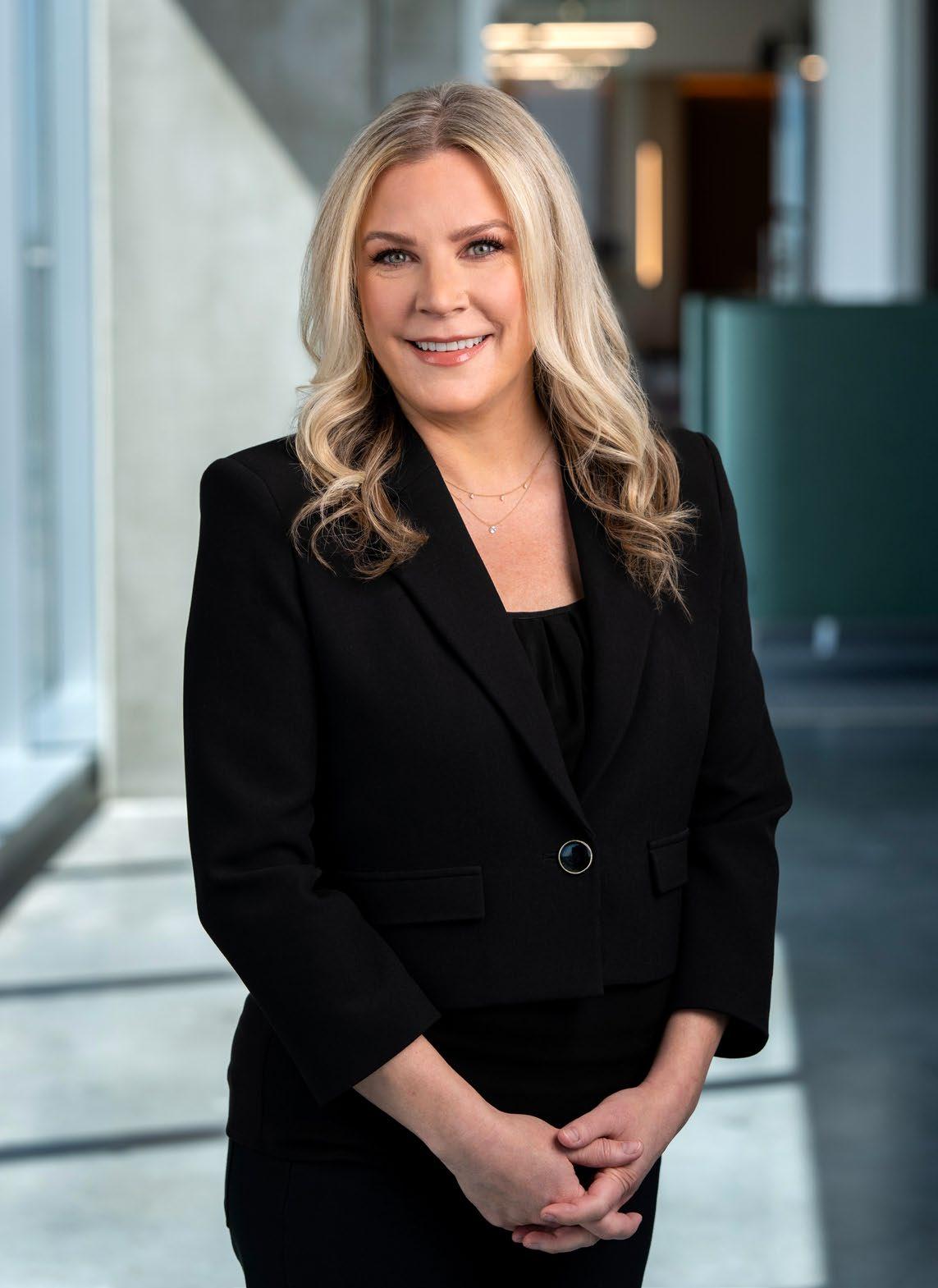
In the vast, dynamic realm of the internet, where opportunities and risks often seem to grow in tandem, Sarah Decker stands as a steadfast guardian of safety and trust. As the chief legal officer of McAfee, a global innovator in software security, Decker isn’t just practicing law—she’s shaping a safer digital future for millions. And she’s doing it with a sense of purpose that’s as personal as it is professional.
“I love working at a company that has a noble mission,” Decker shares, her passion evident in every word. “Keeping people safe online is one of the most important things we can do these days. We live our lives digitally, so everything we do here is geared toward protecting our customers’ entire digital lives.”
Decker’s journey to this pivotal role is as inspiring as her work. Raised on a family farm in rural central Illinois, she dreamed of a life beyond the fields. She was the first in her family to attend a four-year university, earning her degree from Arizona State University. Though journalism initially sparked her interest, Decker soon realized her calling lay in the law, enrolling at SMU’s Dedman School of Law.
During her time there, she interned with Judge Barbara M.G. Lynn, whom she describes as an inspiration. Decker reflects on her time with Judge Lynn, that “she showed me what it means to lead with strength and integrity.”
After graduating in 2006, Decker cut her teeth in the high-pressure world of complex commercial litigation at Weil, Gotshal & Manges LLP. The financial crisis of 2008 thrust her into high-profile cases, including the Lehman Brothers and General Motors bankruptcies. It was an intense and formative time, giving her invaluable courtroom experience and sharpening her skills under the most challenging circumstances.
Yet Decker felt a pull toward something different— something closer to the heartbeat of innovation. She
transitioned to an in-house role at STMicroelectronics, immersing herself in intellectual property law and falling in love with the fast-paced world of tech. “I understood the importance of IP protections and everything that does for a company and society,” she says.
In 2018, Decker joined McAfee, drawn to the company’s forward-thinking vision and commitment to protecting people in an increasingly digital world. Initially leading the litigation function, she quickly took on more responsibilities, helping McAfee evolve beyond its roots as a traditional antivirus provider.
“McAfee is doing cool things,” Decker says with a smile. “We’re so much more than just the antivirus company of the past. We’re protecting identity, enhancing privacy, and even leveraging generative AI to detect threats like email and text scams as well as deepfake videos.”
Her enthusiasm is infectious as she describes McAfee’s pioneering work with AI. “When you go online now, seeing is no longer believing,” Decker explains. “We’re helping people identify what’s AIgenerated and potentially not real. That’s going to be one of the biggest challenges of our time, and I’m excited to be part of the solution.”
The fast-changing world of online security demands constant vigilance and adaptability, a challenge Decker embraces wholeheartedly. She stays ahead by immersing herself in the latest
“WHEN YOU GO ONLINE NOW, SEEING IS NO LONGER BELIEVING. WE’RE HELPING PEOPLE IDENTIFY WHAT’S AI-GENERATED AND POTENTIALLY NOT REAL. THAT’S GOING TO BE ONE OF THE BIGGEST CHALLENGES OF OUR TIME, AND I’M EXCITED TO BE PART OF THE SOLUTION.”
developments, reading voraciously, and engaging with her colleagues. “Every day brings something new,” she says. “I’m always asking, ‘What’s next? How can we meet the needs of the business and our customers?’”
Beyond the office, Decker finds balance and joy in her personal life. Whether she’s diving into a good book, skiing down slopes, or spending time with horses, she relishes the moments that ground her and recharge her spirit.
But it’s her work at McAfee, protecting people in a world that’s becoming increasingly complex, that gives her the greatest sense of purpose. “I love having a real purpose to help people,” she says. “Helping people stay safe online—that’s meaningful work. Every day, I get to make a little difference.”
From a farm in Illinois to the forefront of digital security, Decker’s journey is a testament to the power of dreaming big, working hard, and staying true to a mission that matters. She’s not just a legal expert—she’s a force for good in a digital world that needs champions like her more than ever.
Sidley Austin LLP:
“Sarah has a deep appreciation for legal strategy and how it impacts the business goals of McAfee. In addition to her ability to resolve existing disputes in a favorable way, Sarah is always looking around the corner to get ahead of any risks that may face McAfee and is a leader who is respected by her team.”
—Yvette Ostolaza, Chair, Sidley Austin Management Committee
Laura Richardson of Agiloft reflects on the evolving general counsel role and what it means to truly be yourself in your role
By Billy Yost
The silos keep coming down. Laura Richardson, general counsel at Agiloft, the leader in data-first contract life-cycle management technology, has spent the last six years of her legal career in-house, with stops at Intel and Osso VR. But at heart she’s an anthropologist, and through that lens she’s examined the shifting nature of the general counsel role through the years.
Richardson has watched as the general counsel role continues to expand and to more closely reflect the original charge of a lawyer: to help resolve conflicts and build relationships. Somewhere along the way, the legal function became more siloed. “The business” and “the lawyers” drew lines and stayed in their lanes, creating the illusion that going in-house was a step down for attorneys. Lawyers frequently believed their work wouldn’t be as valued in-house as in a firm and people considered you more of a cost center than a contributor.

“The idea seemed to be that if you couldn’t cut it at a law firm, you went in-house,” Richardson reflects. “But people have started to realize that’s simply not true, and the in-house path has become a more sought-after one precisely because those siloes have started to come down.”
The Agiloft GC says the traditionally more business-focused leaders and decision-makers have come to greatly value the judgment that legal professionals develop over time. At the same time, lawyers have learned to adapt their messaging for a business audience. They are unlocking synergies that blur the line between the law department and a trusted business advisor.
“As we see those silos coming down, legal leaders become more integrated into the business,” Richardson explains. “They’re being asked to take on more because legal leadership can handle a
wider range [of issues], based upon the knowledge they have of the company, the relationships that matter to the company, and laws and regulations that will impact functions like compliance and HR.”
Richardson also wants to ease the minds of those battling imposter syndrome, whether they’ve just begun their legal journey or are years into their career. When she was presenting at conferences earlier in her career, the future lawyer had to write down exactly what she was saying on note cards, word for word. At Intel, she remembers bombing a presentation in front of VPs, GMs, and a variety of other leaders.
“I was awful, I was nervous, I was stumbling all over the place, and I was sweating,” Richardson says, laughing. “The reason I’m so open about this is because I want to dispel the notion that you either ‘have it’ or you don’t. It’s not true. I kept on failing, but I failed better every time. Then one day, I didn’t fail.


“LAWYERS ARE NATURALLY SKEPTICAL AND PERFECTIONISTS, AND A LOT OF PEOPLE IN OUR FIELD SUFFER FOR THEIR WORK. THEY SUFFER, AND THEY SHOULDN’T HAVE TO.”

“It was the same with negotiations,” she continues. “I used to go home and cry after every single one because of the sheer stress of it. But after reps and reps, it’s just a different world for me.”
But it’s not easy. Richardson spent a lot of years in law firms telling herself the story that she wasn’t cut out for law at all. Her success was a lie. She was fooling her mentors and, despite wanting to do her absolute best, she was never living up to her standards.
“In my first role, a wonderful mentor named Tom Hanrahan told me that the things I saw as weaknesses—my vulnerability, my ability to connect with people, and the heart I put into my work—were what made me great. I wish I would have learned to give myself more grace early in my career. Lawyers are naturally skeptical and perfectionists, and a lot of people in our field suffer for their work. They suffer, and they shouldn’t have to.”

Being a great lawyer and a great business partner doesn’t preclude giving up the parts of you that make you a person, the GC says. Richardson has focused on creating a culture free of sharp elbows, where candor is appreciated, and where mistakes are understood to be a part of growth. The GC knows if she wouldn’t have been allowed to fail, she wouldn’t be where she is today.
“I want people on my team who are interested in psychological safety,” she says. “And I want to create environments that help support that mindset, from the top down to the bottom up.”
Richardson says she spent a great deal of her career giving others power that should have been reserved for herself. The questions she hopes more people will consider are: Have they given up the driver’s seat when it comes to things they truly care about? And what does it take to reclaim that power?
Maybe this is why the GC’s role keeps evolving and expanding. Richardson does the work, and she does it well, but there is so much more she brings to her role than professional excellence. She is redefining what it means to be professionally excellent.


By Billy Yost
It’s a wild time to be Meta. Just ask Associate General Counsel for IP Litigation Kyanna Sabanoglu, who manages some of the most high-profile AI litigation in the world. The cases she handles will likely help write new chapters on the technology’s role in a whole host of different applications. This year, Sabanoglu will head into summary judgment for a massive copyright lawsuit claiming that Meta trained its Llama open-source AI models on thousands of books. It’s one of many suits from creators as ideologically diverse as comedian Sarah Silverman and conservative stalwart Mike Huckabee.
At the same time, Sabanoglu will be defending Meta against a suit from translation company Dialect. Dialect claims that Meta and Salesforce have infringed on five of its patents related to AI assistants.
After years as outside counsel at firms Milbank and Gibson, Dunn & Crutcher, Sabanoglu admits it can sometimes be difficult not to get more involved in the actual litigation. “I remember sitting in my first deposition as an in-house attorney and fighting with myself,” she recalls. “I wanted to be the person asking the questions. But eventually, you learn to trust your amazing outside counsel and focus on the
bigger picture. That’s why I wanted to be an in-house counsel in the first place, and I had to learn to adjust that perspective over time.”
In college, Sabanoglu found herself alone at a lab table, wondering if this was how she wanted to spend the rest of her life. The future lawyer hated the isolation and approached her advisor about other career options. Two weeks later, she signed up for the LSAT.
“It all happened so quickly,” Sabanoglu says. “It’s funny because I think my advisor recommended IP because his son had just taken the patent bar, and so it was top
KYANNA SABANOGLU Associate General Counsel of IP Litigation Meta
of mind. In my case, it was the absolute right move.”
Sabanoglu began her practice at Milbank under the tutelage of famed IP litigator Errol Taylor. Sabanoglu says working under one of the few prominent Black attorneys in the IP space gave her the confidence that she, too, belonged there. Six months after starting, she landed her first trial.
“That wasn’t unusual for Errol, to give a young attorney that opportunity,” Sabanoglu says. “He wanted us to work a case from start to finish to get that experience. It was amazing.”
At Gibson, Sabanoglu received great mentorship from partner Benjamin Hershkowitz. “Your mentors don’t always have to look like you,” Sabanoglu says. “Ben was my champion, and I’m grateful for how he looked out for me.”
At Meta, Sabanoglu has found what she was seeking while working in firms. After two years, she was promoted to her current role, where her purview has continued to expand into matters that sometimes fall beyond strictly IP.
After adding privacy work to her docket, Sabanoglu sought out to become a Certi-
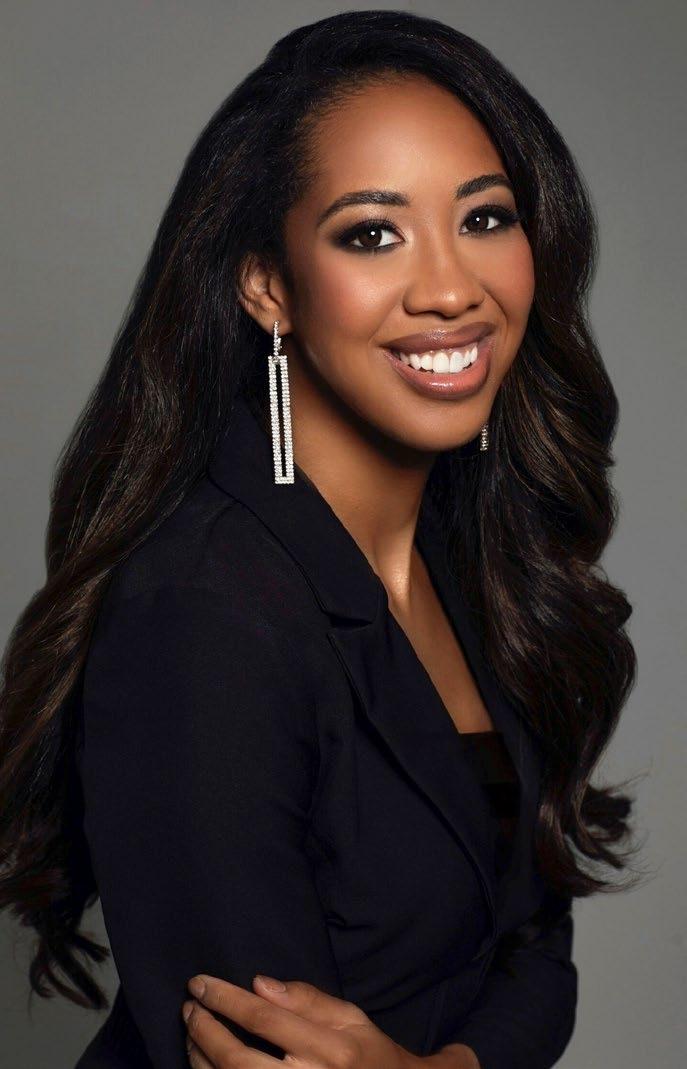
“YOU HAVE TO BE OK WITH NOT HAVING AN ANSWER TO A QUESTION RIGHT NOW.”

Associate General Counsel of IP Litigation at Meta
on her accomplishments and recognition by Modern Counsel
Abu Dhabi
Beijing
Brussels
Century City
Dallas
Denver
Dubai
Frankfurt
Hong Kong
Houston
London
Los Angeles
Munich
New York
Orange County
Palo Alto
Paris
Riyadh
San Francisco
Singapore
Washington, D.C.
gibsondunn.com congratulates
fied Information Privacy Professional in 2023. That knowledge has come in handy for product-related matters like the Ray-Ban Meta smart glasses.
The attorney relishes the opportunity to think more holistically about the company’s IP portfolio and its future rather than on a case-by-case basis. “Your decisions now have an impact across hundreds of different cases,” Sabanoglu explains. “But that means you’re not always going to be a subject-matter expert. You have to be OK with not having an answer to a question right now.”
Sabanoglu’s workload shows no signs of lightening anytime soon. The attorney says Meta is currently working on its next-generation AI models, which is almost guaranteed to draw interesting IP and litigation questions from all over the world. She’s also got two privacy cases that will be keeping her busy over the next year.
More broadly, Sabanoglu says she hopes she can be a point of inspiration for young lawyers of color. The lawyer says despite the rhetoric surrounding her employer’s ending of its DEI program, she works on the most diverse team she’s ever been a part of.
“This is a great place for diverse people,” Sabanoglu says. “It’s amazing how many different kinds of people I’ve had the opportunity to learn from.”
Outside her role, Sabanoglu is a regular volunteer at local soup kitchens and an active mentor for the nonprofit TechGirlz, which encourages middle school girls to get involved in STEM. It’s another way to give back, another way to help motivate girls to follow their dreams, and a chance to be the kind of mentor Sabanoglu has benefited from throughout her career.
Gibson Dunn:
“My colleagues and I have worked with Kyanna for the better part of a decade, both when she was a stellar young associate at Gibson Dunn working on our IP matters, and now that she’s in-house at Meta. Kyanna is incredibly smart, strategic, thoughtful, and practical. She has a broad and deep understanding of the technology and the law at issue in each of her cases and always knows what questions to ask and how to move matters forward. We feel very fortunate to work with her!”
—Diana Feinstein, Partner
Jenner & Block:
“Kyanna brings a nuanced and strategic approach to intellectual property litigation at Meta, where she skillfully navigates the complexities of IP rights and technology. It’s a privilege to partner with her on these ever-evolving issues.”
—Alison Stein, Cochair of Content, Media, and Entertainment Practice






auê Curti knows it’s always an interesting time to be at ByteDance, parent company of social media app TikTok. Ever since TikTok exploded, ByteDance has been in the headlines. But ByteDance’s global lead counsel for payments business at all wasn’t distracted by the external noise. Curti says one of his strengths is focusing on what’s in front of him.
By Keith Loria
“I’VE FOUND THAT FOCUSING ON THE WORK KEEPS ME FROM EXPENDING TOO MUCH ENERGY ON THINGS I DON’T PERSONALLY CONTROL.”
Kauê Curti is the perfect match for ByteDance, and not just because he’s a great in-house performer. He may also be singing the latest TikTok–famous song at karaoke. The global lead counsel is an avid karaoke singer and says that he’s spent enough time in karaoke bars all over the world that it’s become an anthropological exercise.
“The way that people behave at karaoke, the songs they sing, all of this says a lot about the culture surrounding it,” the lawyer explains. “In Mexico City, I found myself in a very affluent area with a lot of people speaking English, but almost all the songs I heard were sung in Spanish. That says a lot about the relationship people they have with their culture and their relationship to art. In other countries where English isn’t the primary language, you’ll still hear most songs being sung in English.”
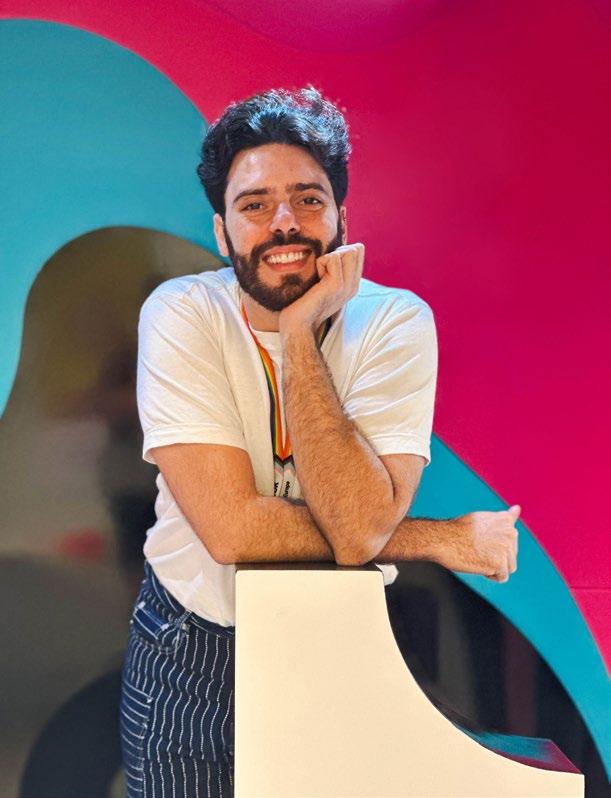
KAUÊ CURTI Global Lead Counsel for Payments Business ByteDance
“I’ve found that focusing on the work keeps me from expending too much energy on things I don’t personally control,” the lawyer says, laughing. “Whether that’s the way our company may be perceived at the moment, I focus on the work and delivering the results I’m expected to deliver, because that’s what drives and inspires me.”
ByteDance recruited Curti after he proved himself invaluable as an outside counsel. While practicing in his home country of Brazil, Curti saw TikTok usage explode in 2021. ByteDance saw the need to build a Brazil-based team and named Curti the second in-house counsel hired for the Latin America team. At the time, his responsibilities may as well have read “everything.”
“It was two of us, and I used to joke that we were the goalkeepers,” Curti says. “Every ball that someone would kick, we had to catch it. Fortunately, the operation expanded quite quickly in Brazil and across Latin America.”
One area of expansion was payment services, a critical part of ByteDance’s growth strategy. ByteDance didn’t have a dedicated payment services legal team yet, so every time the company wanted to expand into a new market, it had to rely on a local legal team to handle it. Many of those local teams didn’t have payment or financial services expertise and weren’t well versed in how the larger business needed to interact with a heavily regulated financial industry.
The company identified the issue and asked Curti to support building a dedicated legal team from scratch. The lawyer spent most of 2023 building out what that team should look like. He identified gaps, created processes and efficiencies, and developed relationships with other teams he would need to interact with regularly, like IP, privacy, and litigation.
For Curti, working at ByteDance is an ideal fit because of his implicit need to do something different every day. Early on, he had a stable job at the Brazilian stock exchange, but it was too repetitive for him to be happy.
“When I know exactly what I’m going to be doing every day, my brain starts trying to fix problems that aren’t part of my job,” Curti explains. “They may not even be work problems, but I’m built to solve problems, even when there aren’t any. I love working [at ByteDance] because I’m not entirely sure what the next day will bring. I have yet to wake up and dread going to work.”
“Kauê’s leadership in the payments space exemplifies his exceptional ability to navigate complex challenges with innovation and focus,” say Greenberg Traurig’s Marina Olman-Pal, shareholder and cochair in the financial regulatory and compliance practice, and Hilary R. Sledge-Sarnor, a corporate practice shareholder. “We’re proud to celebrate his achievements and grateful for our long-standing partnership.”
The lawyer knows his job is a special one, and he believes it may have something to do with his ability to navigate personalities and cultures well. Curti says he took this skill for granted until someone pointed it out to him.
“It’s a skill so many Latin Americans possess,” the attorney explains. “We don’t want to operate in an environment where we don’t understand the people we’re working with. We want to know people and connect with people.”
As for the skill that’s most important for Curti today, the lead counsel says that as he’s ascended in his career and became a manager, he found himself doing more listening and not trying to have the answer ready immediately. He knows his multicultural team has different ideas, ways of being successful, and needs. But it’s that variety and diversity that keep him interested in coming to work every day.

Aaron Fennimore talks the evolving world of counterfeit goods and protecting brands at Western Digital
By Will Grant



One of Aaron Fennimore’s earliest legal roles, even before he passed the bar, involved maintaining and enforcing properties at MGM Studios—including James Bond, the secret agent with a “license to kill.”
Now, as director and associate general counsel for trademark and brand protection at Western Digital (WD), Fennimore protects brands like WD and SanDisk from counterfeiters. It’s not international espionage à la 007, but James Bond didn’t have to face down an e-commerce environment where consumers’ phones serve up counterfeit goods to them daily.
something else entirely. Additionally, many counterfeiters avoid detection by closely copying designs but leaving off identifiable brand names. The complexities multiply for large, well-known marketplaces.


The pandemic blew the e-commerce environment wide open, the AGC says.
“During COVID, so much counterfeiting up and moved directly online, whereas it might have been a flea market or more localized marketplace before,” Fennimore explains. “These markets are everywhere: hundreds of platforms and all the quick shops you can set up in a couple of minutes. That makes getting a global view of where your products are being created and sold enormously difficult.”
Counterfeiters often create intentionally vague, if not outrightly fictitious, product photos and descriptions, often plucked directly from Western Digital's online assets. What arrives in the mail may be
If you’ve ever bought a product on Amazon and had it show up weeks later in unrecognizable packaging, you likely selected a seller from the vendor list that wasn’t Amazon itself. Most of the time, it’s not a problem. But counterfeiters use this confusion to their advantage. They intentionally muddy the waters so that consumers incorrectly assume they’re dealing directly with an internationally known brand.
“So much of the time, consumers just select from a list of what is cheapest,” Fennimore says. “They may not realize where their product is coming from. There are so many obstacles that stand in the way of identifying what is real and what isn’t.”
Fennimore and his team conduct test buys to establish where a product is coming from. Then they move in to enforce their rights and take down online listings. But that’s only the beginning in an online environment where sellers can easily create new accounts and continue hocking counterfeit goods.
Cooperating with online platforms to combat counterfeit goods, he says, is both critical and complex.
“There is a lot of tension between brands and marketplaces,” Fennimore says. “Some do everything they can to be responsible and collaborate with brands. Others do the absolute minimum to avoid liability issues. And some ignore you entirely.”
Fennimore understands that public sentiment may be a robust “So what?” A designer handbag selling at a fraction of the normal cost? A pair of sneakers otherwise only



available on the wildly upsold secondary market? The AGC says he knows he’s not curing cancer, but the real costs of counterfeiting aren’t well publicized.
Counterfeit goods are often money-laundering fronts for organized crime rings like the Japanese yakuza, Italian camorra, and Chinese triads, which have diversified over the years. Money from counterfeit operations often funds drugs, weapons, and other illicit trades. And the people making those cheap goods? Typically, they’re victims of human trafficking and forced labor.
With counterfeit operations taking in hundreds of billions of dollars a year, the impact is all too real.
Then there is the consumer cost. Western Digital has built a decades-long reputation for creating data storage devices and technology for consumers’ most critical data. That data may live in spreadsheets, photo albums, or video and audio files, and it needs regular backup and saving. Consumers who unknowingly purchase counterfeit technology risk losing information that no longer exists on paper.
These are the kinds of long-range fights that made Fennimore go in-house in the first place. He wanted to be part of decision-making teams that led an organization forward. The attorney spent five years on a small team at Vizio before joining the massive Western Digital family.
IP protection isn’t the only thing on Fennimore’s plate. Western Digital is going through what the AGC calls a “friendly separation” between its hard disk drive and flash businesses that will result in two independent public companies. With tens of thousands of employees involved, Fennimore and his colleagues have a lot of extra work, but he says it will ultimately result in a better situation for all involved.
“We’re helping with the separation while ensuring the strength and reputation of our trademarks,” Fennimore says. “We want to make sure that the brands go where they need to go and keep them safe in the meantime. It’s a lot, but it’s a fun challenge.”
Portraits of today’s top legal executives, the remarkable careers they have cultivated, and the management strategies and best practices they employ to succeed both individually and collaboratively
Portraits of today’s top executives, remarkable careers they have cultivated, the management strategies and best practices they employ to succeed both individually and collaboratively
Javaria Neagle reflects on the business-centric strategy that makes her an invaluable litigator at United Airlines

By Billy Yost
IN SEPTEMBER 2025, JAVARIA NEAGLE WILL CELEBRATE fourteen years in-house at United Airlines Inc. She started her career at United as counsel of managing litigation, an endeavor she knew she could take on after having been in the litigation trenches herself while in private practice. She’s steadily been promoted over the years to her present role as associate general counsel of litigation.
Neagle oversees a robust team of twelve lawyers and legal professionals responsible for litigation, environmental and sustainability, e-discovery, information governance, and subpoenas. She also manages a wide portfolio of litigation including antitrust suits, commercial class actions, and personal injury matters.
A pivotal factor to Neagle’s longevity, and one that defines her in-house practice, is knowing how to take into account the dynamics of contentious situations
along with the best interests of the business to avoid litigation and drive settlements that are a boon for her company.
“An effective in-house counsel needs to understand what the business’s objectives are along with the relationship dynamics and market conditions when advising on the best course of action,” Neagle explains. “So, before you take a more aggressive path or want to amp up the volume, it’s really important to sit down with your business clients to understand if ending a relationship makes sense and how that may impact their day-to-day operations, and in turn, our customers.
“Of course, we can always litigate, and that’s sometimes necessary to take a stand or otherwise get the parties to the settlement table,” she continues. “But on several high-profile issues, I have myself or coached my clients to strike the right balance in effectively
“It’s important for me to show my kids that I use my skills to help those in need, and I challenge them to find ways to do the same.”
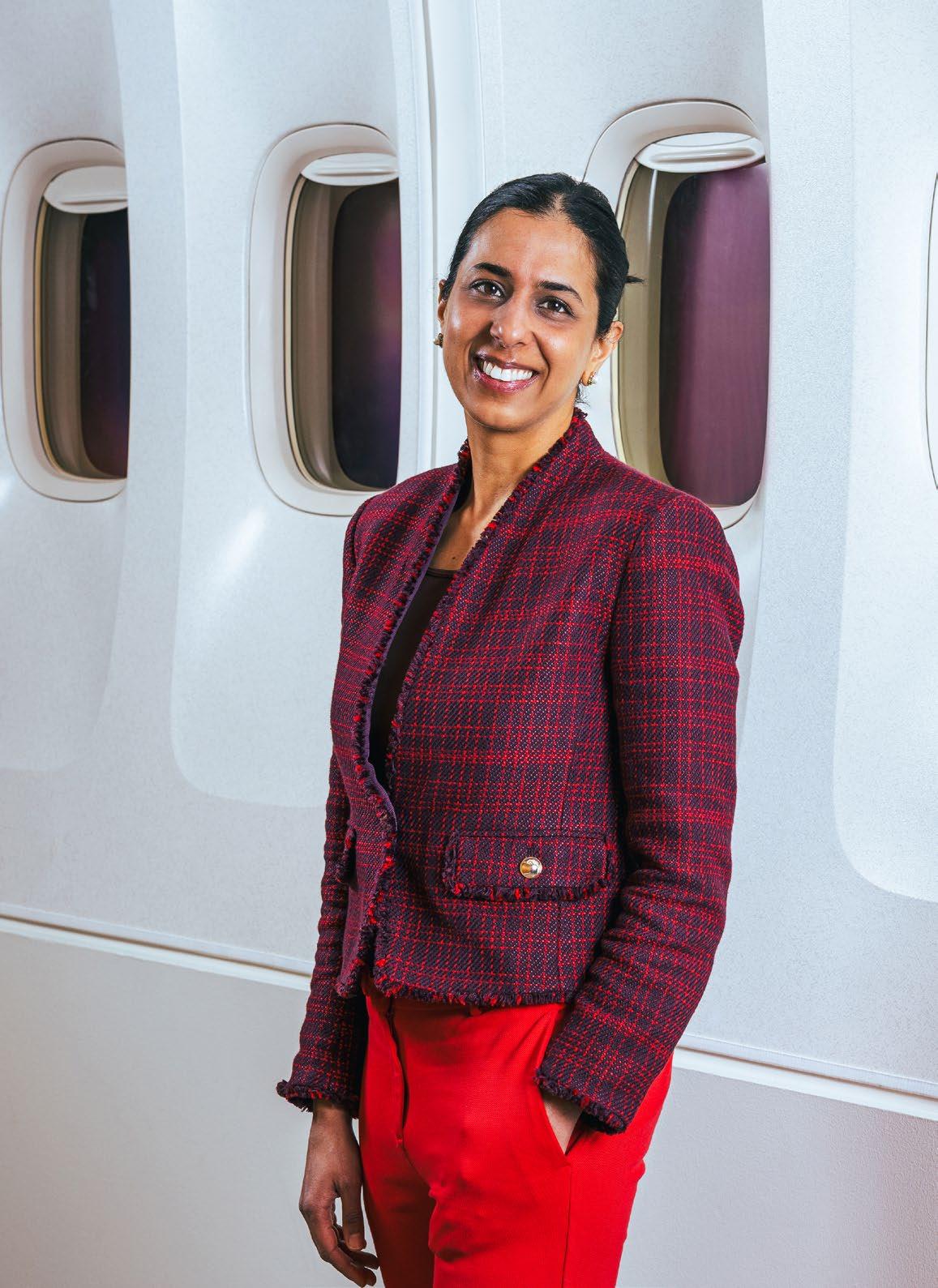

Javaria Neagle Associate General Counsel of Litigation United Airlines Inc.
Javaria Neagle founded Kinnect, the parent and caregiver business resource group for employees at United Airlines. Kinnect launched after the pandemic and was a way for Neagle to bring more attention to the great juggling act it is for those who are parents or the primary caregivers for loved ones, while simultaneously striving to move their careers forward.
“I am a firm believer that family comes first,” Neagle says. “There are days when family yields to work and others when work yields to family, and others when we feel like we conquered both. But having a group dedicated to parents and caregivers at United means that we will have more days when we feel like we can conquer both roles of caregiver and colleague.”
leveraging our legal arguments to maximize value for the company while maintaining strong relations across the board without the need to haul anyone (or be hauled) to court.”
Neagle’s expertise doesn’t go unnoticed by Gabor Balassa, partner at Kirkland & Ellis. “Javaria’s razor-sharp legal mind and business acumen allow her to see all sides of legal challenges and their implications for her client,” Balassa says. “With standout communication skills, she engages deeply with outside counsel, pushing us to think creatively to address the business’ needs, and conveys legal considerations with precision to her business clients. She moves matters forward with relentlessly positive energy, effectively leveraging outside counsel and delivering for the business.”
Based on what she has learned and leveraging legal positions, Neagle has found alternative routes that ultimately save United money, manpower, and minimize the distractions to
When Javaria Neagle’s father passed away during the pandemic, she looked for a meaningful way to honor his memory and their roots. The multilingual attorney speaks Urdu, the national language of Pakistan, and her father was the only person she spoke it with on a routine basis.
So, Neagle, her aunt, cousins, and daughter take part in a regular poetry jam where they read poems in Urdu aloud, and the family discusses them.
“Not only does it keep me connected to my heritage and to my family, but also, languages allow me to open my mind,” she explains. “Stimulating my gray matter helps me to be a better lawyer and problemsolver overall.”
management that can come with being mired down in litigation.
“But when it makes sense to litigate, I’m the first one ready to go,” Neagle says with a smile. “Oftentimes litigation can’t be avoided, and in those instances, I work closely with my clients to creatively craft our best defenses, create offensive strategies, and socialize them as appropriate to mitigate risk to the brand to drive good results.”
Neagle adds that thinking outside the box (and that’s where stretching the gray matter comes in handy), good old-fashioned hard work, and teamwork is the formula for the successful management of litigation.
“Javaria is an elite litigator, mentor, and team builder,” says Telly Andrews, partner at KMA Zuckert LLP. “Having worked with Javaria for well over a decade, we are continually impressed by her ability to bring her vast experience and innate skill to envision an efficient and beneficial resolution to each complex matter and to bring it to fruition.”
The ability to distill that approach down to those teachable few sentences says a lot about Neagle—the practice she’s cultivated, the gut checks she seeks out and encourages her team to ask for, and her capacity to lead a team of aligned attorneys.

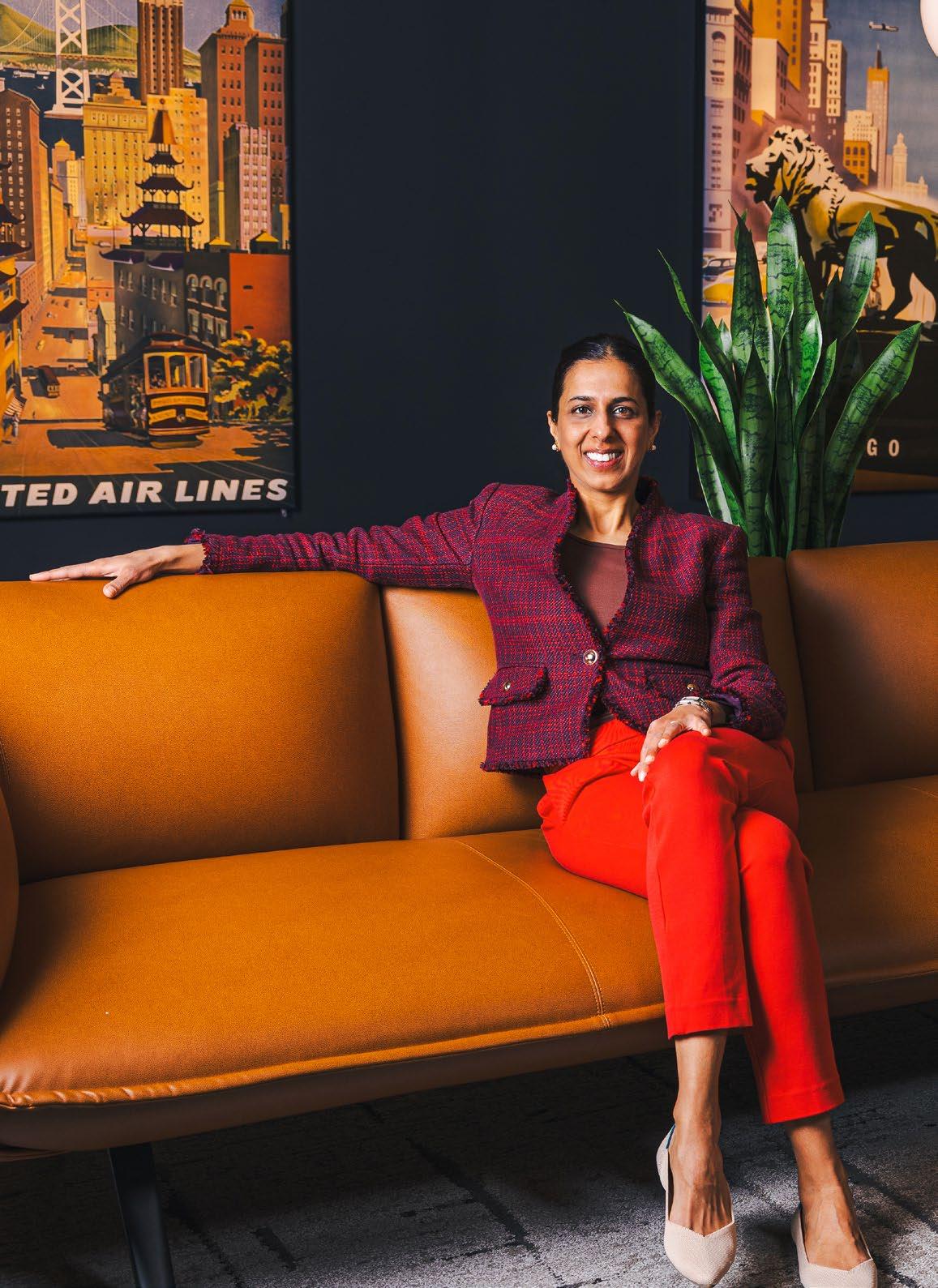

“The thrill of a new issue, which will force you to think quickly and challenge you to formulate a response, will cause you to grow by leaps and bounds.”
With six decades of experience, KMA Zuckert has provided legal services to corporations, associations, governments, and individuals from the United States and numerous other countries. The firm is recognized for its unique expertise in the aviation industry, where its practice encompasses virtually every aspect of aviation law. The firm represents US and foreign airlines and other commercial aircraft operators, aviation trade associations, public charter and tour operators, corporate flight departments and private jet owners, travel agencies, local and state airport authorities, aircraft and parts manufacturers, and aircraft lessors and mortgagees, as well as financial institutions and other lenders.
KMA Zuckert’s attorneys have a nationally and internationally recognized expertise and have handled matters in every state and in many foreign venues at the investigatory, regulatory, trial, and appellate levels. With offices in Chicago, Los Angeles, Miami, New York, Newark, and Washington, DC, the firm is ideally located to serve its clients.
The firm’s goals have remained the same since the beginning. The common thread that binds its mission is the desire and ability to listen to clients and to partner with them to identify objectives, outline strategies, and implement a plan to support their business mission.
If you want to be effective in-house, she says, you need to both have a good gut (i.e., good judgment) and be OK with a lack of absolute certainty.
“I’ve found myself saying to teammates that I’ve brought on board recently,” Neagle says, “[that] we often provide advice based on a quick gut reaction. So, if you want to come to work every day and be exposed to something new and interesting nearly daily, this is the place for you. The thrill of a new issue, which will force you to think quickly and challenge you to formulate a response, will cause you to grow by leaps and bounds.
“And if you feel comfortable operating on your feet,” she continues, “then being in-house is the right environment for you. It’s what keeps me at United, where I am meaningfully engaged and challenged every day. You can’t ask for much more than that!”
While her in-house case management and leadership responsibilities require a great deal of her time, Neagle has racked up an incredible amount of pro bono experience while also using her Spanish language skills to represent asylum seekers fleeing dangerous and often life-threatening circumstances in their home countries. Among her greatest career accomplishments are her victories for her former clients, when she successfully advocated for their right to call the US their home.
“I make it a point to talk to my kids about these clients and, in some cases, my kids have met my clients’ kids, who were also fighting for asylum. It’s important for me to show my kids that I use my skills to help those in need, and I challenge them to find ways to do the same,” Neagle says.
The associate general counsel was recognized by the South Asian Bar Association for her in-house leadership and pro bono accomplishments in 2023. And there’s no doubt that Neagle will continue acting as inspiration for her fellow in-house teammates, her own family, and the most vulnerable people she serves.

With offices in Chicago, Los Angeles, Miami, New York, Newark, and Washington, DC, KMA Zuckert has decades of experience solving problems for clients across a broad range of disciplines, including strategically litigating for transportation entities, product manufacturers and insurers, as well as providing regulatory, transactional, commercial and tax counsel to a diverse base of clients, including aviation and aerospace businesses, surface transportation companies, shippers and nonprofit organizations. KMA Zuckert's attorneys have a nationally and internationally recognized expertise in the transportation industries and have handled matters in every state as well as in many foreign venues at the investigatory, regulatory, trial and appellate levels.
Georgia Magno brings two decades of international legal expertise to Baker Hughes
By Billy Yost
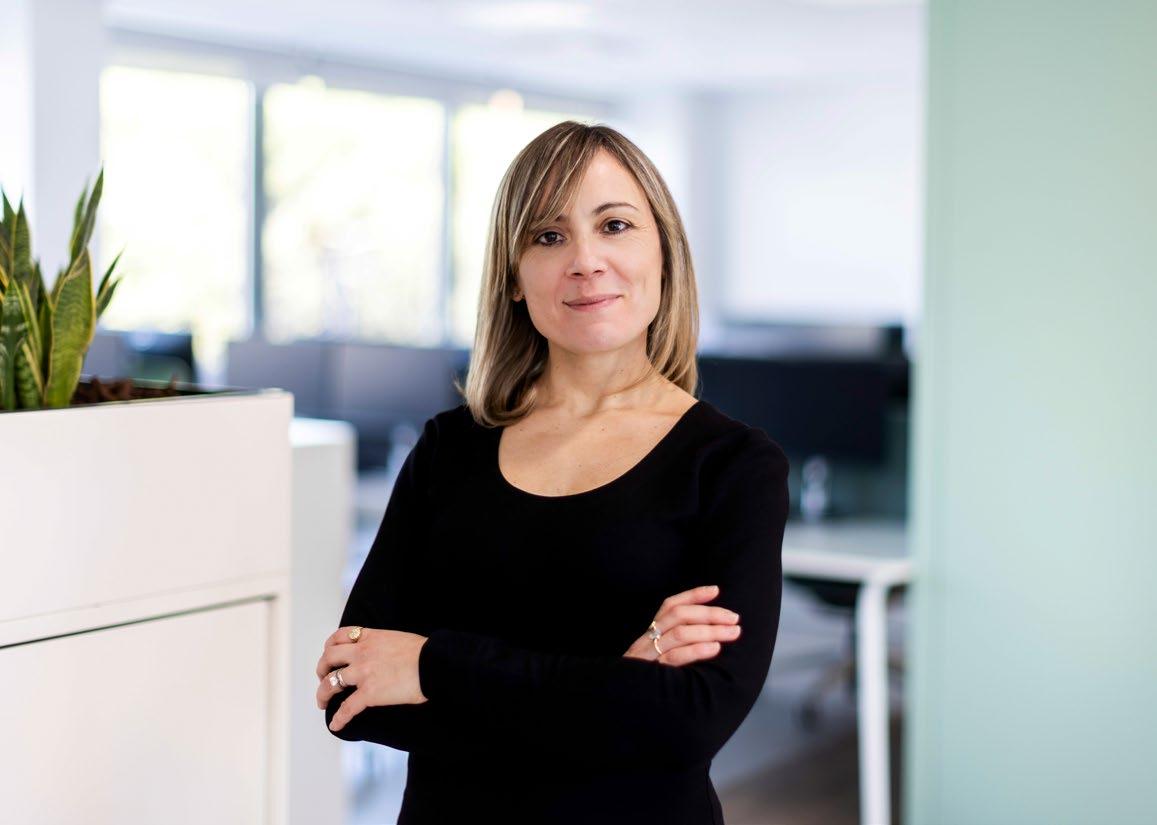
GEORGIA MAGNO IS RESPONSIBLE FOR ALL GLOBAL legal and compliance matters for Baker Hughes, a multibillion-dollar energy technology company. With more than two decades of experience as a litigator and in-house counsel, the chief legal officer (CLO) has built a career that spans continents, legal traditions, and industries.
Magno, who earned her LLM at Harvard Law and her JD at the University of Bologna, is as comfortable working in the US as in international markets. She brings an instinctive big picture perspective to legal strategy. “Considering the global nature of many large corporations, like Baker Hughes, the opportunity to study and practice law in both common law and civil law jurisdictions has enabled me to work successfully
“I prioritize hiring individuals with intellectual curiosity, emotional intelligence, and strong communication skills.”
on negotiations and projects across the globe and to understand and anticipate risks and opportunities at a local and global scale,” Magno says.
“It also instilled a deep appreciation for the nuances of different jurisdictions, legal traditions and cultures, and the importance of cultural context—and respect—in decision-making and leadership,” she continues. “Whether negotiating cross-border agreements or resolving disputes, I strive to be a respectful lawyer and leader and to balance universal ethical principles with local norms and customs.”
Magno has been at Baker Hughes since 2010, with multiple promotions en route to her current CLO role. The attorney has risen through specific legal functions to her current strategic purview as a generalist. In the energy sector, strategy is more essential than ever as the industry evolves rapidly.
The attorney says energy is necessary for social progress and is closely intertwined with geopolitical dynamics. Her team must always be two steps ahead of technological trends like artificial intelligence and innovation in sustainable energy technology.
“I truly love my job because I get to be a lawyer and use my expertise to enable

We are proud to celebrate our friend Georgia Magno, Chief Legal Officer of Baker Hughes.
“Whether negotiating cross-border agreements or resolving disputes, I strive to be a respectful lawyer and leader and to balance universal ethical principles with local norms and customs.”
the long-term, sustainable growth of a business in a critical industry and in the deployment of remarkable technologies,” Magno explains. “My success and the success of my team depends on our ability to collaborate across functions, acting as a trusted advisor to leadership and helping drive decisions that create true value for our organization and our broader set of stakeholders. That of course includes our employees and their families, but also our customers, suppliers, and communities at large.”
Today, Magno is entrusted with shaping the governance, risk management, and compliance frameworks at Baker Hughes, ensuring they support not just regulatory requirements but also the company’s commitment to
long-term growth, ethical leadership, and sustainability. In building her own team, the CLO says diversity of thought is critical.
To be successful on Magno’s team, technical brilliance is just the starting point. She looks for practical problem-solvers who can think beyond their legal lens to be a business enabler.
“I prioritize hiring individuals with intellectual curiosity, emotional intelligence, and strong communication skills,” Magno says. “I value people who can translate complex legal frameworks into actionable advice for stakeholders.”
Though the energy sector has been historically male-dominated, Magno says that at Baker Hughes diversity— in every form—has always been considered a strength and an innovative force.
She has always focused on building meaningful relationships, and acting with courage and curiosity to have her voice heard and ensure everyone’s voice is also heard and respected.
“Everyone for one reason or another will face moments where his or her worth may be underestimated due to some unconscious biases, but for me the answer is to remain focused, be well prepared, deliver results, and build a personal and professional support network. We all have difficult days, and we all need a strong support network that is built over time on trust, respect, inclusivity and integrity,” the CLO says.
Magno says networking has been crucial for her career growth and development. Along with cultivating
relationships inside Baker Hughes, the CLO has gained diverse insights and perspectives at organizations like World50, the Conference Board, and the Harvard Law School Alumni Association.
The attorney says she’s built relationships by being genuinely interested and invested in others. The CLO says her values align with the Baker Hughes motto: “People first.”
“Georgia is a true force. Her impeccable judgment and natural leadership are consistently evident in her relentless advocacy for Baker Hughes,” says Frank Azzopardi, partner and head of IP and commercial transactions at Davis Polk. “I am grateful for our collaboration on some of the most challenging transactions of my career, and I look forward to continuing our partnership for many years to come.”
For those looking to widen their own networks, Magno says to keep it simple. Approach connections with authenticity. Work to understand others’ goals just as you would like them to understand your own.
Outside her role, but also in support of it, Magno spends a great deal of time giving back to the community, mentoring young professionals, working with organizations like Save the Children, volunteering with the Baker Hughes Women’s Network, and leading the Baker Hughes Pride@Work employee resource group.
“Ultimately, what makes me whole is living a balanced, purpose-driven life that reflects my values both professionally and personally,” Magno sums up.

WilmerHale is proud to join Modern Counsel in congratulating Georgia Magno for her accomplishments at Baker Hughes.
Providing legal representation across a comprehensive range of practice areas that are critical to the success of our clients.
WilmerHale:
“Georgia leads with a fantastic sense of strategic direction. Her trademark combination of rigor, depth, and friendly enthusiasm brings out the best in all of us, and her knowledge of the company is unmatched.”
—Hartmut Schneider, Partner


Motorcycles, watercrafts, and the future of sustainable sport vehicles
By Will Grant
Kawasaki Motors USA, Jonathan Murphy has been on a high-speed journey of his own since coming to the company in 2016. The twice-promoted in-house lawyer has cultivated a reputation as an expert in product liability and warranty litigation, international internal investigations, company witness preparation, insurance coverage administration and management, regulatory compliance, and administrative law issues.
Today, Murphy advises business leaders regarding product design and warning risks and general corporate risk management issues. The lawyer is wellregarded for his efficiency and leadership at Kawasaki Motors.
Prior to coming to Kawasaki, Murphy spent nearly five years at the firm Snell & Wilmer. He ultimately moved in-house because he wanted to focus on longterm strategy and acting as a continuous business partner.
The lawyer is a graduate of the University of Texas School of Law where he also acted as staff editor for the Texas Review of Entertainment & Sports Law and the Texas International Law Journal Murphy’s internal counsel may soon include a landmark development by
Kawasaki Motors’ parent company in Japan. Kawasaki recently made headlines with the announcement of the Ninja H2 HySE, a motorcycle that merges hydrogen fuel cell technology and electric motors. The resulting superbike is the best of both worlds: “unprecedented performance and eco-friendly operation,” according to a company spokesperson.
The biggest breakthrough lies in the motorcycle’s powertrain. The hydrogen fuel cells convert hydrogen into electricity which powers the bike’s electric motor, reducing tailpipe emissions entirely while also providing the kind of torque that is legitimately on par with a jet turbine.
Unfortunately, the Ninja H2 HySE won’t be coming to a highway near you any time soon. The bike was an internal Kawasaki project, an experiment to see if the high-performance demands of the motorcycle community could be married with sustainability and clean energy. But hydrogen-powered bikes may be the future of Kawasaki’s motorcycle business.
At the end of 2024, Kawasaki Motors also introduced a new model of its popular watercraft segment, the Jet Ski SX-X 160 stand-up watercraft.
“Kawasaki was a pioneer in the power sports industry creating the first Jet Ski
and built a completely new style of water-based leisure activity,” said Kawasaki Motors President and CEO Hiroshi Ito. “Kawasaki intends to expand our PWC business supported by a robust model lineup, expanded marketing campaigns, and our continuation of strong sales programs.”
Whether Murphy is supporting the more traditional rollout of a new product or the R&D required to create something entirely new, the lawyer says he’s found the perfect job for him, and it’s no wonder he’s remained with Kawasaki for the last decade.
on his success at Congratulations to





Foley & Lardner LLP:
“Jonathan Murphy is one of the brightest and most dedicated in-house counsel with whom Foley is privileged to work. His expertise in Kawasaki’s many business lines combined with his savvy and problemsolving prowess position him well to lead from the front. His forward thinking and team-oriented approach to problem-solving helps to forge a formidable team between our great organizations in support of Kawasaki’s business and legal needs.”
—Erik K. Swanholt, Partner, Litigation
Morrison Foerster:
“Jonathan is a strategic thinker who quickly masters the complexities and nuances of any situation. He is responsive, pragmatic, and a pleasure to work with.”
—James Koukios, Cochair of Morrison Foerster’s Securities Litigation, Enforcement, and White Collar Defense Group
Thompson Coburn and Erick VanDorn are proud to continue our long-standing relationship with Jonathan.






Sports fan Audrey Sheetz of FanDuel finds the fast-paced environment of the growing sports betting industry a perfect fit
By Frank DiMaria
AN AVID SPORTS FAN, AUDREY SHEETZ HAS ALWAYS found the intersection of sports and the business world interesting. “Especially how it interplays with the law and regulation,” says Sheetz, senior counsel of litigation at FanDuel.
In 2018, the US Supreme Court struck down the Professional and Amateur Sports Protection Act, setting the stage for states to allow legal, regulated, single-game wagers on both collegiate and professional sports. Almost immediately, companies offering online betting flourished. FanDuel was one of them. “I started at FanDuel in 2022, and the company had already grown exponentially,” Sheetz says.
“Every day is different, and that’s what makes my job exciting.”
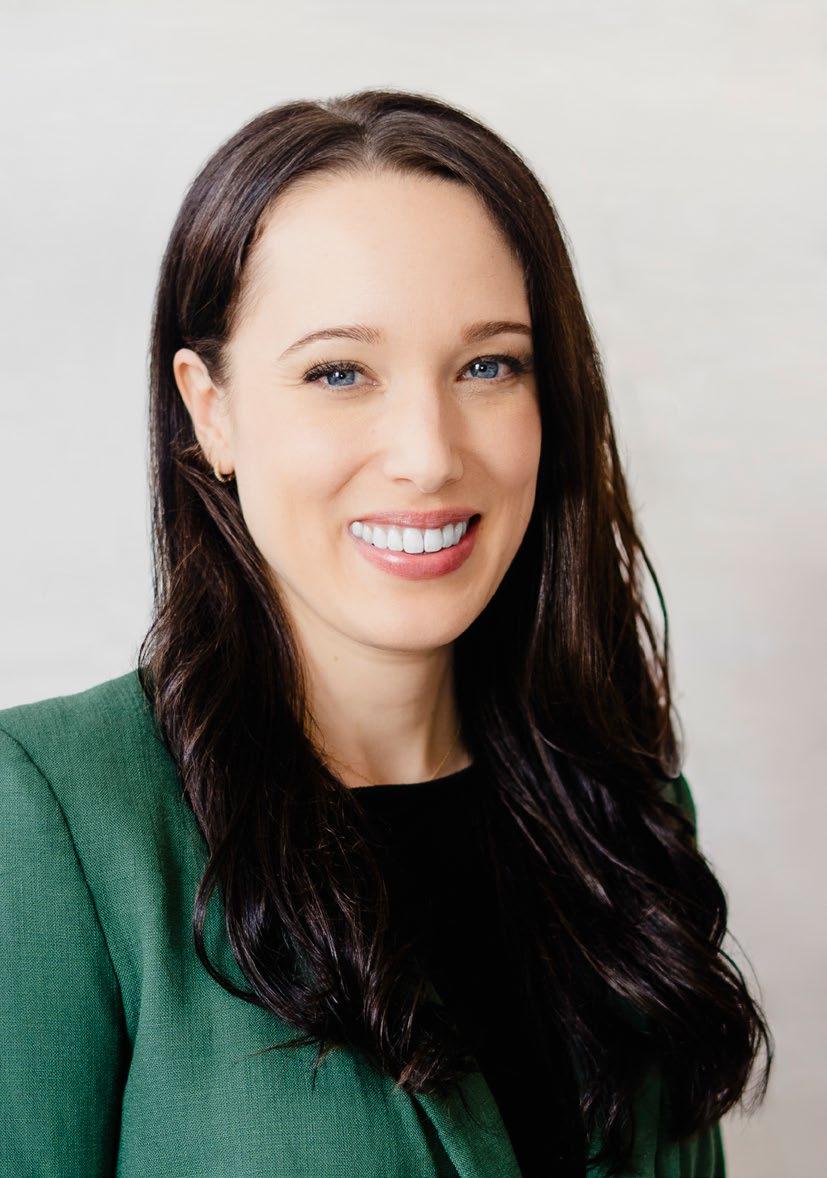
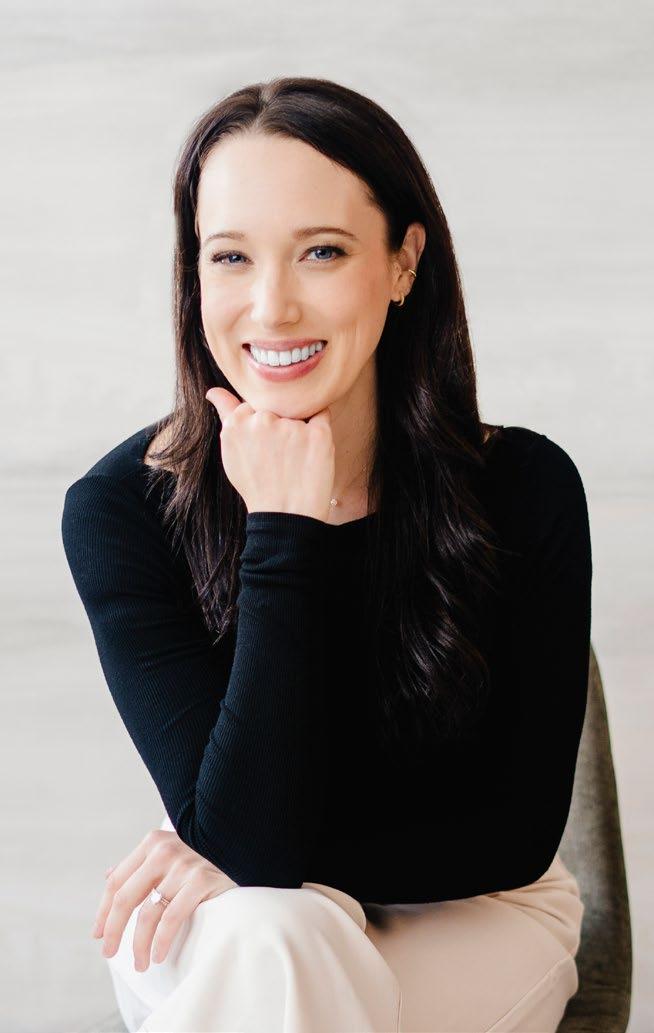
“I’ve learned that it’s important to remove your lawyer hat, listen, and then advise in a way that’s digestible to everyone, not just lawyers.”
Sheetz continues to thrive in the exciting, fast-paced world of sports betting. One aspect of the role that she loves is the variety of legal issues she encounters, from IP to commercial matters to employment law. “Every day is different, and that’s what makes my job exciting,” Sheetz says.
Another aspect of the job that Sheetz appreciates is her colleagues. “I am lucky to work with such a talented group of people, both in the legal department and beyond,” she says.
Despite her enthusiasm for the legal profession, Sheetz didn’t aspire to practice law as a child. She initially resisted the idea of following in her father’s footsteps, who was a prosecutor and often worked long hours in the public sector.
“Some people see the profession their parents are in, and that’s what’s ingrained in them and that’s what they want to do,” Sheetz says. “I didn’t appreciate how similar my father and I
are, in work ethic and temperament, until later in my life.”
In college, she had a change of heart after taking some prelaw classes. Sheetz realized lawyers can be “wonderful advocates and make an impact on others,” which fits with her passion for community service and helping people.
She earned a BA in justice, law, and society and began working as a paralegal. “[The paralegal role] gave me more of a professional understanding,” Sheetz says. “It allowed me to learn differently in law school, knowing how you would ultimately apply those skills in real life,” She entered law school with a more mature mindset and approached it as a career instead of as a continuation of college.
While attending Brooklyn Law School, Sheetz worked at the Southern District of New York for the US Attorney’s Office and in the Eastern District of New York in the US Attorney’s Office as a student prosecutor. “I got a lot of experience in the public sector, specifically as a litigator,” Sheetz says.
A summer intern position at Herrick Feinstein led to an associate’s position at the midsized firm, which provided her with valuable hands-on experience she would not have gained at a larger firm.
“The great thing about Herrick was that it allowed and encouraged me to take ownership of matters as a young associate, eventually working on a trial,” Sheetz says. Having direct interaction with her clients at Herrick taught her to advocate for clients and laid the foundation for
her eventual move to her in-house position at FanDuel.
Transitioning from firm life to in-house life, Sheetz quickly drew upon two skills she’d honed: building relationships and working with various types of people. “At a firm, you’re surrounded by like-minded lawyers. At FanDuel, I work with people across the business,” Sheetz says. “I’ve learned that it’s important to remove your lawyer hat, listen, and then advise in a way that’s digestible to everyone, not just lawyers.”
While most law students are predisposed to checking off boxes on a prearranged career path, Sheetz has proven with her life’s example that not everybody needs a plan to succeed. Plans can be helpful, but they can also cause tunnel vision. “Opportunities might look a little different from that checklist, but success might also look different to you as your career progresses,” she says.
Success is not only measured at the office either. As the mother of a one-year-old, Sheetz says, her career is so rewarding that it’s made her a better mom. She dedicates uninterrupted time to both versions of herself.
“My hope is that as my daughter gets older, she sees me as someone who loves her job but also loves being her mom,” Sheetz says. “If I achieve that, then I’ve succeeded.”
King & Spalding:
“Audrey is an exceptional lawyer and a great partner to outside counsel. She’s savvy and supportive, and not afraid to ask hard questions and carefully probe answers.”
—Matt Biben and Mark Kirsch, Partners

Malaika Caldwell relentlessly gives back to the community that made her an award-winning ERISA expert at Kyndryl
By Billy Yost
“My parents did not pursue higher education, but they were both so encouraging and instilled confidence in me to always dream big. They would figure out a way to buy me any book that I wanted or needed. That opened up new worlds for me.”
SERVANT LEADER. BOARD MEMBER. Philanthropist. Unicorn.
A director and counsel at Kyndryl, Malaika Caldwell is the sole benefits and compensation attorney in her company of around eighty thousand.
Just a month after accepting a role at the global tech company and knowing only a few people in the firm, the Employee Retirement Income Security Act (ERISA) lawyer volunteered to found and colead the company’s Black employee resource group (known as KINs), BeKIN.
“I wanted to be a connector and help foster and create programming and career and professional development
opportunities for other employees of color,” Caldwell explains. “It was a passion project that I truly love.” She now jokingly calls BeKIN her “night job.”
Caldwell’s drive to advocate for colleagues she had yet to meet or work alongside makes her a natural servant leader. Even when she was familiarizing herself with the newness of Kyndryl, she found time and space to serve others.
Months later, still in the early days of her job, Kyndryl selected Caldwell as the young company’s first fellow for the Leadership Council on Legal Diversity (LCLD), an experience Caldwell describes as “incredible.” And when
reporting back to leadership at Kyndryl, she saw it as an opportunity to advocate for Kyndryl’s continued investment in opportunities like LCLD for other members of Kyndryl.
Caldwell is a Black female attorney with deep ERISA and global benefits expertise. She rarely sees anyone who looks like her in meetings, especially in an area of the law that rarely attracts women or attorneys of color, and it has been that way throughout her career. It’s why the lawyer is so passionate about advancing the careers of other employees of color and providing them with meaningful opportunities to grow their skill sets.
“Do not try to give yourself to a bunch of different causes. You will burn out. Be true to yourself, and you will figure out what service means to you.”
Caldwell’s service to Kyndryl has not gone unnoticed. Recently, she was selected to receive the prestigious inaugural Heart of Kyndryl Award. She was recognized along with her fellow recipients at a global ceremony in September 2024 in Portugal.
“It’s really rewarding to work with Malaika because she is smart, with good practical judgment, and has strong technical knowledge,” says outside employee benefits counsel to Kyndryl, Spencer Walters at Ivins, Phillips & Barker, Chtd. “It is also very impressive that Malaika has quickly earned the trust of her internal clients at Kyndryl and immediately contributed to such a positive workplace culture, which is not always easy, particularly at a corporate spin-off like Kyndryl.”
Unsurprisingly, Caldwell’s advocacy for colleagues is just a fraction of Caldwell’s service to others. She served
on the board of directors for BUILD Chicago, a nonprofit dedicated to gang intervention, violence prevention, and youth development, from 2016 to 2023. She is now joining the board for Chicago Arts Partnership in Education, an organization that helps reach students in Chicago Public Schools through the arts. Caldwell is also a member of the Association of Corporate Counsel Street Law Program, which introduces high school students from underrepresented backgrounds to careers in law.
Caldwell advises younger attorneys who want to give back to seek out associate boards and nonprofits that can benefit from their expertise. The most important qualification? A passion for the cause.
“If you care about the work that you do, you will find time for it,” Caldwell says. “Do not try to give yourself to a
bunch of different causes. You will burn out. Be true to yourself, and you will figure out what service means to you.”
In that sense, Caldwell’s community service is incredibly personal. Caldwell grew up on Chicago’s West Side. While her parents raised their daughter to pursue her dreams, her older brothers had trouble seeing past the neighborhood. Though they were all intelligent young men with great potential, they were drawn into gang life and trouble with the law.
Caldwell says community centers and books were her way out of economically impoverished, violent surroundings. Also, Caldwell’s mother was her cheerleader, pushing her to excel in school and seize her dreams.
“My parents did not pursue higher education,” Caldwell says “but they were both so encouraging and instilled confidence in me to always dream big. They would figure out a way to buy me any book that I wanted or needed. That opened up new worlds for me.”
Caldwell still lives on Chicago’s West Side. It’s where she’s from, and it’s the community she wants to empower. She knows firsthand how hope can drive change in underserved and underrepresented communities, and she wants to be part of that change. She says her service work is an obligation. She accessed resources in her community to help her achieve her dreams, and she wants to ensure more people have those same opportunities.
Caldwell’s professional excellence in a male-dominated niche area of the law, coupled with her servant leadership and philanthropic endeavors, makes her a true unicorn. And she works hard to ensure that talented unicorns won’t be so rare in the future.
By Will Grant
MERCEDES HOBSON IS INTELLECTUAL PROPERTY
counsel for Google’s X Division, a coveted company within a coveted company. Hobson’s work entails handling IP duties for breakthrough technologies and business ideas that are so cutting edge that Google created an entire “moonshot factory” to nurture the ideas of tomorrow.
The team behind X has brought Google Brain, Verily, Intrinsic, Waymo, and Wing to fruition, and there is little doubt that any patent attorney anywhere working for any company would trade places with Hobson in an instant. That’s today.
Hobson didn’t grow up in a family of lawyers. She didn’t attend a prestigious private school. She wasn’t a shoo-in for the university of her choice because of the prestige of her family’s name. And while interviewing at IBM for her first real legal role, she was having a hard time explaining why she deserved an IP job when she had no real IP experience. In short, the interview wasn’t going well.
“It just kept coming back to the same question of ‘We’re just not seeing experience here that lets us know you would be a good fit for this job,’” Hobson remem-
bers. “I had always been self-taught when it came to technology. It was something I was passionate about as a kid. And, frankly, I had sent out hundreds of résumés and cover letters to any place that even might have an IP department trying to get any experience that I could.”
“I had always been self-taught when it came to technology. It was something I was passionate about as a kid.”
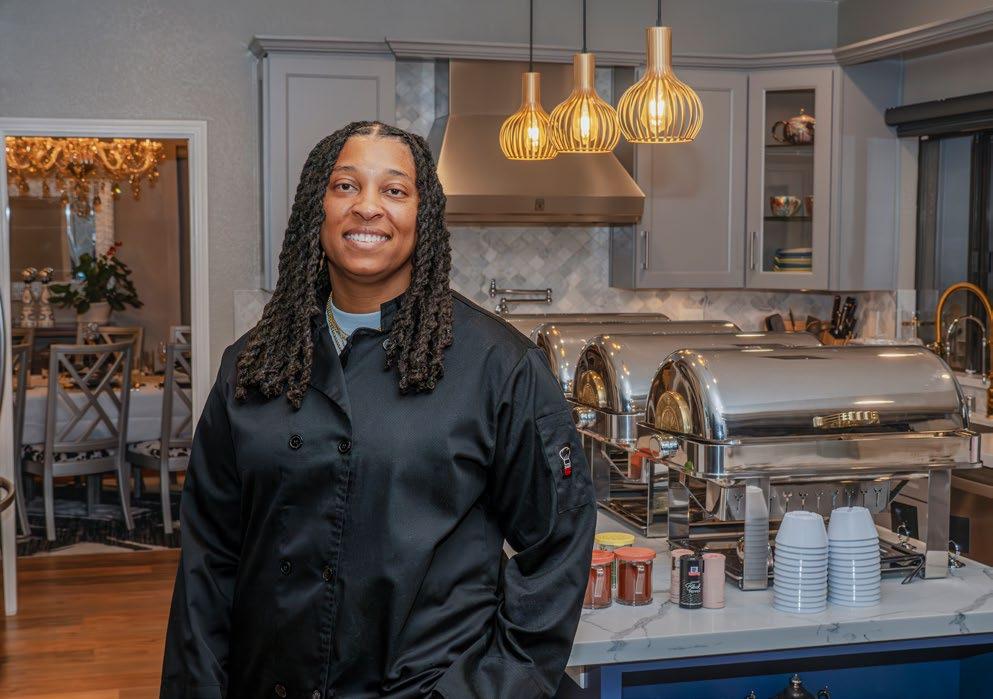
Mercedes Hobson Associate Counsel, IP X Development
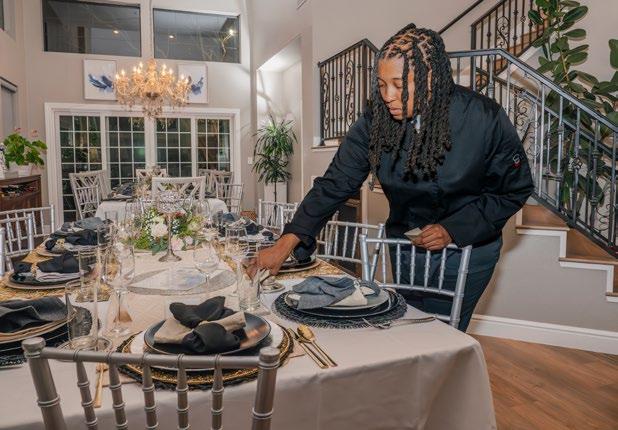
“[My mother] always advised me that I could do anything in the world, but she just wanted me to make new mistakes.”

When Hobson handed her interviewer a reference sheet as she got up to leave, the interviewer asked her if she had waited to play her “ace in the hole” until the last possible moment. Hobson was confused. The first name on her reference sheet was Pamela Krupka, an accomplished IP attorney who had contacted Hobson after seeing the college-aged Hobson interviewed on television during the inaugural Jackie Robinson Day celebration at Dodger Stadium. Hobson was asked during the interview what she wanted to be, and she had replied, “a patent attorney.”
It just so happened that Hobson’s interviewer knew Krupka and knew that anyone who had studied under her would be able to handle the job. IBM would be Hobson’s launchpad into IP, and the full-circle moment never ceases to amaze her.
But why did an accomplished IP attorney like Krupka want to mentor Hobson in the first place? Since the age of seven, Hobson had grown up in the foster care system. Hobson’s mother, who was only thirteen when she gave birth, was unable to care for her daughter but remained in her life. But even at such a young age, her mother had incredible advice for her daughter.
“She always advised me that I could do anything in the world, but she just wanted me to make new mistakes,” Hobson says with a laugh. “She didn’t want me to make the same mistakes she had, and she wanted a better life for me.”
Hobson says her story is full of loving people who chose to embrace her. There was the teacher who saw a young Hobson carrying her notebooks in a plastic sack and got her a new backpack full of materials. There was the school advisor who pushed her to apply to UCLA. There is a reason Hobson belongs at X, and not just
because Google was always the company she had her heart set on.
Hobson belongs at X because she not only is a passionate and accomplished IP attorney but also keeps finding new ways to grow. After taking stock of the lack of diversity in her industry—she quotes the embarrassing statistic that there are more patent attorneys and agents in the US named Michael than there are racially diverse women—Hobson became more involved in Google’s Black Diaspora ERG. Eventually, she stepped up to colead it.
To build more community, Hobson, whose meals are so legendary that she’s opened her own catering business, hosted a cross-cultural food celebration. The event brought ERGs together to celebrate culture and provide those who may have felt they had to split their identities to multiple ERGS a place to feel at home. The Culinary Crossroads celebration was a massive hit, and it’s now become a tradition.
Hobson is actively working to welcome new voices into IP. She says attending the Afro Tech annual conference was one of the most impactful moments of her career, and she can only imagine the kind of inspiration it would have provided her at a younger age.
Hobson’s story is a celebration of so much. Her story can be so much to so many people. She wants anyone who has ever been in the foster system to know that it can be your superpower. Find your mentors. Connect with your community. And keep trying. You, too, could be an IP attorney by day, chef by night, and an inspiration for all.
Botos Churchill IP Law:
“Mercedes is truly outstanding. We are privileged and fortunate to work with an attorney of her caliber.”
–Andrew Zidel & Noelle Cacciabeve, Partners
Tom Yebernetsky is a Navy veteran with a love of all things automotive, and he’s right at home at Ford
By Billy Yost
TOM YEBERNETSKY WOULD STILL SPEND HIS FREE time learning about cars, even if he wasn’t Ford’s lead intellectual property counsel. Whether it’s the car calendars he used to get for Christmas, the collection of toy cars he accumulated as a child, or reading about the latest and greatest innovations in automotive technology, Yebernetsky is a “car guy.”
“Especially right now, as the industry is in such a period of transition, I’m fascinated by power trains going hybrid or EV [electric], fuel cell technology, and the entire user experience of what it means to be inside a car today,” the attorney says. “We’re at this incredible crossroads, and I get to be part of it.”
His current role is worlds apart from his early career as a nuclear submarine officer. Before law school, the electrical engineering graduate (Penn State University)
enlisted and served in the US Navy for five years. He had to learn a lot in a short period of time, including chemistry, mechanical engineering, and nuclear engineering.
“You had to learn fast but also realize that you were learning how to operate a nuclear reactor safely,” Yebernetsky says. “But the nuclear reactor at the back of the submarine was just the beginning.”
In addition to learning the science, a twenty-fiveyear-old Yebernetsky had to learn to lead professionals who had served for decades and were experts in their fields. Earning the respect of those decades older than him ended up being a transferable skill when he left the Navy. He didn’t always have to be the expert, but he made room for those around him to do their best work, respected their craft, and earned their trust in the process.
As transformative as the experience was, a life at sea wasn’t Yebernetsky’s end goal. Nor was law at the time.
“I had a lingering interest in the law,” he says. “But it didn’t necessarily feel like my calling at the time. It just seemed like it was either now or never, so I decided to go for it.”
When Yebernetsky began law school, other law students assumed he would be pursuing patent law, based
“[I]t’s so much fun. It’s the first time in my career I can say that.
I wasn’t ever sure I’d get paid to have fun. But I am here.”
on his electrical engineering degree. Yebernetsky thought it sounded good, but there was one problem. He had little to no idea what they were talking about.
“Everyone around me seemed excited about the idea, and, honestly, that’s what got me to look into it,” the lawyer says. “Maybe they knew something I didn’t, because I did find it interesting.”
In 2012, timing worked in Yebernetsky’s favor when the America Invents Act established the Patent Trial and Appeal Board (PTAB). The alternative venue for patent disputes meant Yebernetsky was suddenly flush with PTAB proceedings and patent litigation. The lawyer says he was granted a depth and variety of work in four years in an area that others would have had to work hard to find.
Coming to Ford was another matter of good timing. Yebernetsky didn't work with a recruiter, and he wasn’t actively looking for a new job. The job posting just popped up online one day, and he knew he’d be perfect for the gig.
“After doing patent litigation for eleven years, I understood that it probably wasn’t what I exclusively wanted to be doing for the next twenty years,” Yebernetsky says. “I was excited by the prospect of going in-house and working for one client. And, frankly, I needed more balance in my life to spend time with my wife and our family. I wanted to take my kids to school or go to their activities without feeling like I was letting someone down. It made sense across the board.”
Since coming to Ford, Yebernetsky has had to surmount some serious learning curves, though, luckily, none of them involved a nuclear reactor. He’s gotten to move into patent and IP policy, areas he never got to handle as outside counsel. Best of all, he’s having a great time.
“Patent law can be interesting, but I never found it all that fun,” the lead counsel says. “At Ford, I get to be part of cutting-edge technology in the automotive industry, and it’s so much fun. It’s the first time in my career I can say that. I wasn’t ever sure I’d get paid to have fun. But I am here.”

Janet Kwuon had just rebuilt her home after a fire when an unexpected opportunity at Gilead Sciences inspired her to lean into even more change
JANET KWUON SAYS THAT WHEN SHE took on her role at Gilead Sciences, she already had a connection to the biopharmaceutical giant. Its medicines saved a friend who was diagnosed with HIV after a prolonged illness. Gilead has been a pioneer and leader in the treatment and prevention of HIV, and Kwuon saw firsthand how its mission transformed HIV into a treatable, preventable, chronic condition for millions of people worldwide.
“Over the course of thirty-five years, Gilead Sciences developed twelve HIV
By Billy Yost
medications and antiviral curative therapy for hepatitis C that have been revolutionary,” Kwuon explains. “That mission always spoke to me, if only from afar.”
Kwuon is just as surprised as any that she wound up as vice president and global head of litigation at Gilead. By all estimations, the career partner at Reed Smith had achieved virtually everything she could hope with a busy practice and as a member of the firm’s executive committee, cochair of the global commercial disputes group, chair of the audit and
talent committees, founding member of the firm’s diversity council and women’s health products group, and director of complex litigation and e-discovery and a member of the finance committee.
The attorney’s practice at Reed Smith evolved from complex litigation and trials in the pharmaceutical, life science, and medical device space to juggling increasingly more complex managerial roles, leading hundreds of attorneys across a wide spectrum of clients, markets, and geographies. What prompted the Reed Smith attorney of
thirty years to go in-house and begin an entirely new chapter at this stage of her career?
There’s the mission, the challenge, and the fire. Not the fire within, but the one that burned down most of Kwuon’s house.
The VP says that her kids rib her about working “the fire” into any conversation. But there’s a reason for that. During the pandemic, a city electrical issue resulted in a fire beneath Kwuon and her neighbor’s houses, burning most of the homes from the inside out. Firefighters had to cut massive access portals through Kwuon’s house to even get to the fire. Each opening let loose a mushroom cloud of smoke and soot previously trapped under the floor.
The entire house was contaminated; there was smoke damage even inside the refrigerator and freezer. Kwuon wasn’t afforded the simplicity of being able to say her house burned down—it just burned.
“We all should have been sleeping while this was happening. Luckily, my daughter is a night owl and woke us up. I stopped nagging her about staying up so late after that,” Kwuon says with a laugh.
Kwuon had to oversee the rebuilding of her home while managing two hundred attorneys. The process took two years, and the attorney eventually had to sue the city to be reimbursed for the damage. The family relocated to multiple temporary housings in the interim, but Kwuon often had to meet contractors, insurance
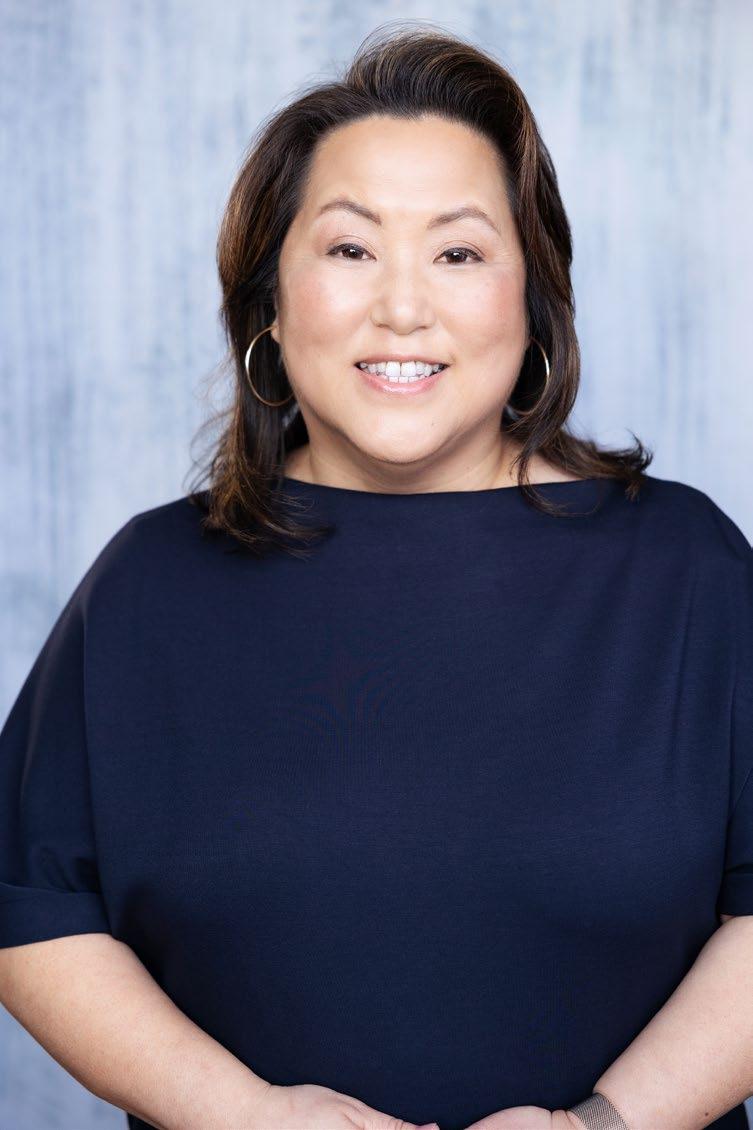
Janet Kwuon VP and Global Head of Litigation & Investigations Gilead Sciences
WilmerHale is pleased to join Modern Counsel in honoring Janet Kwuon, who brings extensive and distinguished legal acumen and strategic vision to her impactful leadership at Gilead

Providing legal representation across a comprehensive range of practice areas that are critical to the success of our clients.
wilmerhale.com
Janet Kwuon has a long and storied career across multiple law careers, from representing the People of the State of California as a trial prosecutor at the Los Angeles County District Attorney’s office to clients as a long-running partner in a firm. The Gilead VP says that young lawyers are best served by keeping an open mind about how our access to justice enables us to advocate on behalf of people and principles. You never know how that is going to lead to your next passion.
“There are so many ways we can apply our training and skills to simultaneously support our legal system with integrity while advocating for our clients,” Kwuon says. “My career decisions were not strategically mapped out. Instead, when certain opportunities resonated, I was able to pivot toward a new experience.”
adjusters, and city officials on-site. Kwuon sat in her backyard working early morning hours in the dark, with no electricity or power, and an extension cord running to her neighbor’s house.
“There were things that had to get done,” Kwuon says. “So, there I was, waiting for a city inspector to come, working away in the backyard or garage.”
The same qualities that made Kwuon an indispensable people manager at a law firm, her strategic decision-making superpowers on top of exemplary legal practice, also got her through the most trying experience of her life. Kwuon was the one in charge of advocating for her family, rebuilding her home, and ensuring that her daughters were able to continue their education uninterrupted at a time when the pandemic was interrupting everything.
It was a transformative moment for Kwuon. Just as her home was finally complete, with the wallpaper as the finishing touch, she got a call about a role at Gilead.
“It coincided with my youngest child getting launched into the working world,” Kwuon says with
a smile. “Everyone was where they needed to be, and I suddenly could look at life a little differently. I didn’t have the same obligations as before. Gilead Sciences was a company I had admired from a distance for a long time, so I came up here to interview and check out the San Francisco Bay Area campus.”
After meeting General Counsel Deborah Telman and CEO Daniel O’Day, Kwuon says she was surprised by how much she wanted the role. Her justifiable reticence to leave her firm, to leave the house she just rebuilt, and to go in-house was immediately turned on its head. Curiosity became excitement, and trepidation became opportunity.
“What got me immediately was the way that people talk about the mission here,” the VP explains. “That mission-driven focus was inspiring. From the litigation perspective, we’re always trying to communicate our commitment to develop innovative and transformative medications for all people. That is what we do here. That motivates me.”
“It is inspiring to see Janet’s passion for Gilead’s mission and her commitment to incorporating it into all facets of her exemplary litigation counseling and business strategy,” says Jay Lefkowitz, partner at Kirkland & Ellis. “Kirkland is honored to partner with Janet in furthering this mission and looks forward to our continued collaboration in the future.”
Kwuon says from the legal vantage point, she still gets to be a part of the many medical breakthroughs, including further advancements in HIV treatment and prevention and oncology.
The VP says her years in big law have served her well, particularly when it comes to leading high-impact litigation with Gilead’s bench of excellent outside counsel. She has an implicit understanding of how to weave and maximize the partnership across two different organizational structures. It often includes frequent and direct communication.
“I’m grateful for my years at Reed Smith because of the variety and depth of practice and the opportunity to help lead the firm
Kirkland & Ellis is an international law firm serving a broad range of clients around the world in high-stakes commercial and intellectual property litigation; private equity, M&A and other complex corporate transactions; investment fund formation and alternative asset management; restructurings; and white collar and government disputes. We offer the highest quality legal advice coupled with extraordinary, tailored service to deliver exceptional results to our clients and help their businesses succeed. We invest in the brightest legal talent and build dynamic teams that operate at the pinnacle of their respective areas.
Renowned for our experience in complex litigation, our clients rely on us to anticipate their needs and outperform their expectations. We believe that the best litigation results—whether achieved in court or across the bargaining table— occur when the lawyers are fully prepared to try the case through verdict. We represent clients in trial and appellate courts at the federal and state level, before administrative tribunals, in arbitrations and other dispute resolution proceedings, and in connection with proceedings involving government agencies, and our lawyers have tried cases successfully to verdict or judgment in virtually every business segment and substantive area.
Please see kirkland.com for more information.
“The law interested me because its focus seemed to be the pursuit of justice, equity, and representation so that all people can have a voice.”
while managing many lawyers with their own disparate practices,” Kwuon says. “It enabled me to step into this role, which covers the entire span of all of our litigation and investigations, including areas that are beyond my former wheelhouse.”
“Throughout her career, Janet has worn a variety of hats. She has been a strategist, a pathbreaker, a litigator, and a gifted team leader,” say Dave Bassett, Ron Machen, and Vinita Ferrera, partners at WilmerHale. “In her role at Gilead, she combines all these attributes, and it is a privilege to work with her as outside counsel.”
Kwuon was pushed to fight for fairness from a young age. The second-generation Korean American was born into a culture that didn’t place the same value on gender equality as the country she was growing up in. The middle child felt the push-pull of her upbringing and the changing cultural norms around her.
At the same time, Kwuon was growing up as a minority in Los Angeles. Being an American of Korean descent didn’t come with the same cultural awareness of today. She was simply from somewhere else, despite being born in the US.
“The law interested me because its focus seemed to be the pursuit of justice, equity, and representation so that all people can have a voice,” the VP says. “I didn’t know any lawyers, but it felt like what I was meant to do.”
Kwuon was ultimately the first diverse woman in the US elected to her law firm’s executive committee. The VP’s daughters, a lawyer and a city planner, respectively, have grown up seeing a mother who had achieved big-law success on a massive scale. They’ve seen a mother who shouldered all of those responsibilities while rebuilding a home. And now they’ve seen a woman chasing a new beginning.
The lawyer’s hardest question to answer is what her biggest challenge is in the days to come. It’s not about getting through a traumatic event or navigating her new career. It’s how she spends her free time.
“I’ve spent so many years working and also being the point person for my extended family,” Kwuon says. “I suddenly have a little more time in my life, and I need to think about what that means for me. I have to spend the next few years learning how to unplug a little more often. As an employer, Gilead Sciences places a priority on its people having more balance in their lives, and it’s honestly something I’m going to have to focus on to get good at.”
Kwuon can manage rebuilding a house more easily than relaxing in one. That tracks.


Vice President, Global Head of Litigation and Investigations at
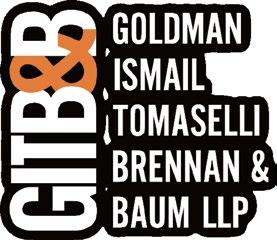







Showcasing prominent in-house attorneys who capably adapt to changes in their companies, industries, and personal and professional lives to carve out new paths through imagination and reinvention change in their
Chadwick T. Holeman provides legal guidance to various departments at Devon Energy in Oklahoma City. The path to get there was both unconventional and rewarding.
By Zach Baliva
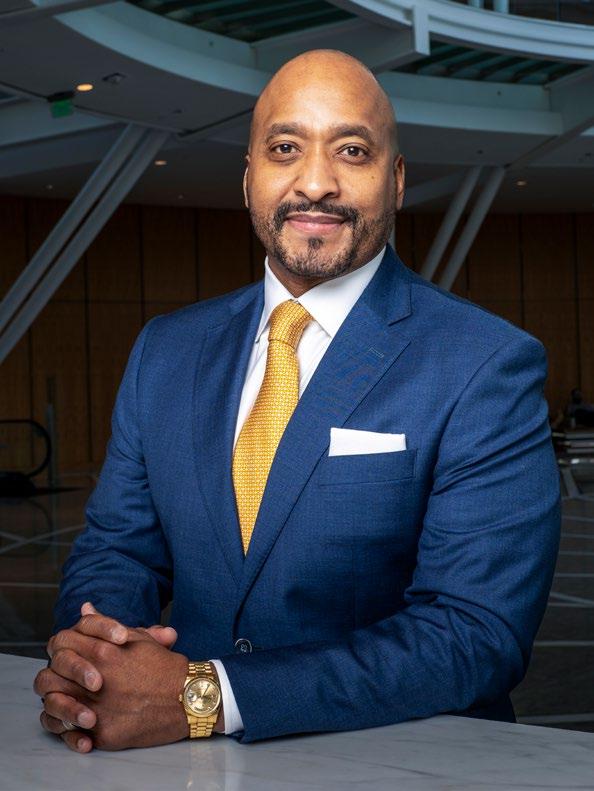
AS SENIOR COUNSEL, CHADWICK T. HOLEMAN currently draws on his knowledge and experience in intellectual property, commercial real estate, privacy, public and government affairs, aviation, and new ventures to support Devon Energy managers. His journey demonstrates how calculated risks and an unwavering dedication to self-improvement can transform a career one leap of faith at a time.
Holeman’s first leap of faith came early. His father’s job in Houston’s oil and gas industry required the family to relocate first to Louisiana and later to Indiana and Kansas to take advantage of career advancement opportunities. With each move, Holeman learned to adapt to new experiences and embrace uncertain outcomes.
“Relocating a lot in childhood made me adaptable and taught me to be comfortable meeting new people, navigating any environment, and expanding my perspective,” he explains.
After graduating from high school, Holeman majored in business administration with a concentration in management information systems at the University of Houston. While the coursework both challenged and inspired him, it was also his time spent on the gridiron as a college athlete that further enhanced Holeman’s values of teamwork, accountability, and discipline.
As college progressed and Holeman’s athletic dreams gave way to reality, he channeled his energy into completing his education and preparing for a career. He graduated in 2000
and worked as a contract consultant at Robert Half International until taking a full-time position with Ocean Energy.
In the accounting department, Holeman worked to “put a tech fingerprint” on the company’s accounting practices. By the time Devon acquired Ocean in 2003, Holeman was ready to take another leap of faith—returning to school to earn an MBA in finance and energy risk management at his alma mater.
After transitioning from accounting to information technology, Holeman pursued another opportunity in project management by taking a business analyst/project manager role. There was just one catch—the job was in Oklahoma City. It was time for another leap of faith.
Holeman took an exploratory trip to the “Big Friendly,” a nickname the city earned for its authenticity, openness, and kindness, and ultimately accepted the new role in Devon’s corporate office.
Devon, a Fortune 500 company, is part of the S&P 500 Index; its common shares trade on the New York Stock Exchange under the ticker symbol DVN.
Holeman spent six years managing projects and optimizing strategic processes for several Devon departments. Meanwhile, he earned a Lean Six Sigma Black Belt certification from the University of Oklahoma.
Interacting with colleagues in various operational business units, legal, internal audit, and risk management inspired Holeman to consider law school. Holeman
Chadwick T. Holeman Senior Counsel
Devon Energy

concluded that pairing his technical expertise with a legal education would broaden his career opportunities. In 2008, he enrolled at the Oklahoma City University School of Law and completed the Juris Doctorate in less than four years while working fulltime and clerking for a local law firm each summer while in law school.
JD in hand and passing the bar, Holeman joined Devon’s legal department in 2012. He refers to the past thirteen years as the most gratifying of his career, including being mentored by colleagues along the way.
“Change brings a balance of exhilarating and terrifying emotions because the unknown is always
challenging and change is always difficult,” he says. “But I’m happy that all the leaps I’ve taken have led me here, where I can continue to add value and unlock new opportunities.”
A lifelong learner, Holeman finished an LLM degree from the Antonin Scalia Law School at George Mason University that enhanced his exper-
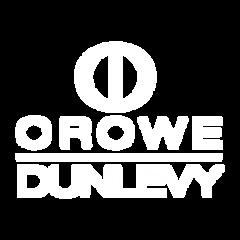
tise in global antitrust law and economics. As senior counsel at Devon, he provides legal advice to the various departments he supports—all with a client-centric approach.
Deeply committed to serving the underprivileged and the underserved, Holeman has been affiliated with a number of nonprofit organizations over his career. He is proud to have served and supported Make-AWish Oklahoma, Junior Achievement of Oklahoma, SSM Health St. Anthony Foundation Board, Leukemia & Lymphoma Society, Regional Food Bank of Oklahoma, Urban League of Greater Oklahoma City, the Oklahoma Energy Resource Board, is a member of Leadership Oklahoma City’s Class 32, and was recently appointed to the University of Oklahoma’s Advisory Board for Customer Experience.
While many risks, chances, and opportunities have fueled Holeman’s career, his faith, parents, family, and mentors have kept him grounded. “I would never be where I am today without all of these positive forces in my life,” he says. “I’m especially grateful for the love and guidance I received from my parents, who were always there to support and even nudge me whenever it was time to take another leap of faith.”

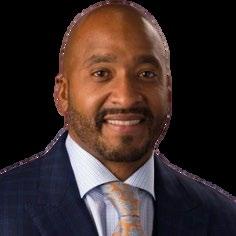

Ala’a Wafa explains why she chose to remain at a company she only intended to be at for two years
By Billy Yost
“I think if you talk to anyone here, you will hear about how active Cummins is in its communities. It’s just a part of being at Cummins.”

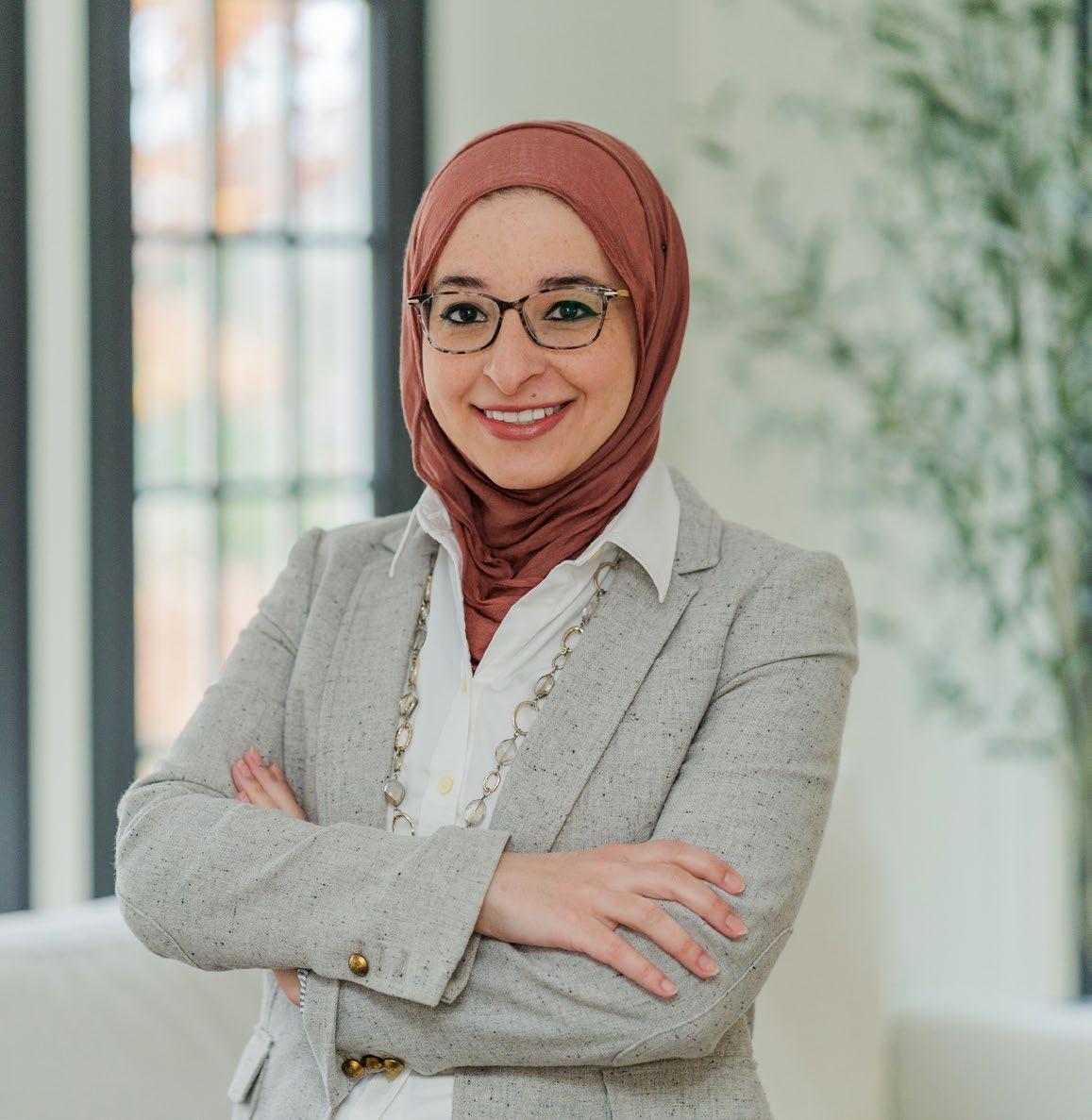
Ala’a Wafa Corporate Counsel of Labor & Employment Cummins Inc.
ALA’A WAFA DIDN’T PLAN TO BE at Cummins Inc. for long. In 2010, she was graduating from law school and the US economy was in a downturn. Offers her friends received from prospective firms were being rescinded; finding a legal job Wafa would love now seemed impossible to her. To be safe, she applied for a range of jobs, both in and out of the legal field.
The following year, Wafa accepted an offer from Cummins for a Six Sigma Black Belt role—essentially a project manager to the nth degree. She envisioned a two-year stint with the company before leaving to obtain legal experience elsewhere, as she had been told that a background in private practice was necessary to landing an in-house role.
Having gotten to know Cummins’ legal team as a Six Sigma Black Belt and impressing then General Counsel Sharon Barner, she proved her aptitude to work alongside them. But the legal department had historically lacked the capacity to train a fresh lawyer—until she told Barner about her plan to leave.
A recent shake-up in the executive team led to an unexpected opportunity: a chance to join the legal department. Wafa didn’t have private practice experience, but Barner gave the recent law school graduate a chance.
“I’ll never forget it,” Wafa says. “She said, ‘New leadership, new philosophy. If you take a chance on me, I’ll take a chance on you.’”
“[The general counsel] said, ‘New leadership, new philosophy. If you take a chance on me, I’ll take a chance on you.’”
Nearly fourteen years and two promotions later, Wafa remains a committed member of Cummins’ legal team, and her reasons for staying are as varied as the roles she’s held.
It seems unlikely that Wafa, a lifetime social and human rights activist, would feel so welcomed at a global power solutions company that sells products ranging from advanced diesel and natural gas to electric and hybrid power trains. But Cummins shares Wafa’s dedications.
Having served in the US Senate early in her career as the first Muslim
American Senate staffer wearing the hijab (a Muslim head covering) and being the granddaughter of Palestinian refugees, Wafa spent much of her time working to build bridges between people of different faiths and identities. She envisioned herself in a legal career that combined this passion with the law and was pleasantly surprised to learn of Cummins’ history and involvement with social justice.
“Very early at Cummins, I learned that a former Cummins CEO, J. Irwin Miller, had helped plan the March on Washington with Martin Luther King
Jr.,” Wafa recalls. “Cummins pulled out of South Africa during the apartheid. They also threatened to pull out of Indiana if homes weren’t sold to African Americans during the civil rights movement. I was blown away by their dedication to social justice.”
Wafa began taking part in Cummins’ community and social justice initiatives, finding new ways to bring people together, celebrate their backgrounds, and reach out to the communities in which Cummins operates. In 2016, the Columbus Human Rights Commission recognized Wafa for her contributions to the community by awarding her the William R. Laws Human Rights Award.
“I think if you talk to anyone here, you will hear about how active Cummins is in its communities,” Wafa says. “It’s just a part of being at Cummins.”
Wafa says another reason she’s stayed is the sheer amount of investment others have been willing to give in her own growth and development. As she has built out new capabilities, she’s been offered new challenges and responsibilities. When she first joined the legal department, Wafa was given the opportunity to move around to different practice areas every few months to gain more in-house experience. Then she was allowed to pick her area of expertise, which happened to be the opposite experience her law firm colleagues were having.
Through a mentorship program at Cummins, Wafa was also paired up with the company’s CEO for a year, getting to meet regularly and learn about one another. She says the mentorship was extraordinary and, yet again, reaffirmed her belief in the organization and its leaders.
Wafa is now experienced in labor and employment law as well as intellectual property law. She recalls being the lawyer with no firm experience who, after years of hard work, earned the responsibility of managing a global trademark and anticounterfeiting portfolio for a multibillion-dollar company.
In 2019, Wafa elected to move back exclusively into labor and employment law. She says it’s a place where she feels empowered to use the law and common values at Cummins to help its employees.
Wafa found a true rarity at Cummins, a company that genuinely practices what it preaches and remains committed to values that are lived by employees around the world. In Wafa, Cummins found a legal sponge, a committed activist who wants to make her world a better place, and the kind of person who belongs on the team.

By Billy Yost
STEVE HECKLE, VICE PRESIDENT OF RISK management at LKQ Corporation, is someone you’d look forward to grabbing a drink with after work. But don’t let the humility, humor, or gratitude he expresses for his teams fool you. Aside from being likable, Heckle is good at what he does.
Heckle was reporting to the CEO of Keystone Automotive when LKQ acquired Keystone in 2007. Heckle was intrigued by LKQ’s business model and their growth plans—plans that would ultimately catapult the company into the Fortune 300 and make it the largest auto recycler on the planet. Heckle made his pitch to LKQ management to stay on board to build a risk management function.
“I wanted to stay and be part of that growth strategy,” Heckle remembers. “I told them what I had already accomplished for two other large public companies. I highlighted some of the
big casualty exposures I could see at LKQ that I felt I could bring substantial value in managing.
“Basically, I had a willingness to get on board with LKQ and help them achieve their objectives. I felt I could help build a strong risk management foundation to assist for the future they wanted to achieve. They took me up on it, and I’m thankful to this day that they did.”
That was seventeen years ago. Heckle says he’s stayed because of the company’s culture, pace of growth, complexities, challenges, and evolution. He’s built a high-performing risk management team—a task he’d done multiple times. Heckle also got involved in LKQ’s highly acquisitive growth plans, including aiding the due diligence team on many
“I’m one of those businesspeople who just happens to have a law degree.”
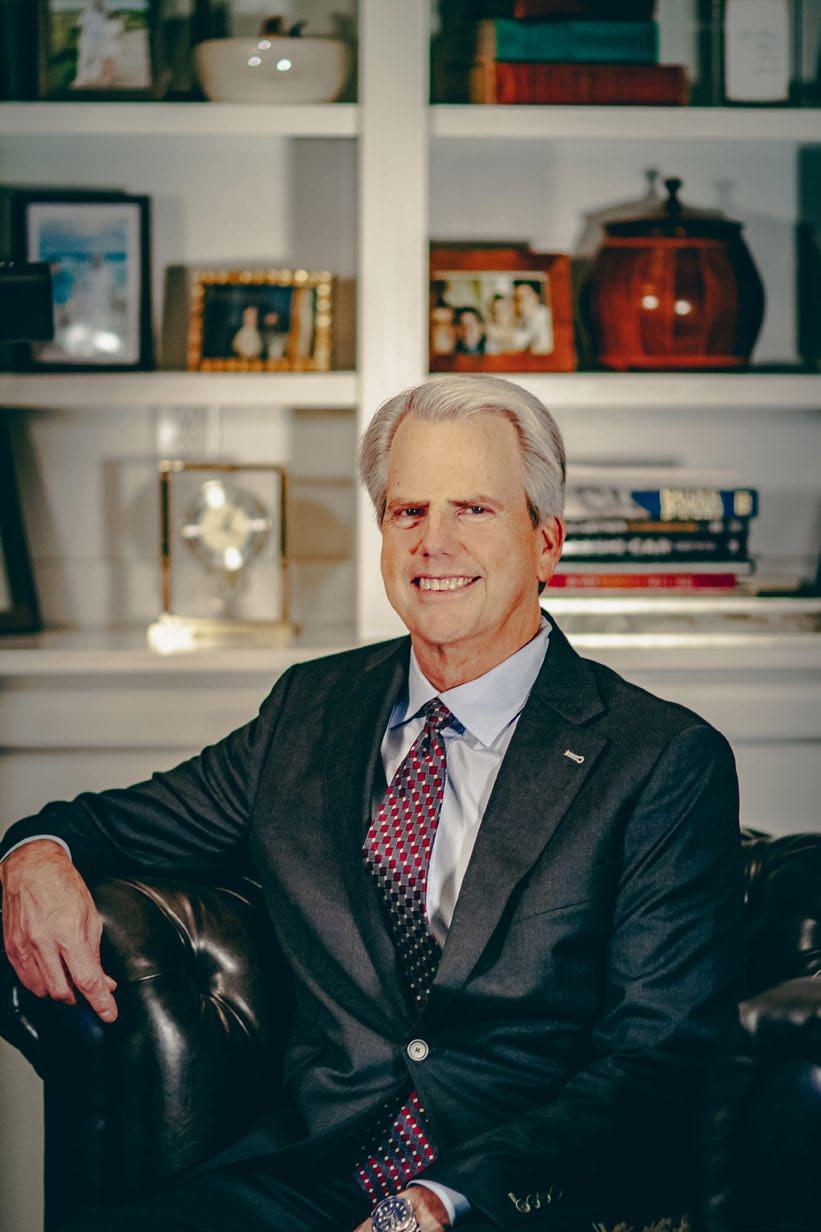
Steve Heckle VP of Risk Management LKQ Corporation
“[I]t comes down to willingness. I may not be an expert in it, but I am willing to get involved and work with a team, leaning heavily on their expertise to explain things to me, as I am not afraid to ask the dumb questions.”
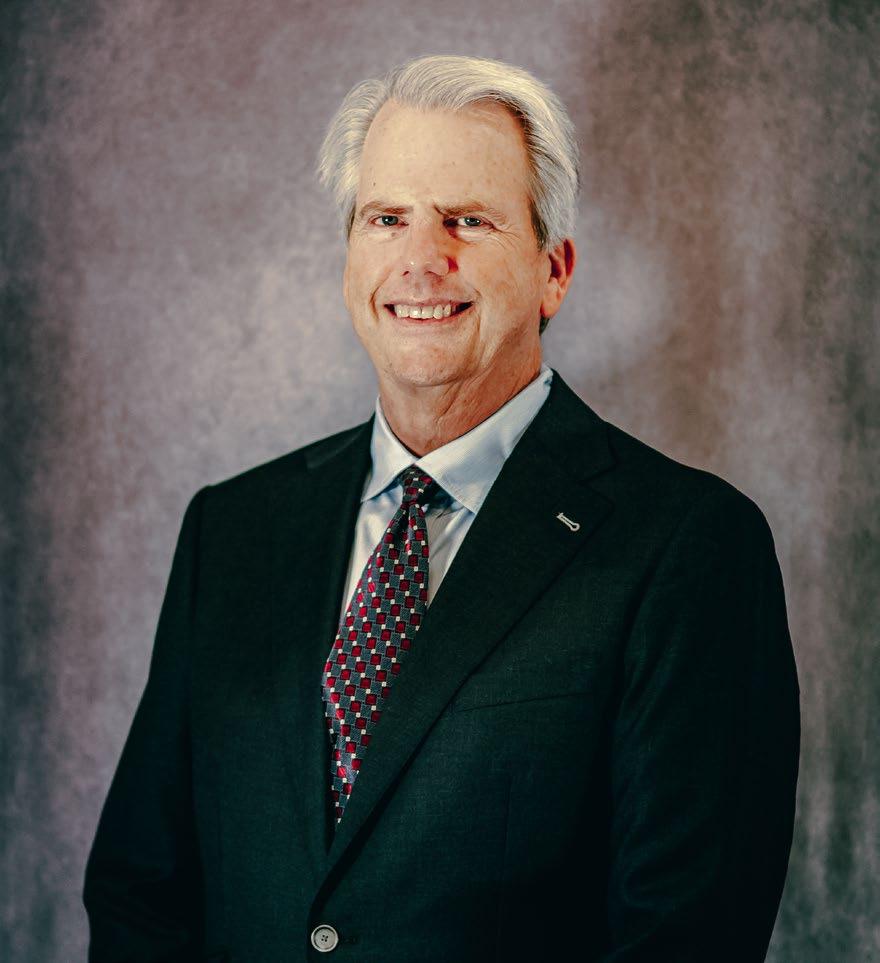
acquisitions providing guidance and support evaluating insurance and risk matters. When the company expanded to Europe in 2011, Heckle had to learn new European insurance structures and how to be effective on a global scale.
“I had a boss back in the day who essentially told me that I seem to thrive when the demands are heavy or the world’s on fire,” Heckle says, laughing. “I actually prefer things not burning, but I do enjoy the challenge of bringing order to chaos, developing strategy, and then executing upon it. That has led to me being placed in leadership roles for numerous departments well outside of a traditional risk manager’s responsibilities.
“But when I consider it, it comes down to willingness. I may not be an expert in it, but I am willing to get involved and work with a team, leaning heavily on their expertise to explain things to me, as I am not afraid to ask the dumb questions. And it’s worked out all right so far,” he says.
“Worked out all right” is an understatement. Heckle was at Dollar General during some of its early hyperexpansion years. Dollar General put him in charge of numerous departments outside of his core in risk management, such as corporate benefits and human resource information services.
Heckle says he had never actually logged into the HR system before that moment. But the team needed a turnaround strategy to support the rapidly growing headcount. “The existing department team members were great. They just needed help formulizing a clear path forward and someone to help them knock down barriers for their success,” he says.
In another situation at Dollar General, “there were two support departments that had some overlap in tasks, but not much collaboration occurring. It made sense to cross train each team to in essence make two teams into one to drive efficiencies,” the VP remembers. “There was literally a wall that separated the two departments. We decided to take it down and the day we did was a celebration for the entire now one collective team. That physical barrier removal was part of our strategy to move forward with one united team.
“At the same time, I readily admitted that I didn’t know the specifics of their jobs. But I was willing to
listen. If you ask people what’s wrong, how can we improve, what obstacles have you faced, etc., and you stop to listen, they’ll tell you,” he says.
There are other things you need to know about Heckle. He doesn’t call himself a lawyer despite having earned his degree and license years into his career. He worked full-time at Dollar General and attended the Nashville School of Law at night. With a wife and four kids at home, this is quite an accomplishment. But Heckle doesn’t exactly see it that way.
“I wasn’t home a lot during those school years, and I still feel bad about it,” the VP says. But it places Heckle in a unique position when asked what advice he might have for those considering law school.
“My career started off as a claims adjuster with an insurance company, and I enjoyed handling claims, e.g., the investigations, the negotiations, etc. I moved into a complex claim and litigation unit which got me exposed to litigation and near daily interaction with defense counsel working on case strategy.
“Since then, every company I have worked for as a risk manager I have remained heavily involved in overseeing casualty type claims made against my employer such as premises liability, auto/truck, and product liability claims. I am a strong believer in proactive dispute resolution, including mediation, and have attended hundreds of mediations throughout the country working to resolve disputes. Having the legal training has proven very valuable in this area as I am constantly working with our claim administrator and defense counsel on case strategy,” he says.
“I’m one of those businesspeople who just happens to have a law degree,” Heckle says.
“My law education was incredibly interesting and has helped me in my career tremendously. With that in mind, I still don’t know if I’d eagerly tell anyone that they need to go to law school unless they’re passionate about it and have clarity around what they aim to gain from it. Look at the skills you can learn, and don’t box yourself in. That may mean law school, and it may not,” he says.
There is so much ahead for the VP. His team has brought new technology installed in LKQ’s North American large fleet of trucks to improve delivery driver behaviors while reducing accidents and the
CCMSI is proud to join in recognizing our partner, client, & friend
of
Proudly providing quality claim services to large, nationally known & highly respected self-insured clients like LKQ since 1978

When it comes to protecting what matters most in business and everyday life, at McGriff we believe no one should settle for less than the best.
Visit McGriff.com or contact:
Executive Risk Advisors (ERA)
Bob Jackson
Executive Vice President
404-497-7555
bjackson@McGriff.com
Kieran Hughes
Executive Vice President & Senior Claims Counsel
917-741-1512
kieran.hughes@McGriff.com

defensibility of claims stemming from accidents. That technology opens up a whole new range of interesting risk management questions for Heckle to ponder. But more than anything, his job still comes down to the basics.
“We want to be good neighbors in the communities in which we operate,” Heckle says. “For me, that means being the face of the company following a significant event or mediation stemming from a claim. It means something to me to speak face-to-face with people whose counsel may have painted us in a particular way. I’m there to represent LKQ and of course advocate our position, but as openly as possible, with a sincere intent to resolve matters if possible while letting them know we’re there to do the right thing. Often, that direct but open approach results in a very favorable outcome for LKQ.”
You believe Heckle. After all these years and all the skills that he’s acquired, his willingness and openness may be his most viable assets.
CCMSI:
“Steve is the consummate professional. His understanding of the law and risk management has made him a leader in his field. One of Steve’s greatest assets is his ability to apply his comprehensive knowledge into real world solutions while leveraging his elite negotiation skills. He is by far the best negotiator that we’ve ever met!”
—Jim Demeniuk, Account Manager, and Dave Henwood, Regional VP
By Billy Yost
EVERY FIVE YEARS OR SO, ASHLEY HILL REINVENTS herself, demonstrating her desire to keep learning and growing. In college, she switched from a chemical engineering major to English literature with an emphasis on theater. After five years of intense oil and gas litigation straight out of law school, Hill thought nothing of effectively restarting her career by switching to employment law.
“I had built a strong foundation in commercial litigation, gaining extensive experience in cases where companies mainly sued each other over money,” Hill says, laughing. “I decided to shift directions and expand on that. I wanted to focus more on how companies treat their people.”
After five more years as outside counsel as an employment lawyer, Hill realized she could be more
“I’ve spent a lot of time reflecting lately, and I have everything I’ve wanted in life. It’s not millions of dollars, but I really like my job and my career. I have two healthy kids I love spending time with, I have a wonderful husband, and I’m just glad to be where I am.”
Ashley Hill Lead Counsel, Litigation & Employment
Woodside Energy

effective in-house. The cases she was taking on had reached a point of no return. She wanted to intervene earlier in the process so organizations could avoid costly litigation.
“I would see these issues where I wanted to point out, ‘Had you treated this employee better at this point and this point and this point, we wouldn’t be here,’” Hill remembers. “I knew that if I was going to go in-house, it had to be somewhere that had a culture of care for its people, that was employee focused, and that’s what I found.”
Hill came to what was then BHP Billiton in 2016, and a massive merger between that organization and Woodside Energy followed in 2022, prompting her to adjust the way she engaged with her new internal clients and colleagues.
Because Hill serves as litigation and employment lead for the Australian-based Woodside Energy, bridging the gap between US and Australian business practices has required Hill to act as an educator for a process that can seem outlandish to those outside the United States.
“Since I handle all litigation in the North American and Caribbean regions, I sometimes have to justify why we have so much litigation, because plaintiffs’ lawyers work for contingencies here,” Hill says. “Representing someone for free and then taking 40 percent of their recovery is not a model that is common in Australia. With commercial disputes, I explain that having a lawsuit filed against your company in the US isn’t necessarily because you’ve done anything wrong. It’s often a business tactic.”

The Greatest Role of Her Life
At the same time, Woodside Energy continues to grow. The company recently acquired the Beaumont New Ammonia Project to create a facility that will ultimately generate ammonia with less than 35 percent of the life-cycle emissions intensity of unabated ammonia, according to the EU proposed standards calculation method for carbon intensity. With global demand for ammonia expected to double by 2050, evolving decarbonization policies will likely make lower-carbon ammonia a prized asset.
Woodside is also expanding in the liquified natural gas space, an area in which Hill has worked hard to educate herself. The company acquired Tellurian Inc. in October 2024, and Hill had another steep learning curve when she was asked to become involved in the M&A transaction and afterward, business integra-
Ashley Hill’s passion for the theater extended well into her collegiate career, but when she went to law school, it seemed like a life onstage may have gone by the wayside. That was until Hill, barely a baby lawyer, found herself thrown into a five-day trial where she would be lead counsel.
“Right before opening statements, I was in the bathroom pacing back and forth, wondering how I was ever going to get through this,” Hill remembers. “I had been a lawyer for six months, and now I was supposed to get through a trial.”
In that moment, Hill had to fall back to her roots and to do what felt natural—to play a part. Hill decided she was going to play the biggest role of her life: a capable and veteran lawyer who won her case.

“I knew that if I was going to go in-house, it had to be somewhere that had a culture of care for its people, that was employee focused, and that’s what I found.”
tion. As Woodside expands as a company, Hill looks forward to growing alongside with it.
“When I’m eager to explore new areas of the law or learn new industries, I’ve found that being in-house offers the best opportunities for that. And Woodside’s growth has me excited for the future.”
And so—despite her capacity for reinventing herself—Hill likes like being in-house, where she can build out new areas of expertise. More important, the lawyer is content with her life.
“I hope this doesn’t sound conceited because that’s not what I mean,” Hill begins. “But I’ve spent a lot of time reflecting lately, and I have everything I’ve wanted in life. It’s not millions of dollars, but I really like my job and my career. I have two healthy kids I love spending time with, I have a wonderful husband, and I’m just glad to be where I am.”
Liskow & Lewis:
“I’m thrilled to see you recognized for your incredible leadership and success. I’m grateful to work with someone who shows up every day with such positivity and heart—you inspire me to do the same.”
—April Rolen-Ogden, Shareholder at Liskow
By Billy Yost
LOOKING BACK, MEREDITH CARLO JOKES THAT she didn’t wind up too far from the rest of her family, though it sure seemed like it at the time. Carlo was the sole lawyer in a family of engineers. The youngest of three watched her two brothers follow in their father’s footsteps, while Carlo was always marching to a slightly different beat.
But “technology ultimately found me,” jokes Carlo, vice president and associate general counsel for platform and enterprise products at Fidelity National Information Services (FIS). “I’ve been a tech-focused lawyer for almost all of my career. I just got there a little differently than the rest of my family.”
Carlo came to the globally operational Fortune 500 fintech company in 2020 and has been promoted twice to her current position. This achievement is impressive for any in-house attorney, especially one who restarted her career at forty.
From the outset, Carlo knew she was going to be a lawyer. That determination pushed her from James Madison University to Harvard Law and then to law firm Morgan, Lewis & Bockius, where she spent nine years. The lawyer thought she wanted to pursue employment law, but when she encountered the firm’s trademark and technology group, the subject matter came alive.
Her practice coincided with the entire world slowly moving onto the internet. Every day, Carlo found herself trying to apply traditional laws to technology that no one had ever dreamed of at the time of legislators’ writing. Having to grapple with these complex ideas straight out of law school may shed some light on
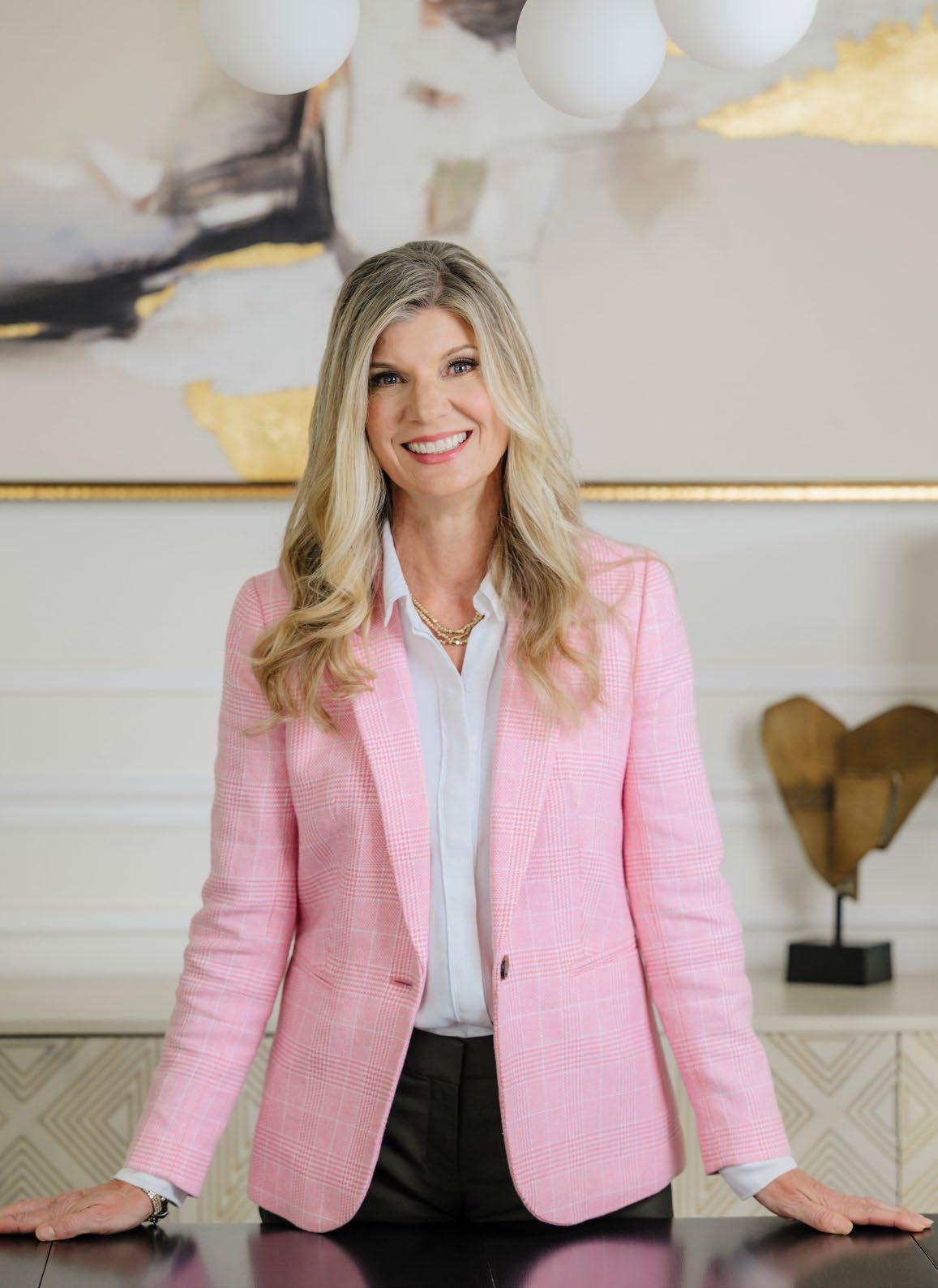
Meredith Carlo VP and Associate General Counsel, Platform & Enterprise Products Fidelity National Information Services
“I couldn’t pass up the opportunity to apply [to FIS]. It was everything I love: software, technology, contracts, and applying existing concepts and laws in a brand new way.”
how Carlo’s nontraditional work path has still been so successful.
While at the firm, Carlo married and started a family. When her third child was born, she and her family moved from the DC area to Jacksonville, Florida, where they knew absolutely nobody. Carlo settled down to raise her children, the oldest aged seven. Carlo fell in love with the city, but her marriage ended shortly thereafter. At the age of forty, Carlo was not licensed to practice law in Florida and had to restart her career.
So she took and passed the Florida Bar. And while taking care of three kids, she found an esteemed small law firm that took her on part-time. A few years later, Carlo and a friend opened
their own successful title business. She enjoyed practicing law and running her own business, but then a friend alerted her to a job opening at FIS.
“I couldn’t pass up the opportunity to apply,” Carlo says. “It was everything I love: software, technology, contracts, and applying existing concepts and laws in a brand new way.” Her hiring coincided almost exactly with the COVID19 pandemic shutdown of 2020. She became the first FIS lawyer onboarded entirely remotely.
The role has been everything she hoped for, requiring her to put all her legal experience, from one of the largest law firms in the world to her own operation, to work. The VP says working for a truly global company, one with over
57,000 employees in 61 countries, is the kind of challenge she relishes. It’s afforded her the opportunity to meet and develop relationships with people all over the world. It’s also required her to continue to expand her capabilities.
Case in point: FIS chose Carlo to lead business legal for its platform and enterprise products division. The business was brand new, so much so that Carlo jokes she had to explain to every person inside FIS what her new business line was for her first six months in the role. Carlo built out her team over 2024 and says that though the process required a lot of work, she loved it.
The same can likely be said about being a mother. At the moment, Carlo’s children are either in college
Congratulations,
Meredith Carlo, VP, Associate General Counsel at FIS.

Meredith, we’re honored to support you and celebrate your success. Here’s to your continued impact and leadership!
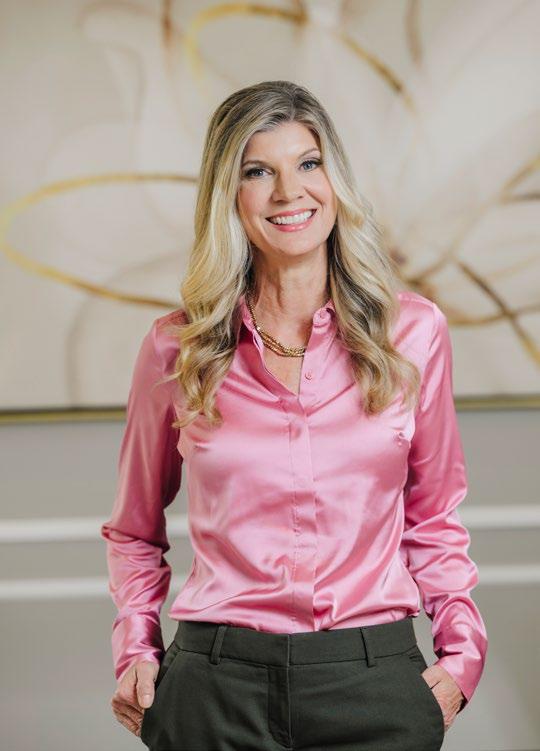
or early in their careers. Carlo calls them her greatest achievement.
“I hope they would consider me their rock,” Carlo says. “My goal was to raise good human beings. They’re wonderful, but they did that on their own. I tried to model good behavior and show them the value of hard work and humility.”
With her children grown, Carlo has started traveling more, which wasn’t much of a possibility when her kids were younger. Also, as a new “empty nester,” the lawyer says she’s now focused on “building my own house.” It’s a chance to start something new yet again.
“My goal was to raise good human beings. They’re wonderful, but they did that on their own.”
Families and formative experiences helped six leaders realize that a legal career was destined since childhood

Mona Thakkar
Alan Bowie
Willie White
Mona Thakkar leverages her background in advertising law to help lead Volkswagen Group of America’s Office of General Counsel
By Billy Yost

“The entrepreneurial spirit toward solving problems, the true partnership between the legal and business teams, and the company’s commitment to its customers were very motivating.”
By the time Mona Thakkar was in her teens, she was already providing the best legal counsel a high schooler could offer. The deputy general counsel at Volkswagen Group of America grew up helping her parents, Indian immigrants who worked to provide a better life for their children. Her dad immigrated to the US as an engineer but aspired to become a business owner. Eventually, her parents acquired a laundromat and, later, a Baskin-Robbins franchise in Knoxville, Tennessee. She carries that perspective as a franchisee and small business owner to her current role at Volkswagen Group of America.
When she wasn’t studying, counting quarters, or dishing up ice cream, Thakkar was helping her father with understanding business contracts and franchise rules, as he was not a native
English speaker. “My dad would ask me to read contracts with him and to help him understand them better, and then ask me for my advice,” Thakkar remembers. “It put me in the shoes of being an advisor to my parents early on.”
Distilling complex legal concepts and knowing your audience are skills Thakkar believes are absolutely necessary to succeed as an in-house attorney. She is grateful to have been exposed to them early in her life.
Before coming to Volkswagen Group of America in 2012, Thakkar’s first in-house stint was with membership buying service DirectBuy, a franchising company. There, Thakkar joined a legal department of one and got a fast-tracked education in consumer litigation and franchise law.
Thakkar’s supervisor and mentor, Joe Yast, general counsel of DirectBuy, was consumed with
handling the company’s extensive litigation portfolio, which included defending multiple false advertising class actions at the time. These cases had the potential to significantly impact the company’s franchise operations. Thakkar had to quickly adapt from being a commercial litigator to counselorin-chief, becoming a business and legal partner to the business and an expert in new areas of law.
“On my second day of work, Joe walked into my office, handed me a few treatises, and said I was going to learn all about advertising law and franchise law,” Thakkar remembers, laughing. “I did not have a background in either, but that’s exactly what I did, with the support of some outstanding outside counsel.”
Part of Thakkar’s success in helping get the organization’s house in order, she says, came from her ability to connect with the
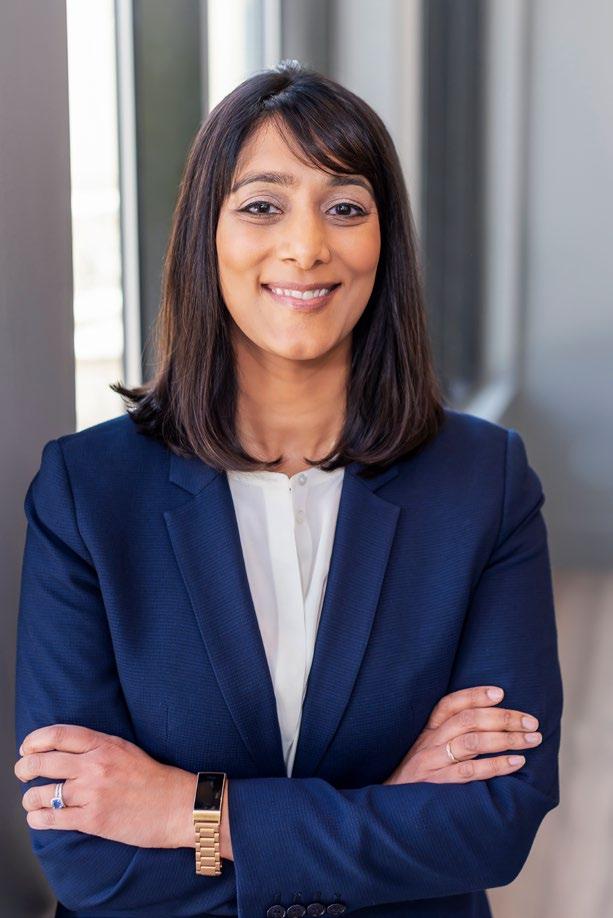
sales and marketing teams. The lawyer is extremely diplomatic in explaining the chasm that sometimes exists between marketing and legal. Marketers aren’t trained lawyers, and they often push the envelope. Thakkar could speak with the marketing team in a language they understood and concepts that could crystallize changes that needed to be made.
“It is critical to understand business dynamics and personalities
when conveying legal advice in an in-house environment.”
Thakkar’s unique combination of franchise and advertising law came to the attention of Volkswagen Group of America in 2012. She’s been at the automotive group ever since, rising through two promotions. As a key advisor to the sales and marketing teams, she has had to learn all aspects of the business; analyzing automotive advertising requires an under -
Mona Thakkar
Deputy General Counsel
Group of America
standing of consumer protection, safety, dealer, and IP issues, to name a few.
The fast-paced nature of advertising law means that she has had to develop strong relationships throughout the legal team and the company to help her and the marketing teams consult the right experts on a quick timeline. And she and her team need to be agile and innovative to keep up with the host of “outside-the-box” ideas that come from her clients.
These skills proved to be invaluable when the company was faced with one of the most challenging periods in the German carmaker’s history. As the lead advertising lawyer in the US supporting the marketing and communications teams, she got a crash course in crisis communications.
The 2015 diesel emissions scandal placed a beloved carmaker with a die-hard customer base squarely in the crosshairs of both the court of public opinion and real courts all over the world. Thakkar was at Volkswagen Group of America during that tumultuous period, and she’s still there now. Why?
“As a small in-house department and a leanly staffed company, the issues the global automaker

As a mother of two and spouse to another in-house attorney, Mona Thakkar knows how to keep a lot of plates spinning. Reflecting on an early career experience, she recalls hearing Cummins Chief Administrative Officer Sharon Barner answering a question about work/life balance.
“I’ll never forget what she said,” Thakkar says. “She said there is no balance. Some days you’re consumed with your job, and other times your family has to take precedence over absolutely everything.” Success is prioritizing the right thing at the right time.
“Having a supportive partner and a community around you is so important. We all need help, and it’s OK to ask for it.”

“My dad would ask me to read contracts with him and to help him understand them better, and then ask me for my advice. It put me in the shoes of being an advisor to my parents early on.”
was facing in the US seemed unfathomable. Yet the entrepreneurial spirit toward solving problems, the true partnership between the legal and business teams, and the company’s commitment to its customers were very motivating. That kind of experience is career changing and gives you a new perspective,” the deputy general counsel explains.
The blessing, though, was adapting to a new normal and rising to the occasion, a mindset she shares with her colleagues and her team, who she describes as being “top-notch” and “extremely talented and humble.” General Counsel Tony Klapper has set a high bar for client service and creative thinking. As Thakkar continues her career at Volkswagen Group of America, she leverages the relationships she’s built in her advertising law practice to tackle new and emerging issues facing the company and the automotive industry as a whole.
Alan Bowie counsels for the situation and develops relevant expertise on a case-by-case basis rather than specializing in a specific aspect of the law
By Frank DiMaria

As a young child, Alan Bowie— now senior counsel at publishing giant Simon & Schuster—thought long and hard about his future. His fate was sealed when he was in third grade and his uncle Jim was installed as chief judge of the United States District Court for the Eastern District of Pennsylvania, a federal trial court.
“We all attended as a family,” Bowie recalls. “Seeing the court, the ceremony, and how folks admired and spoke about my uncle Jim made me think that this was something that I would want to do.” The seed had been planted.
By fifth grade, Bowie had ditched his backpack for a briefcase. “My uncle Bill, bless his heart, bought me a briefcase. I remember going to Staples to get it,” Bowie says. “I had this idea that if I wanted to grow up and be this lawyer, I needed to get started now. That was the genesis of both the decision—the inspiration—to be a lawyer and me
Senior Counsel
Simon & Schuster
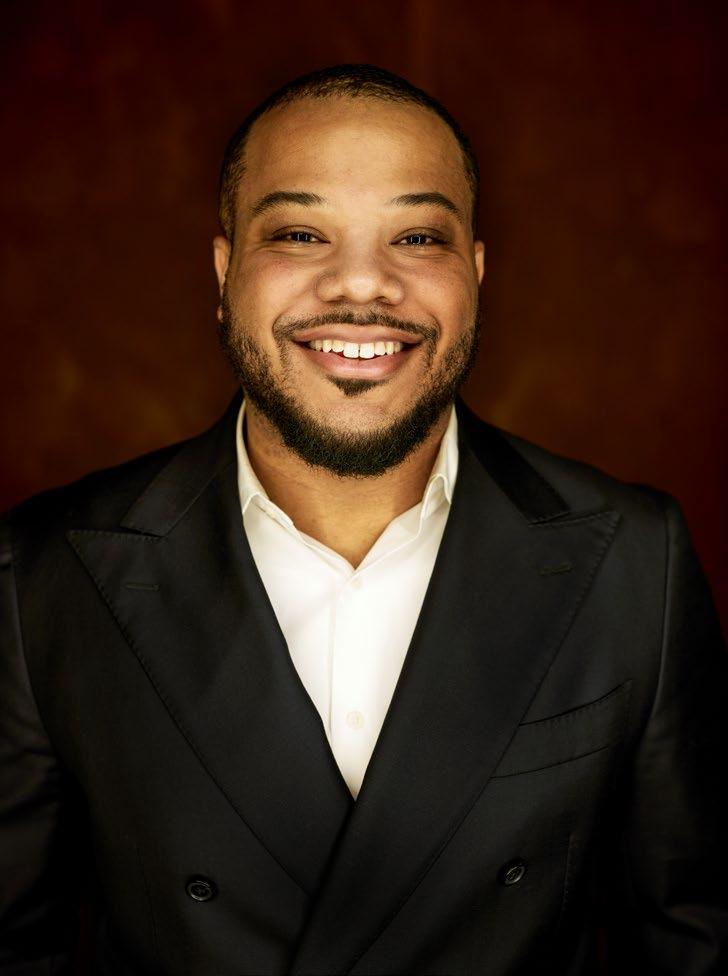
putting it into practice as young as fifth grade.”
While some individuals attend law school with dreams of practicing a specific type of law, like civil rights or labor and employment, Bowie’s goal was simpler. He aspired “to be a good lawyer,” a goal he set for himself after reading William Coleman’s book, Counsel for the Situation: Shaping the Law to Realize America’s Promise.
In the book, Coleman argues that firms have become bloated and lawyers are too quick to specialize in a specific type of law. “He says in the book, ‘The greatest talent of any lawyer is to quickly become an expert in what is relevant,’” Bowie says.
Although viewed as a “big firm lawyer,” Coleman had wide and varied experiences. He helped write the brief for Brown v. Board
of Education, was the first Black lawyer to graduate first in his class from Harvard, clerked for both the federal appellate court and the Supreme Court, and was elected partner at a white-shoe law firm. “I liked this idea. Here was this guy who just wanted to be a good lawyer,” Bowie says.
After earning a degree in economics from Howard University and a JD from Wake Forest, Bowie went to work at Carmody Torrance Sandak & Hennessey. Applying Coleman’s philosophy to his own newly minted career, he aimed to become a firm lifer, with the goal of building a client base and becoming a partner. “I thought in between those lines, I would get to do interesting, fun work,” he says.
Bowie amassed an impressive book of business while at Carmody, but his career took a detour when he was offered a job working for “superstar general counsel” LaTanya Langley of BIC. “I couldn’t truthfully turn down the opportunity to work for her,” Bowie admits. Moving from Carmody to BIC reframed Bowie’s career.
“I wanted to be this commercial litigator and labor and employment lawyer at a national level. Working at BIC gave me the opportunity to do that, but to do it in a different way,” Bowie says. “Rather than being a partner at a firm, I was an internal business partner at BIC.”
Inspired by Langley, Bowie stretched his intellectual curiosity, as his legal role model Coleman had. “It changed my career trajec-
“An effective legal team has its thumb on the pulse of the critical issues of the company and is ready and willing to do all that needs to be done.”
tory and made me think more broadly. It was in harmony with this idea that I am intellectually curious about the law. It met with my personality and the career I wanted to build,” Bowie says.
Bowie left BIC to join Simon & Schuster as senior counsel in November 2023. He now manages the publisher’s litigation portfolio, works on general commercial affairs, and supports special sales. He also advises one of Simon & Schuster’s imprints on its day-to-day issues.
As part of his responsibilities, he manages the prosecution or defense of lawsuits. Commercially, he helps the company achieve its business objectives by entering into business agreements that also protect the company.
“There are a number of issues that may arise,” Bowie says. “My job as a legal partner is to make sure the company is able to meet all its legal requirements.”
Simon & Schuster’s legal team is composed of eight lawyers, all of whom report to the company’s general counsel. Bowie believes individuals in a legal department must be flexible, good communicators, and willing to assist in all matters. “An effective legal team has its thumb on the pulse of the critical issues of the company,” Bowie says, “and is ready and willing to do all that needs to be done.”
Erika Bauer talks about what it means to build culture at Casey’s General Stores, a Midwestern institution
By Billy Yost

Erika Bauer
Senior Legal Counsel
Casey’s General Stores
If you’ve spent time in America’s heartland, chances are you’re well acquainted with the red and white of Casey’s convenience stores and gas stations. With over 2,900 stores from western Nebraska to eastern Tennessee, Casey’s is a Midwest institution—and Erika Bauer represents the best of the culture the organization has created since its founding in 1968.
Bauer, senior legal counsel at Casey’s General Stores since 2022, wasn’t just searching for her first in-house legal team when she came to the company. She was seeking an organization that practiced what it preached.
“I was looking for a place where people didn’t put their heads down at their desks, go home, and move on,” the attorney says. “I wanted to be somewhere where people engaged with each other, collaborated, and were proud of the employer they worked for.”
Bauer was serious in her mission. In job interviews, she would ask questions like, “Do you know the name of your assistant’s children?” or “How often do you speak with your colleagues?” This line of questioning could catch a lot of interviewers off guard, but not at Casey’s.
Since coming in-house, Bauer has made enhancing the culture at Casey’s a passion project. She’s
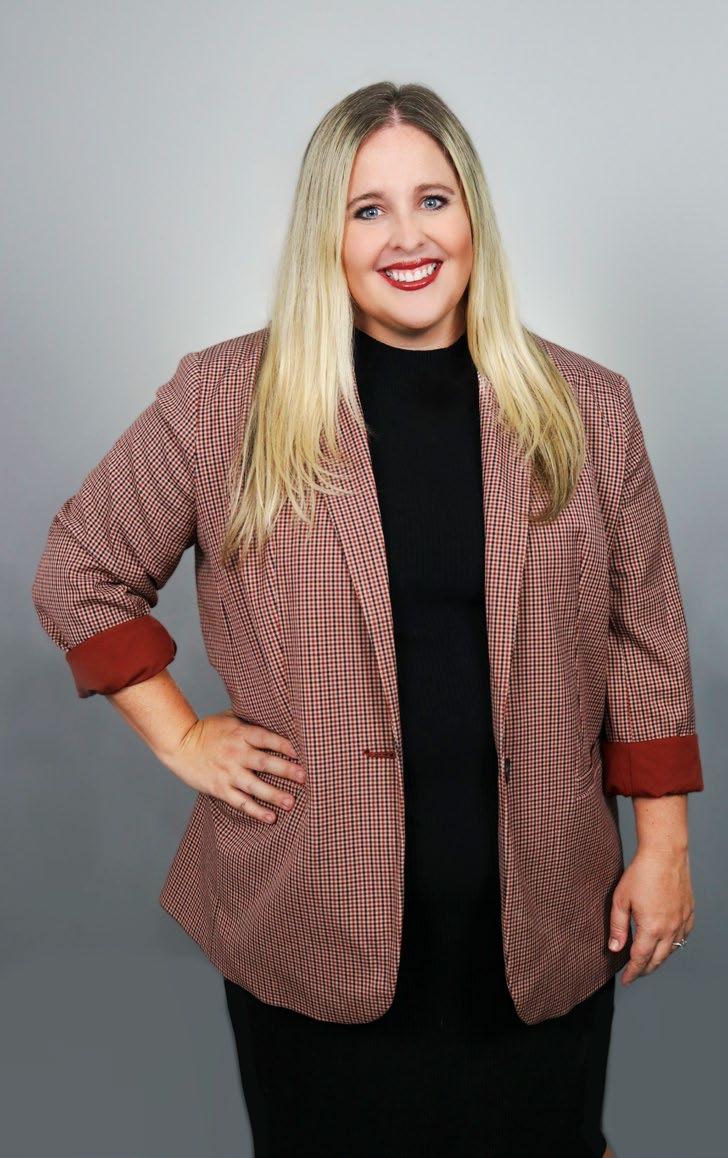
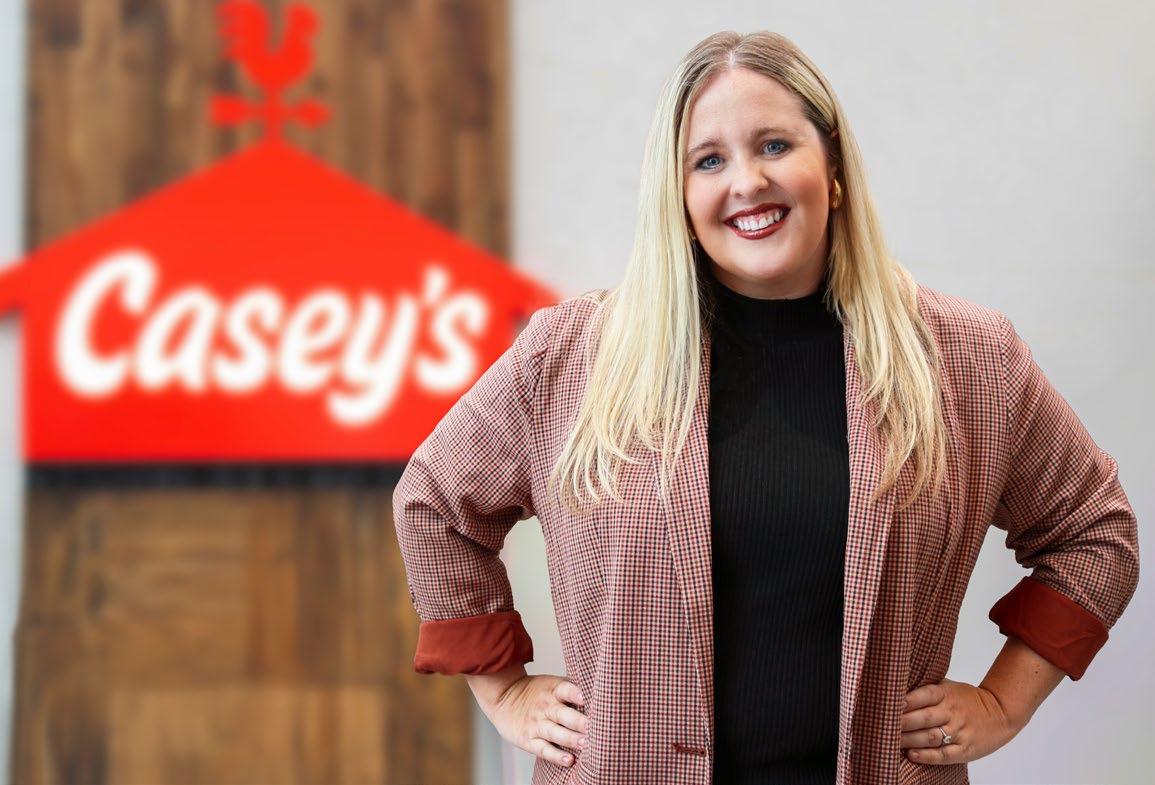
“Being in-house can be a little scary, because a lot of the time you need to go with your gut.”
a natural fit for the job. She’s gregarious and welcoming, easy to talk to, and disarming in a style that is Midwestern to its core. You just like talking to her. And she wants to make a great culture even better for Casey’s thousands of team members across the US.
“Our corporate team wants to make sure that the culture we have here is carried down to all of our team members in our stores,” Bauer explains. “It’s important to them, and it’s important to me. From the CEO to the person who comes in at four in the morning to make donuts in our stores, we’re all team members, and we want that connection felt.”
Bauer is as passionate about her practice as she is about culture building. The senior counsel, who clerked at the Iowa Supreme Court before building out employment law experience at firm Belin McCormick, says while some days can be hard, she’s never once doubted that she was in the
Sara Robinson
right field. And although she became a shareholder in her firm, Bauer wanted to play a more proactive role in helping an organization avoid potential litigation before the problem occurred.
“What I love about being in-house is that I can be more preventative and implement policies, so our team members aren’t put in situations where they feel like they need to take legal action,” the senior counsel says. “I want our team members to know that we’re going to have their backs and we’re going to make a situation right.”
Convenience stores are, in many ways, the last true equalizing connection points for people in the US. At a time where communal gathering spaces are dwindling, most of us still need gas or a quick snack. People of all backgrounds still interact at convenience stores. That means the sheer variety of issues coming across Bauer’s desk are rarely cookie-cutter situations, and no day is ever the same.
Bauer says one of the challenges she’s had to get comfortable with is that she’s often confronted with issues that she’s not immediately ready to tackle. In her private practice days, she could have done hours of research and returned with an opinion that could be taken or cast aside. But that’s not the speed of business nor the life of an in-house counsel.
“Being in-house can be a little scary, because a lot of the time you need to go with your gut,” Bauer says. “The big decisions take a great deal of time and consideration, but there are so many small moments throughout the day where you just have to trust your experience and background and
help the business move forward. I’ve had to grow into that.”
But developing those new muscles is part of what Bauer loves about her job. In her previous firm, she jokes that she loved being “the dumbest person in the room,” surrounded by attorneys with decades of experience and expertise. But now, Bauer informally mentors younger professionals and helps grow the next generation of in-house professionals. More than anything, a conversation with Bauer leaves one convinced that certain people are meant to be cultural ambassadors, regardless of what department they’re in. Her job may be protecting team members and her organization, but people like Bauer can also be the cultural touchpoints of what makes a place like Casey’s a great place to be.
Fredrikson takes pride in working alongside women leaders across a wide range of industries. We congratulate Erika Bauer on her distinguished professional achievements.
fredlaw.com
Fredrikson: “On
—Debra Linder, Shareholder
Bo Han talks IP strategy, protecting scientific breakthroughs, DEI, and being a working mother at Orbital Therapeutics
By Billy Yost

Bo Han’s two-yearold daughter Zoe inspired her to join the young and innovative biotech company Orbital Therapeutics in Cambridge, Massachusetts.
“During my parental leave, my daughter gave me the time away from work to reflect on what I
wanted next in my legal career,” Han says. “Lawyers are, by nature, risk adverse. At first, I was hesitant to leave the innovation law department at Bristol Myers Squibb [BMS], an established, global biopharmaceutical company. I had built strong relationships with my colleagues and clients at
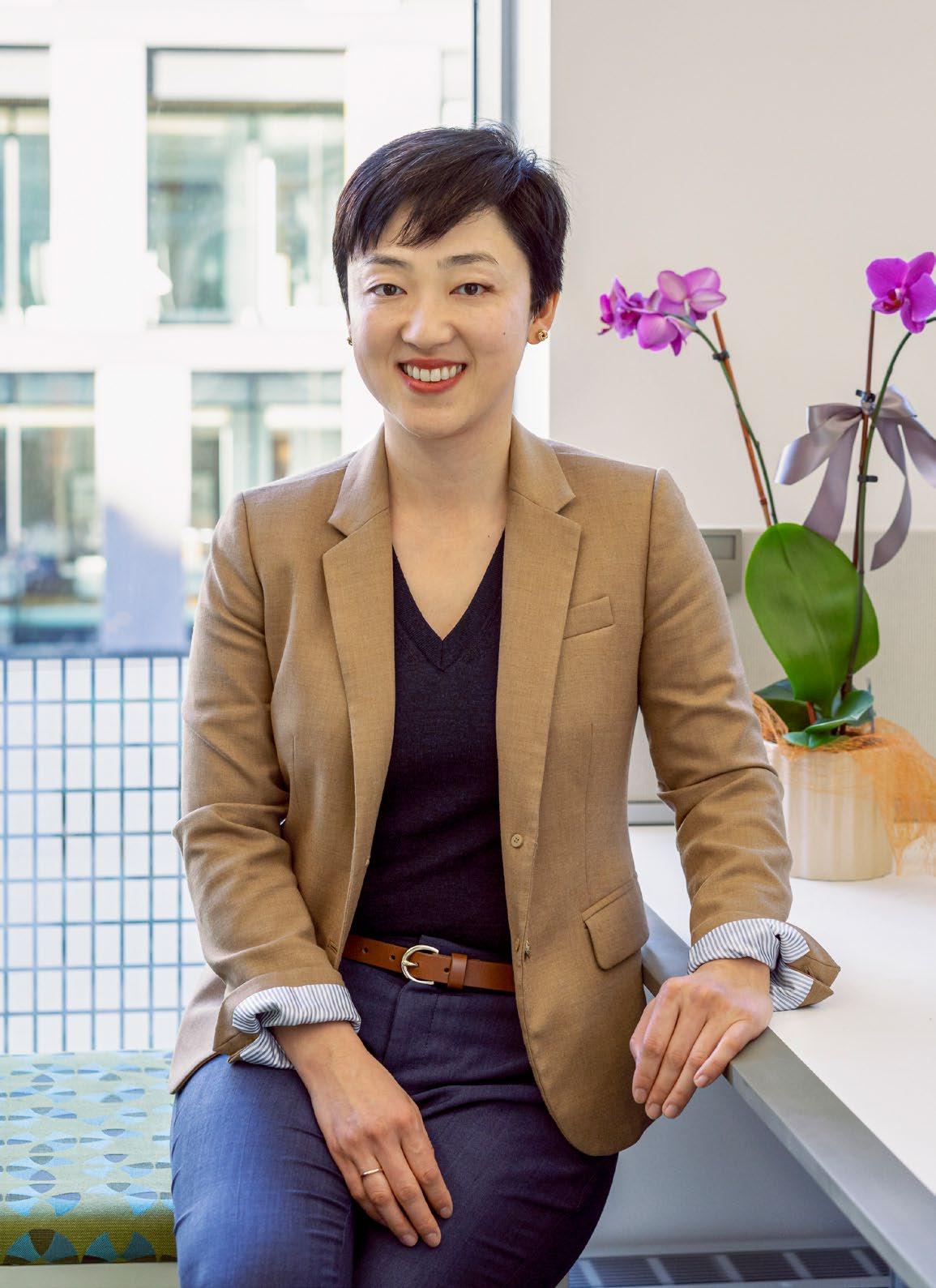
BMS, and I worried about the volatile nature of the biotech industry.
“However, as I learned more about Orbital’s science, people, and mission, I felt compelled to seriously consider the exciting opportunity to help build the company and to lead its IP strategy. Reading all those children’s books to my daughter about reaching for the stars gave me the final push to make the leap to Orbital.”
Han, vice president of intellectual property at Orbital Therapeutics, supports the young company’s goal of developing new and groundbreaking RNA medicines. From her chair, Han is tasked with leading the company’s IP strategy, collaborating with R&D teams to protect the company’s innovations, and providing legal guidance to help bring innovative RNA medicines to the marketplace.
Her role requires significant relationshipbuilding and collaboration with researchers, who are talented scientists but may not speak “legalese.”
“My work is about building relationships and gaining the trust and respect of our researchers,” Han explains. “By building strong relationships, I can more effectively learn about the exciting science that we are developing. I then translate the often-technical language of IP law into understandable, practical legal guidance.
“Through this two-way communication, we ensure that we capture our innovations with strong, high-quality IP protection. Our efficient communication also helps guide the direction of our research and accelerates our development of innovative RNA medicines.”
Moreover, Han says she has greatly enjoyed collaborating with Orbital’s C-suite and the board of directors to shape IP strategy that supports the company’s mission.
The VP also says a small company like Orbital is a fantastic place to put diversity, equity, and inclusion at the forefront of its
operations. Han, who immigrated to Raleigh, North Carolina, from Taiyuan, China, when she was seven years old, is also a member of the LGBTQ+ community. She knows what it means to feel like an outsider and therefore understands the importance of supporting DEI efforts to bring diverse perspectives to the table.
“In my foundational days at the law firm WilmerHale, I had fantastic mentors who may not have looked like me, but who provided invaluable training and guidance that helped shape me as a lawyer,” the VP says.
“I am also fortunate to have had wonderful mentors and sponsors at BMS. It is important for a company to have leaders who look like you but also allies who support you in your development. The value of allyship should not be underestimated.”
At Orbital, a company of about fifty people, Han says she strives to be an approachable leader, a role model, and an ally for younger professionals navigating their careers.
“Reading all those children’s books to my daughter about reaching for the stars gave me the final push to make the leap to Orbital.”
It’s about more than Han’s legal, scientific, and business proficiency. She has also managed a successful career while she and her wife raise two young children. Han is a working mother who says she is continually working to balance her duties at home with her career. But she is doing it.
Han and her wife, Yuanxin, a software engineer, have divided parenting duties about as evenly as possible, each carrying one of their children to birth. But Han says particularly for those in same-sex relationships, there has been extra work for her family to figure out how to divide that work fairly. They have learned that it’s important to be communicative and flexible.
“It comes down to figuring out what works for your family,” Han says simply. “And that can be different for your first child than it is for your second. Just remember, you can’t do it alone, and you’re not supposed to.”
Han says she’s also grateful for her parents, who are loving grandparents and have gladly helped with childcare responsibilities. Han’s parents both have backgrounds in science and research, and they had a significant influence on the career she pursued. Han had considered pursuing med-
icine, but through her parents’ guidance and her volunteering and internship experiences, she ultimately found her career path combining her interest in science and the law.
“My parents were pretty evolved in their thinking,” Han says. “I felt supported in my decision and career path, and I have taken so many of the lessons they taught me and translated them into my work.”
As Han continues to help propel Orbital Therapeutics forward, the VP, attorney, IP expert, mother, and wife will continue to be a beacon for diverse attorneys everywhere, highlighting just how far a motivated woman can go with a supportive network. It may be impossible to “have it all,” but Han’s life paints a compelling counterargument.
Congratulates to
Vice
President
of Intellectual Property, for her leadership and well-deserved recognition in Modern Counsel. We are proud to partner with Bo at Orbital Therapeutics to accelerate the development of medicines for patients in need.

Proskauer is a leading law firm, providing a wide range of legal services to clients worldwide. To learn more about the firm, visit Proskauer.com

After a twenty-seven-year career that’s taken him from big firms to big auto, Kyle Dufrane helps General Motors stand out in the crowded EV marketplace
By Zach Baliva
“Manufacturing batteries is a big undertaking for a company that makes cars. We usually make the vehicles, not the components.”
At twenty-one, recent University of Michigan political science graduate Kyle Dufrane landed a job interview for a paralegal position at a big law firm in the nation’s capital. But he faced two problems. He had no law degree and no money to get to Washington, DC.
Still, the Detroit native and first-generation college student didn’t let those obstacles deter him. He signed up for an American Express card that gave new account holders two free airline tickets and used the perk to get to Jackson & Campbell. The firm’s leaders hired Dufrane as a legal assistant, and his legal career officially began.
Dufrane spent the next two years working under the tutelage
Kyle Dufrane Senior Counsel of Complex Litigation
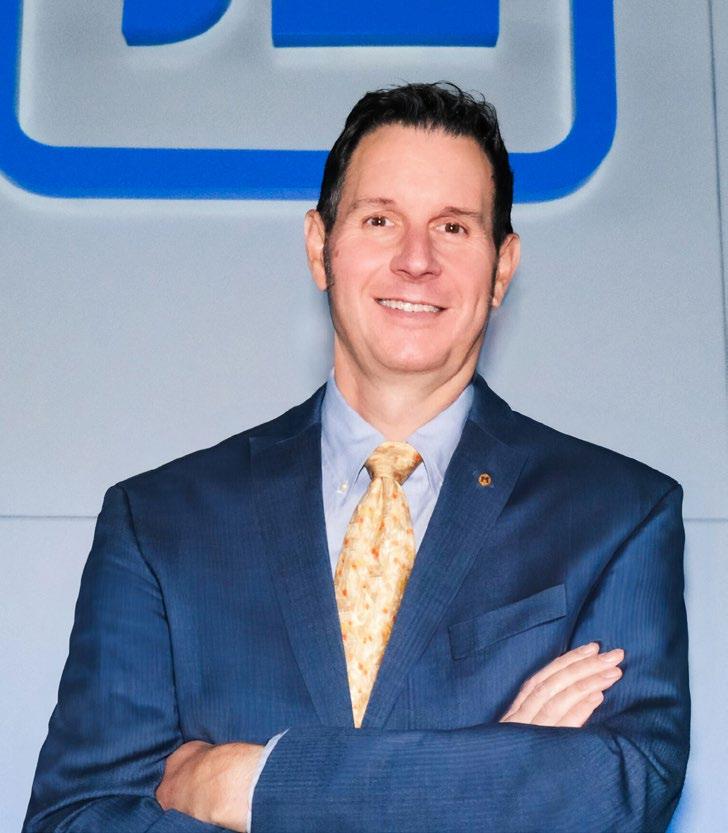
of a devoted mentor at Jackson & Campbell. He learned the ins and outs of insurance coverage litigation as he helped partners and paralegals prepare documents, perform research, and manage a caseload. For a young man whose only knowledge of the legal system came from what he saw on TV, it was a foundational experience.
“There’s no TV show about a guy in a room writing contracts,” he jokes. “Working as a legal assistant taught me what it really looks like to be an attorney.”
His hands-on experience convinced Dufrane that he was on the right path. And “working as a legal assistant was a huge advantage because I entered law school knowing the terminology and processes that were foreign to a huge majority of my classmates,” Dufrane says. The head start he had at the University of Detroit Mercy School of Law helped him earn high grades and a scholarship that lowered the cost of law school.
Today, Dufrane serves as senior counsel of complex litigation at General Motors. He took the job in 2021 after logging more than twenty years at Dykema Gossett, where he became a partner. It’s where Dufrane first encountered GM while defending the automaker in product liability matters.
As senior counsel of complex litigation, Dufrane leads a team of twentytwo legal professionals who work on the front lines of litigation for a large nationwide breach of warranty docket. Managing thousands of cases that represent significant exposure to the company gives his position sig-
“Every case may not be resolved by a jury and in forty-four minutes as seen on TV, but I get to grow alongside one of the most iconic companies in the history of America.”
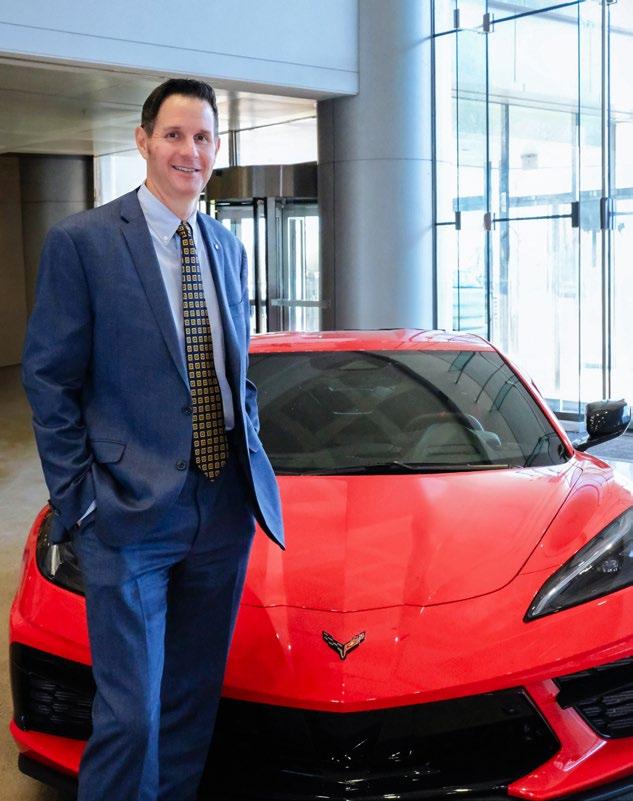
nificant visibility all the way up to the C-suite. The team he assembled has reduced per case indemnity spend every year of Dufrane’s tenure.
In 2022, GM leadership asked Dufrane to take on another leading issue. He is now the GM litigator responsible for all litigation matters related to the electric vehicle battery joint venture known as Ultium Cells.
GM’s foray into producing its own batteries and tech platform is a departure from the strategy of other big automakers that get their batteries from numerous suppliers. The famed company is collaborating with LG Energy Solutions to manufacture the EV cells that will meet increasing demand and take GM to a zero-emissions future.
Ultium Cells has plants in Ohio and Tennessee that are up and running. When the Tennessee facility reaches full capacity, the two plants will be capable of supplying the batteries needed to power all GM EVs manufactured for the North American market. Currently, GM vehicles such as the GMC Hummer EV, Cadillac Lyriq and Escalade IQ, Chevrolet Blazer and Equinox EVs, and more all use electric vehicle batteries produced in these facilities.
For a veteran litigator like Dufrane, the events represent yet another opportunity to quickly master a new area of
law. “Manufacturing batteries is a big undertaking for a company that makes cars. We usually make the vehicles, not the components,” he says. Like the engineers who designed the battery cells and the factory workers who assemble them, Dufrane and his team had to learn how to spot potential issues and possible problems while applying their skills and knowledge to a new sector of the auto industry.
Even though being a lawyer is nothing like what he saw on TV, the opportunity to learn and develop new skills is part of what keeps Dufrane engaged after more than twenty-seven years. “Every case may not be resolved by a jury and in fortyfour minutes as seen on TV, but I get to grow alongside one of the most iconic companies in the history of America,” he explains. And now, he does so on the leading edge of next-gen automotive technology.
While many people go about their days without thinking much about their personal history or career paths, Dufrane has a constant reminder of how he got to where he is. It’s in his wallet. Whenever he needs to make a credit card purchase, Dufrane pulls out his trusty Amex. And each time he tucks it safely away, he reads one wellworn line scrawled in tiny black font on the lower right side: “Member Since ’93.”









RTJG IS A FULL SERVICE LAW FIRM DEDICATED TO ACHIEVING RESULTS FOR ITS CLIENTS IN TRIALS AND NON-LITIGATION MATTERS ON A REGIONAL AND NATIONAL BASIS.
Values-based legal leader Willie White walks the walk to transform JELD-WEN culture and drive long-term business strategy
By Frannie Sprouls

Early in the morning, half awake and eating breakfast before school, Willie White and his older brother would hear inspirational speeches from their father. In these motivational moments, their father would tell them they could be anything they wanted to be. One story involved becoming lawyers and running their own law firm.
“That was the first time I thought about going into law,” says White, a native of Charlotte, North Carolina.
Another significant influence was the attorney White’s uncle hired to help his grandparents secure ownership of their home. His grandfather had purchased the house but hadn’t obtained the title. White recalls the attorney’s help in resolving the situation was “one of the best things that happened to them.”
And then there was Johnny Cochran. “I don’t know any Black lawyer who wasn’t inspired by the excellence of Johnny Cochran or Willie Gary,” he says.
These influences inspired White to become the first person in his family to go to college (he studied economics at North Carolina Agricultural and Technical State University) and to earn a JD (from North Carolina Central University School of Law).
He built his expertise in private practice at Perkins Coie and Womble Carlyle Sandridge & Rice (currently known as Womble Bond Dickinson) before moving in-house at Wells Fargo, Driven Brands, and Adobe.
Now, White is the assistant general counsel for corporate governance and
Willie White
Assistant General Counsel of Corporate Governance & Securities and Assistant Corporate Secretary
JELD-WEN
securities and assistant corporate secretary at JELD-WEN, which he joined in January 2023.
His years in private practice provided him with broad array of experiences that “laid the foundation for my career now,” he explains. “I can identify issues and assess risk even at the highest levels at the company as assistant corporate secretary.”
Being in-house allows White to tap into his business and economics background because as in-house counsel, he gives advice that informs business decisions. “I get to use the part of me that likes thinking about strategy, customer impact, and long-term goals and priorities,” he says.
In his role at JELD-WEN, White leads securities reporting and disclosure and the global ESG function, which is responsible for publishing the company’s annual ESG report. He also supports the organization’s board of directors and subsidiary management.
It’s been an exciting time for White because JELD-WEN is in the midst of its own transformational journey. The company is reevaluating both the business and the workplace culture.
“How can we cultivate a culture that inspires our workforce but then also supports our long-term strategy and what we want to be, if you will, when we grow up?” he says.

The transformational initiative —which White is undeniably excited for and heavily involved in—started with a survey designed to measure the overall health of the company. The survey, sent to most JELD-WEN associates, looked for what the company was doing well, what it could do better, and where there were opportunities for improvement. The company then used the results to create a culture and capabilities workstream and change agent network.
The network comprises people across the organization, includ-
ing White. They have conversations with colleagues throughout JELD-WEN, identifying areas of improvement, brainstorming changes, and testing those ideas before implementing them across the company.
“I see myself as a person who doesn’t just talk the talk but walks the walk,” White says. “I am focused on being an example of what I want to see.”
White is a values-based leader. A major value he lives out in his own leadership is accountability. He believes in taking responsibility
Chris Gyves Partner Winston-Salem, NC christopher.gyves@wbd-us.com
Jamie Francis Partner Greenville, SC jamie.francis@wbd-us.com
Sid Shenoy Partner Charlotte, NC sid.shenoy@wbd-us.com
Womble Bond Dickinson is the trade name of Womble Bond Dickinson (US) LLP and Womble Bond Dickinson (UK) LLP. For more information, please see www. womblebonddickinson.com/us/legal-notices. ©2024 Womble Bond Dickinson (US) LLP
“How can we cultivate a culture that inspires our workforce but then also supports our long-term strategy and what we want to be, if you will, when we grow up?”
and ownership of your work—a value that applies regardless of leadership or management experience. Respect is another value that is high on White’s list. He is a manager and leader who will never ask someone to do something or make a commitment he isn’t willing to take on himself. He follows the golden rule: Treat others the way you want to be treated.
White believes in operating from a place of humility and respect. That creates a chain reaction: Your team does well, then you do well, then your boss does well, and then your CEO and the company do well.
“It creates a collaborative and respectful environment where folks feel valued,” White says.
White may still be early in his tenure at JELD-WEN, but he’s on a mission to drive business strategy through legal, governance, and culture transformation.
Womble Bond Dickinson: “As outside counsel, Womble’s Public Company Advisory Team has worked with Willie on many projects. He is a smart, practical and strategic lawyer; we always look forward to working with Willie and his team.”
—Chris Gyves, Jamie Francis and Sid Shenoy, Partners
A look at the logistical challenges, evolving regulations, industry shifts, and cultural concerns outside the office that lawyers must analyze and navigate to manage their impact inside the office
The music industry never stands still. Neither does Maryrose Maness, who has helped Warner Music evolve for over sixteen years.
By Billy Yost
FOR AN INDUSTRY THAT IS ALWAYS ON the lookout for the next big thing, Maryrose Maness is an outlier. The senior vice president and deputy general counsel at Warner Music Group (WMG) has been in-house with the music giant since 2008. That’s more than 16 years, or 160 in music business years. A veteran of employment, records management, and trademarks and domains at Warner, Maness continues to help one of the most recognizable names in the music business evolve at a rapid pace.
When Maness accepted her role at Warner, the iPhone was a year old. Music lovers carried both a cell phone and an MP3 player, requiring regular syncing with computers back home. Streaming was an emerging concept; now it accounts for more than 80 percent of the music industry’s revenue. Very few industries have had to change so quickly, but luckily for Warner, Maness has been behind the scenes, helping chart and finesse each new step.
Maryrose Maness SVP, Deputy General Counsel Warner Music Group
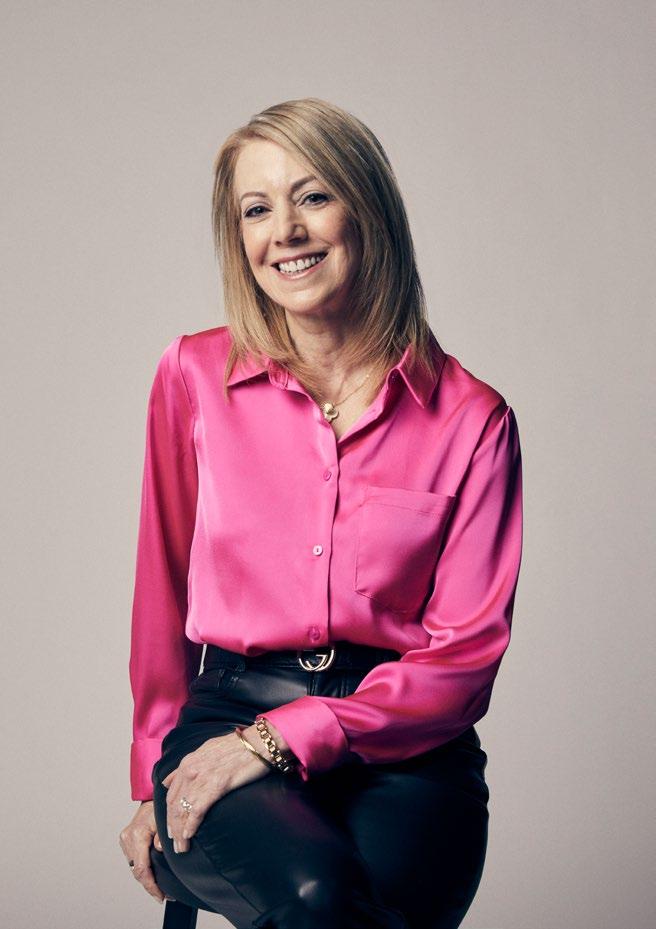
“Tennis made me more prepared for the ‘junk balls’ of life. It may have some weird spin to it, but I’m going to figure it out.”
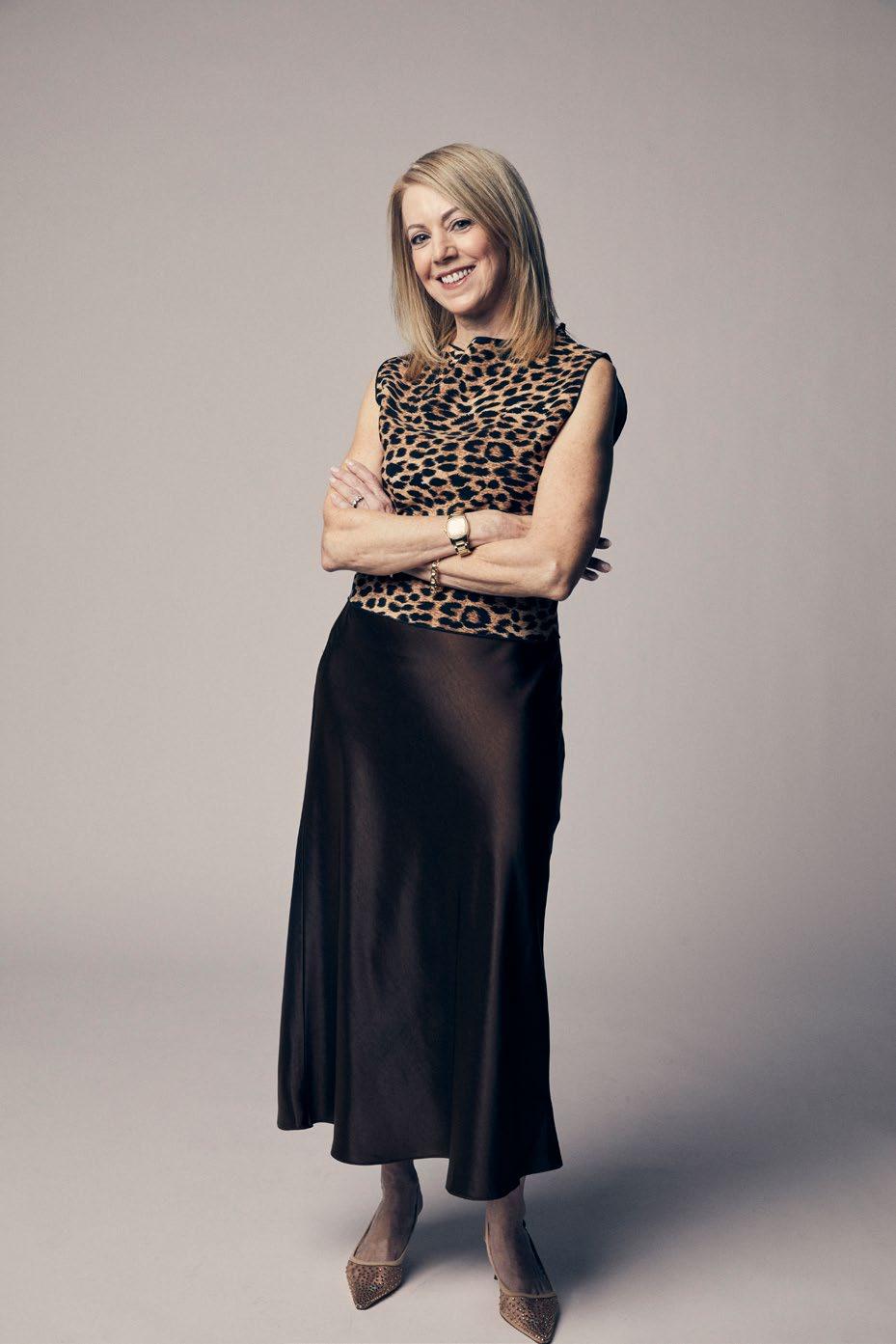
“I used to have a more traditional office, and now I have a large conference table with a huge screen. It allows me to invite people in, to collaborate more easily, including with people who aren’t on-site.”
ers and employees to develop new ways to interact and a different style of performance management. While WMG has returned to a hybrid four-day work schedule for most employees, lessons learned during the pandemic have had lasting power.
“We’ve continued to push a lot more cross-functional collaboration,” the SVP says. “Even when we’ve got colleagues across the world up on screens, it still feels intimate. It still feels like everyone can contribute. Our work product has improved significantly. There had to be some kind of silver lining to such a terrible time.”
Most recently, that change wasn’t related to wireless earbuds or a new streaming service; it was about how people work. The COVID-19 pandemic prompted WMG to rethink office use, collaborative spaces, and the future of work. The SVP says her organization initially piloted hot-desking—more of a coworking space feel, where no desk is owned by an employee—but it didn’t allow for the kind of collaboration the company needed.
“We wound up assigning permanent desks for those of us who went back into the office and [having] different office space designs, which altered my work style a lot,” Maness says. “I used to have a more traditional office, and now I have a large conference table with a huge screen. It allows me to invite people in, to collaborate more easily, including with people who aren’t on-site.”
Remote work has provided some additional challenges for managers, the SVP says. It requires both manag-
Maness quotes a favorite saying, “Change is the only constant in life.” It’s a mindset that’s responsible for Maness’s continuing efficacy in a business that often has high turnover and must reinvent itself.
Last year, WMG restructured key operations and consolidated and streamlined its processes. For Maness, that meant even more collaboration and strategic support during a challenging moment.
“Internally, we’re focused on our employee talent,” Maness says. “We’re embarking on the creation of a more robust talent framework. The goal is to connect internal talent with opportunities to grow and develop. It defines clear roles for employees and provides them with a road map to get where they want to go in their careers.”
The SVP says this transparency and support will ensure the development and retention of key talent. Her employment team is also developing an employment foundation series. This set of modules will train HR and managers in performance management and other HR processes.
For those hoping to build a career in the music business, Maness says



that getting experience early on, whether it be volunteering with a music nonprofit or a college internship program with a music company or firm that specializes in this area, this demonstrates a love and appreciation for music.
“When it comes to the music business, drafting is so key,” Maness says. “Everything you touch includes drafting and negotiating—employment and commercial agreements.”
Then there’s the personality type, which can be a little harder to cultivate. Being flexible, nimble, and open-minded is not the way everyone is built. But in a business that continually finds new ways to reach its audience, to market new products, and to adapt to the marketplace, it’s incumbent on attorneys to be fluid, finding ways to elevate the business while still providing sound legal counsel.
To retain that flexibility, Maness continues to seek out new challenges. During the pandemic, the SVP took up tennis, and it stuck. Maness sometimes takes two lessons a week and says tennis has made her a better lawyer. Consider the junk ball, an intentionally wonky shot that can throw players off their game.
“Tennis made me more prepared for the ‘junk balls’ of life,” Maness says laughing. “It may have some weird spin to it, but I’m going to figure it out. That applies to the tennis court just as much as the challenges I see at work every day.”
Karen Colangelo champions Pinterest’s mission to be a positive corner of the internet
By Keith Loria
KAREN COLANGELO DIDN’T PLAN TO become a lawyer, although she grew up with two attorney parents in a small town near Buffalo.
“I always had an awareness of the legal profession, but I didn’t want to be a lawyer,” she says. “Like many people, I got into law because I wasn’t sure what else I wanted to do, but it certainly was not my intention.”
Once she started practicing, Colangelo realized pursuing law was the right decision, because she liked what she was doing. She found her niche in technology law, where applying old laws to new technology sparked her interest. Today, Colangelo serves as head of litigation and regulatory for the visual inspiration platform Pinterest, where she navigates complex content and moderation issues that impact both business and society.
The journey to this position started in 2010, after Colangelo graduated from Boston University School of Law. She joined Cooley’s Boston office as part of the law firm’s first class of summer associates.
“At the time, there was a big case for Google

that was being worked on by partners in San Francisco, and they needed someone to do all the grunt work in Massachusetts,” she recalls. “They asked me to do it, and that ended up turning into a whole career.”
As she became more familiar with tech law, Colangelo moved to California to work in the firm’s San Francisco office. There, she forged relationships at Facebook, Google, Twitter, and other Silicon Valley tech firms. In 2017, she joined Twitter’s litigation and regulatory team.
“I was there for five years, and I rose to the head of the litigation, regulatory, and competition team,” she offers. “I left in the Elon Musk debacle. I was the one responsible for suing Elon Musk to
force him to buy the company, which was a bittersweet victory because of what he did.”
Unsure of what to do next, Colangelo briefly worked at Open Sea, an NFT marketplace startup. After eight months, her old boss from Twitter invited her to join Pinterest, and she’s been at the company since summer 2023.
At Pinterest, Colangelo manages all litigation and regulatory matters. Anytime Pinterest gets sued or there’s a threat of a lawsuit and anytime there is an enforcement action or investigation, Colangelo’s team handles it.
“With the tech industry, we’re in a new world where we have regulators supervising us, so we have to go in and meet with them on a bimonthly
basis, answer their questions, and tell them what’s going on at the company,” Colangelo explains. “My team is responsible for that, so we’re trying to wrap our arms around it. We needed to develop a new strategy and build those relationships.”
One of Colangelo’s goals for her team is to take a data-driven approach to litigation. She provides leadership with metrics so they can easier assess the value of her team’s work.
“A lot of times, we may present a suit or reduce a settlement, and those are hard things to measure,” Colangelo shares. “I’ve been working on a project to better show the value of the team.”
“Karen is an exceptionally talented lawyer,” says Sarah K. Eddy, a partner at
Wachtell, Lipton, Rosen & Katz. “Her strategic sense is spot-on, and she brings to every decision the right blend of focus and ingenuity. You couldn’t hope for a better partner and counselor in a tough situation.”
Throughout her career, Colangelo has observed the intersection of tech and law and has evolved her thinking and work to stay successful in the field. Still, there have been challenges.
“The number one challenge is that we are a platform for user-generated content, and [such platforms] have a lot of capacity for good, but some people do post bad content,” she explains. “Unfortunately, a lot of people tend to seize on the negative parts of it. Especially since 2020, it’s been an industry in the crosshairs of political battles. It seems no one likes us.”
A critical issue for Pinterest and other platforms is Section 230 of the Communications Decency Act. This law says companies aren’t responsible for user-generated content that people post on their platform. But that law is under scrutiny, and President Donald Trump has said he wants to get rid of it.
“We try the best we can to monitor the content, but there are billions of pieces of content that people upload,” Colangelo says. “That’s a big challenge.”
Colangelo’s work at Twitter included defending the platform in Twitter v. Taamneh, a Supreme Court case that involved families of victims of terrorist attacks trying to hold platforms liable for the deaths of their family members. The argument was that Twitter content had radicalized these people.
“It was a hard case. You feel empathy for the plaintiffs and the victims of the suit, but at the same time, there’s no tie between these terrorist attacks and what happened on our platform,” Colangelo says. “We were protected by Section 230 because this was usergenerated content, and we can’t be responsible for monitoring every single piece of it. It was a good win for platforms and a great experience for me.”
Colangelo leads a lean team of three (soon to be four), and loves being part of a “small, scrappy” squad. “It gives you a lot of opportunity,” she says. “At the bigger companies with hundreds of attorneys, everyone is siloed, working on one specific thing. We get to work on everything across the world.”
“The number one challenge is that we are a platform for user-generated content … Especially since 2020, it’s been an industry in the crosshairs of political battles. It seems no one likes us.”

WilmerHale is proud to join Modern Counsel in congratulating Karen Colangelo of Pinterest.
“We try the best we can to monitor the content, but there are billions of pieces of content that people upload. That’s a big challenge.”
Providing legal representation across a comprehensive range of practice areas that are critical to the success of our clients.
In 2024, Colangelo took on a new role advising Pinterest’s public policy team, helping analyze new laws as they come into play. This year, she expects lots of new challenges coming under the new presidential administration, which will make things fun and stimulating.
Away from work, Colangelo cherishes her time with her kids, ages three and six, who help keep her busy. She also enjoys going to comedy shows and seeing live music.
“This was the year of my nostalgia tour,” she says with a smile. “I went to Vegas to see the Killers for their twentieth anniversary performance, and we also saw Incubus, Weezer, and the Flaming Lips—all the old bands that were popular [when I was growing up].”
As someone who loves to learn new things, Colangelo gets what she needs to be inspired by her job by working in-house at a tech company.
“Every day, I get to deal with new issues I never faced before, and it never gets stale,” she says. “As long as the pace of technology innovation happens, I want to stay on the forefront.”



































































































Valencia Gallon-Stubbs comes home to Daytona Beach to lead the general counsel’s office at Bethune-Cookman University
By Billy Yost
“God always has a way of ordering my steps.”
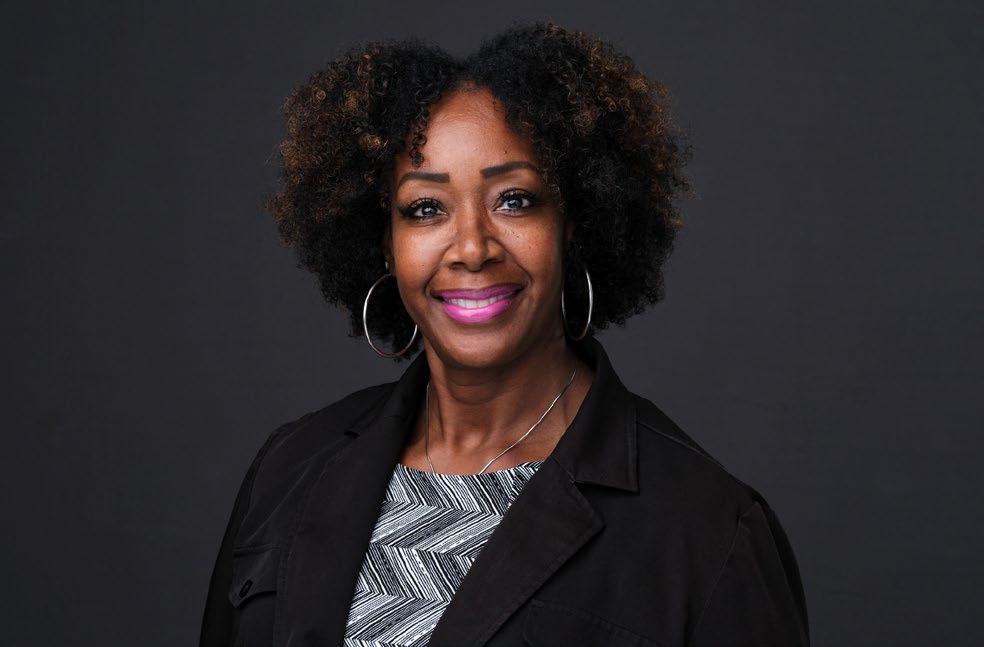
Valencia Gallon-Stubbs General Counsel Bethune-Cookman University
THERE’S A QUOTE FROM MARVEL’S Black Panther that has stuck with Valencia Gallon-Stubbs since she saw the movie. A fierce general of the special forces in the fictional land of Wakanda is asked by the man she loves if she would kill him for the sake of her country. Her response?
“For Wakanda? Without question.”
That level of dedication mirrors Gallon-Stubbs’s commitment to her role as general counsel for Bethune-Cookman University, a private historically Black university in Daytona Beach, Florida.
“Without question, I give my best to serve this institution prudently yet
aggressively,” the general counsel says. “That way, we continue to maintain our resources for future generations so that this university, which is celebrating its 120th anniversary, outlives us all.”
Gallon-Stubbs’s devotion to both her employer and her city is undeniable. Raised in Daytona Beach, she sends both her sons to the same school that she graduated from, although Gallon-Stubbs jokes she can barely recognize the campus as it looks now.
Gallon-Stubbs earned her undergraduate degree at the University of Central Florida and her JD from Nova Southeastern University Shepard Broad College of Law. She spent over a decade
“Without question, I give my best to serve this institution prudently yet aggressively. That way, we continue to maintain our resources for future generations so that this university, which is celebrating its 120th anniversary, outlives us all.”
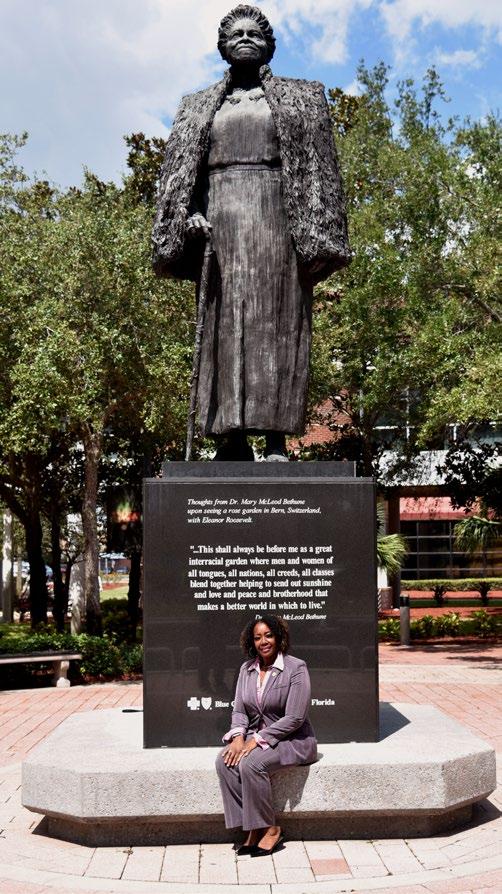
away, building out her practice and her life, but she says God brought her back to Daytona Beach just in time.
Gallon-Stubbs accepted her initial role with B-CU in 2018 just as her mother was diagnosed with pancreatic cancer. The silver lining of the diagnosis was that Gallon-Stubbs could be there for her mom, a strong woman who beat back her diagnosis for five years before passing away in January 2024.
“God always has a way of ordering my steps,” Gallon-Stubbs says. “It was time that my dad and I were caretakers for our anchor. I’m grateful for that.”
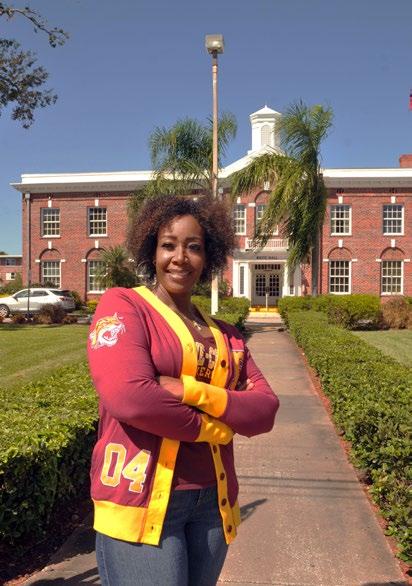
Both Gallon-Stubbs’s mother and father—a former teacher and a high school principal who devoted forty years to his craft, respectively— watched their daughter blossom as a lawyer. She worked in private practice, as a staff attorney at the Fourth District Court, as an assistant city attorney for the city of Riviera Beach, and as a managing attorney for Florida Rural Legal Services, an organization that provides free legal assistance across Florida.
Attorney Gallon-Stubbs has litigated matters through Florida’s state appellate courts, written countless legal memoranda and briefs, and forged meaningful connections with dozens of trailblazing Black attorneys in the Sunshine State.
The GC role at B-CU puts Gallon-Stubbs’s legal expertise to the test. A smattering of her wide variety of responsibilities includes university, trustee, faculty, student, staff, and administrator legal matters; labor and employment litigation; civil litigation; construction, real estate, and economic development issues; and trademark and IP matters. She has also found time to conduct in-service workshops on hot-button legal issues.
Most recently, the GC assumed oversight of the Department of Risk Management and Insurance, which includes general liability and insurance for the university.
All this work requires an unprecedented amount of time management, task switching, and multitasking. Gallon-Stubbs says a handful of prayers every day don’t hurt, either.
“I couldn’t do this without the support of my staff, colleagues, and
administration,” Gallon-Stubbs says. “They trust me, and I hope I’ve earned that trust. They know I try to do the right thing for the right reason.”
“The right thing for the right reason” is a mantra for Gallon-Stubbs. Though mistakes are inevitable, if people make them in service of this mission, everything winds up OK. And for the general counsel, doing the right thing extends well beyond the workday.
Gallon-Stubbs is an active member of both her legal community and Daytona Beach. She currently serves on the board of directors for the Futures Foundation, an organization that supports the Volusia County School System, and the Space Coast Chapter of the American Red Cross. She’s also a member of the AretéExecutive Women of Influence.
While last year was a tough one for the GC with the passing of her mother, Gallon-Stubbs is clearly content to be home. She’s happy to be raising her sons in her old stomping grounds, and there’s no doubt she will continue adding civic organizations to her dance card. Gallon-Stubbs was blessed to have been raised in the City of Daytona Beach, and she’s repaying her community tenfold for her joyful upbringing and the opportunities it gave her.
Greenberg Traurig:
“We have worked with Valencia on a broad range of issues. She is always responsive, thorough, and highly practical. She is also a pleasure to deal with on a personal level, which makes difficult situations easier to navigate.”
—I. William Spivey II and Gregory W. Herbert,
Shareholders

Melissa Lou draws on her experience in Big Law and as a federal prosecutor to defend DaVita Kidney Care against government investigations
By Frank DiMaria
MELISSA LOU HAS ALWAYS BEEN pragmatic. That pragmatism initially led her to pursue a finance degree at Arizona State University (ASU), given her love of mathematics. “Majoring in finance seemed like it would be more useful on the job market,” says Lou, now the senior director, assistant general counsel, and head of investigations at DaVita Kidney Care. Business school, however, never felt quite right. She decided to audit a
“It’s important to check in with yourself periodically to see if you’re doing the work that you want to be doing.”
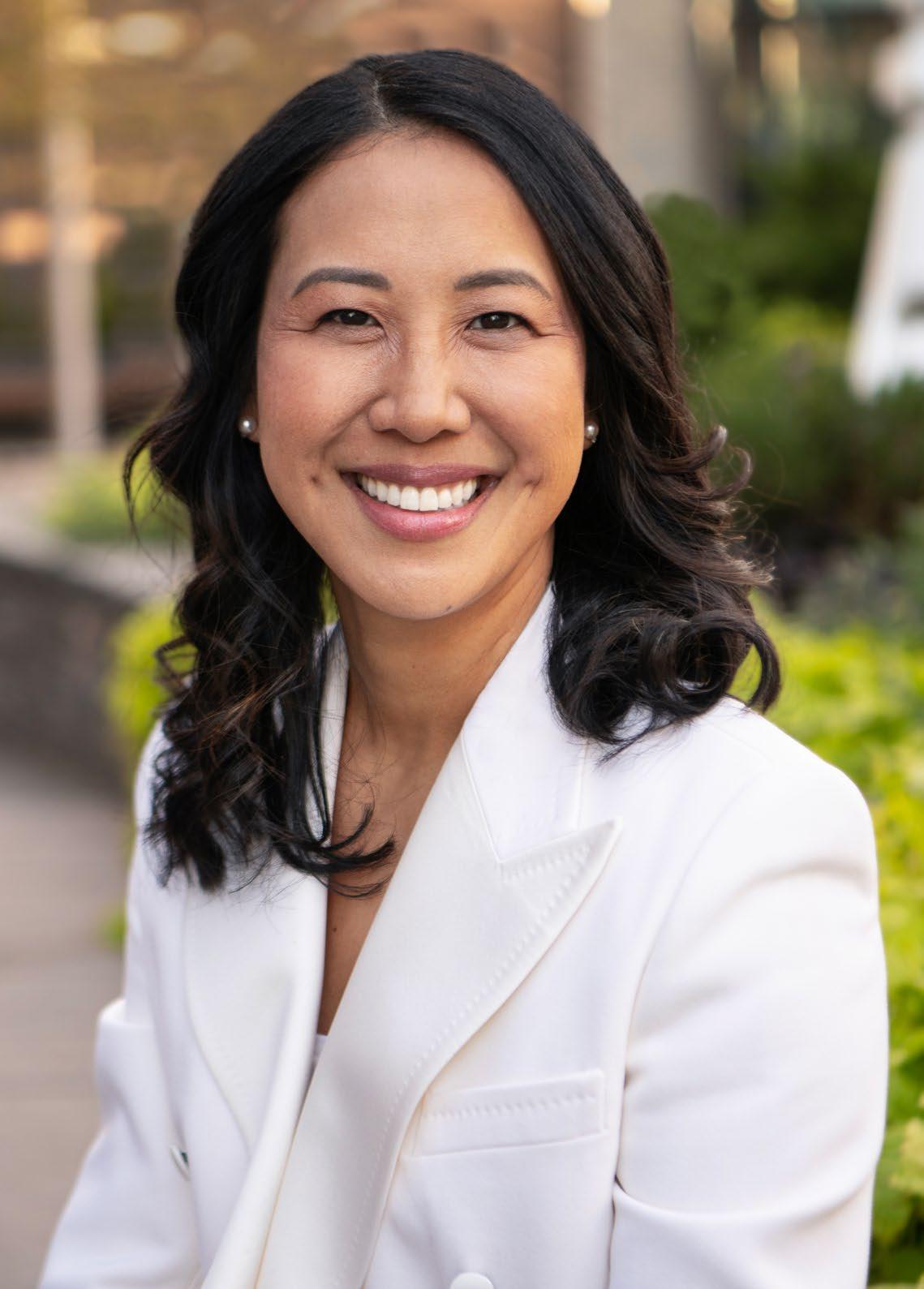
Melissa Lou Senior Director, Assistant General Counsel, and Head of Investigations
DaVita Kidney Care
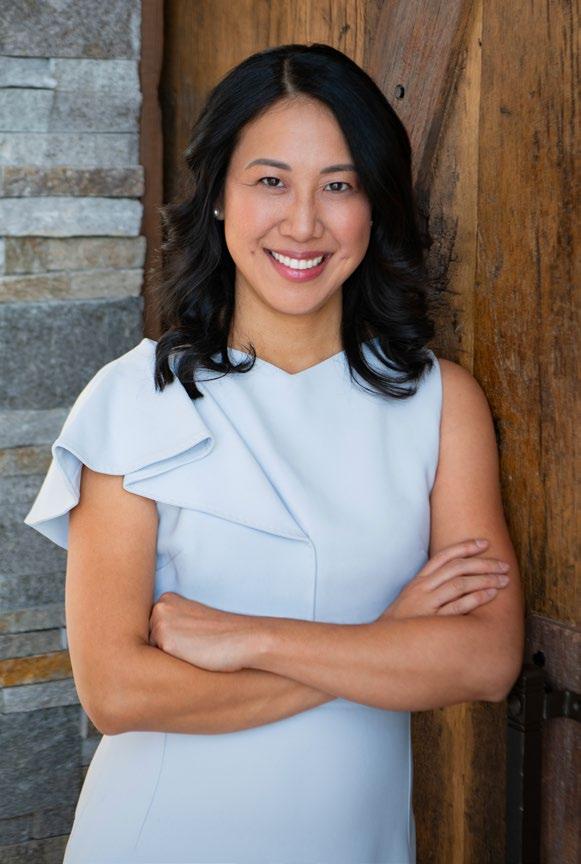
law school course on the philosophy of criminal law. The course piqued her intellectual curiosity, and on her father’s advice, she applied to Yale Law.
“I had this propensity to underestimate myself, and I never dreamed that I would get accepted to Yale,” Lou says. But she did get in. At Yale Law, Lou, who had felt like a face in the crowd at ASU, found her place. The school’s small class sizes and unconventional grading system, which encourages students’ intellectual exploration over competition, created an environment where she thrived.
“Yale is a wonderfully humane place to study the law. It changed the trajectory of my life,” Lou says.
After graduating, Lou joined top-ranked law firm Covington & Burling in Washington, DC, where she focused on antitrust law. It was there that she met an influential mentor, a “dynamite attorney” who lifted up junior attorneys.
“She gave me practical advice on how to navigate the world of big law firms and how to succeed,” Lou says. “She was someone who believed in me and didn’t hold back from telling me so.”
Lou stayed at Covington for just over two years. Then she made a career move that provided her with courtroom litigation experience and laid the groundwork for her current role at DaVita. She followed her now-husband, then an officer in the US Air Force, to Boise, Idaho, and took a job in the criminal division of the US Attorney’s Office in the District of Idaho.
Moving from a large firm in DC to a smaller legal market in Idaho was “a leap of faith,” Lou says. But in the end, “from a professional standpoint, it was probably the best move I could have made.” Lou’s experience with investigations and litigation at the US Attorney’s Office now informs her role defending DaVita. “You have insight into the playbook,” Lou says.
At the close-knit US Attorney’s Office in Idaho, Lou ran all her own cases and gained significant trial and appellate experience. She never had to wait for the “interesting, sophisticated cases,” the way she may have if she had practiced in a larger district. “I got them right from the beginning,” Lou says.
She also learned the importance of the “people element” of law. “Being smart only gets you so far,” she says. “It’s just as important to be personable and well liked by juries, judges, colleagues, and adversar-
“Being smart only gets you so far. It’s just as important to be personable and well liked by juries, judges, colleagues, and adversaries. After a certain point, success and fulfillment come from relationships.”

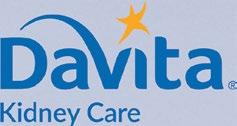
ies. After a certain point, success and fulfillment come from relationships.”
At DaVita, which provides kidney dialysis services through a network of 2,675 outpatient centers in the US, Lou leads a team of attorneys and paralegals in the Office of Special Counsel. Government payors comprise a significant portion of DaVita’s business. Lou and her team defend DaVita in all government investigations.
“Dialysis is expensive, and a lot of the company’s patients are Medicare patients. So when you have a business receiving substantial government funds, inevitably there’s going to be heightened scrutiny,” Lou says.
Reflecting on her own experience, Lou advises law students to be wary of the “echo chamber” driving graduates toward clerkships and top-ranked law firms.
“There’s a sense that you can’t go wrong chasing those paths because they’re prestigious and they keep doors open,” she says. “But it’s important to check in with yourself periodically to see if you’re doing the work that you want to be doing. Don’t just want what the people around you want because that feels like the right thing to be chasing.”


Adam Hornung reflects on a decade in Hong Kong, helping Hillhouse Investment expand globally and make strategic investments
By Zach Baliva
IN 2012, ADAM HORNUNG MOVED TO Hong Kong to help Hillhouse Investment Management find new investment opportunities and close complex global deals.
Although Hornung was living 7,500 miles from his native Nebraska, the transition was relatively smooth. His wife was excited for the move and their daughters would attend an American school. Hornung, an accomplished lawyer, had already spent six years as
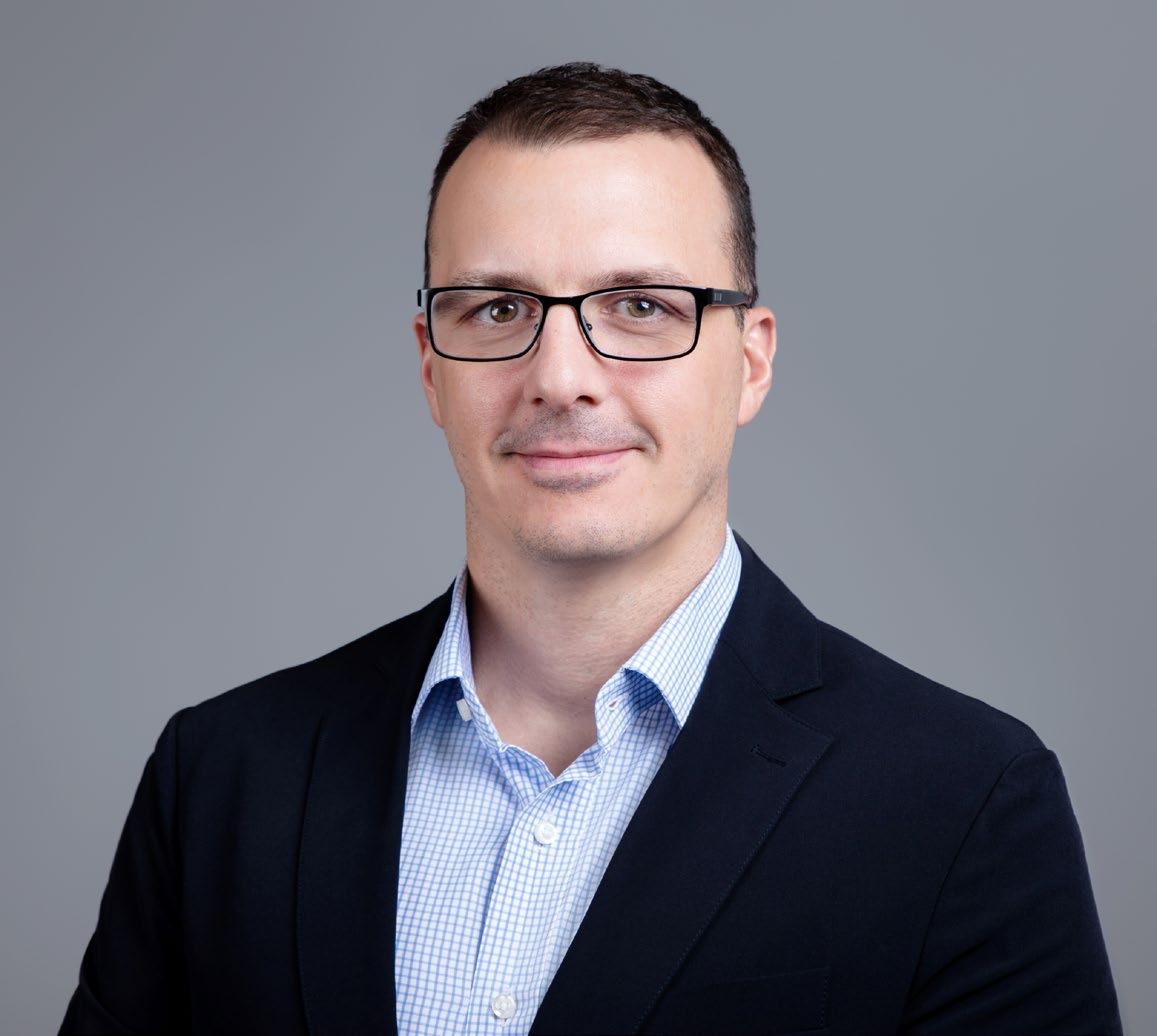
“If you’re thoughtful and patient, you have a chance for long-term success in this industry, and that’s what we’re after.”
“We’re patient enough to play the long game, allowing companies to make the right moves at the right time while anticipating what’s ahead.”
outside counsel for Hillhouse. In fact, starting from its inception in 2005, Hornung worked with seed investors and Hillhouse to help launch the firm.
Today, Hillhouse invests in markets across the globe and focuses on partnering with businesses in consumer, healthcare, business services, advanced manufacturing, and energy transition. The company uses a broad range of investment strategies and deep sector expertise to identify resilient, real economy businesses. Then they do what they do best.
“We’re experts at finding highquality organizations and rolling up our sleeves to partner through our deep sector experience,” Hornung says. “We’re patient enough to play the long game, allowing companies to make the right moves at the right time while anticipating what’s ahead.”
Those who know Hornung best aren’t surprised that he was willing to uproot his family and start a new life overseas. Entrepreneurship, risk taking, and adventure are in his genes. “My dad had about twenty businesses by the time I graduated high school,” he explains.
Some ventures were successful, while others were not. Hornung can’t recall every business but can still rattle off an impressive list. There was a bar, a hog farm, a house-moving business, a construction company, and a cattle ranch. Observing his father at work inspired the young Hornung and showed him that there is no shame in trying something new.
When Modern Counsel profiled Hornung in 2021, he was serving as Hillhouse’s general counsel and chief compliance officer. He spent most of his time managing his legal team, building and maintaining a strong corporate culture, uncovering new ways to add value to financial deals, and setting overall strategy.
Hillhouse has added real estate funds and a private credit practice to its arsenal. The company has eight offices around the world and has received regulatory approvals from more than thirty countries in connection with its investments.
The growth and volume of complex transactions alongside the company’s development across multiple juris -
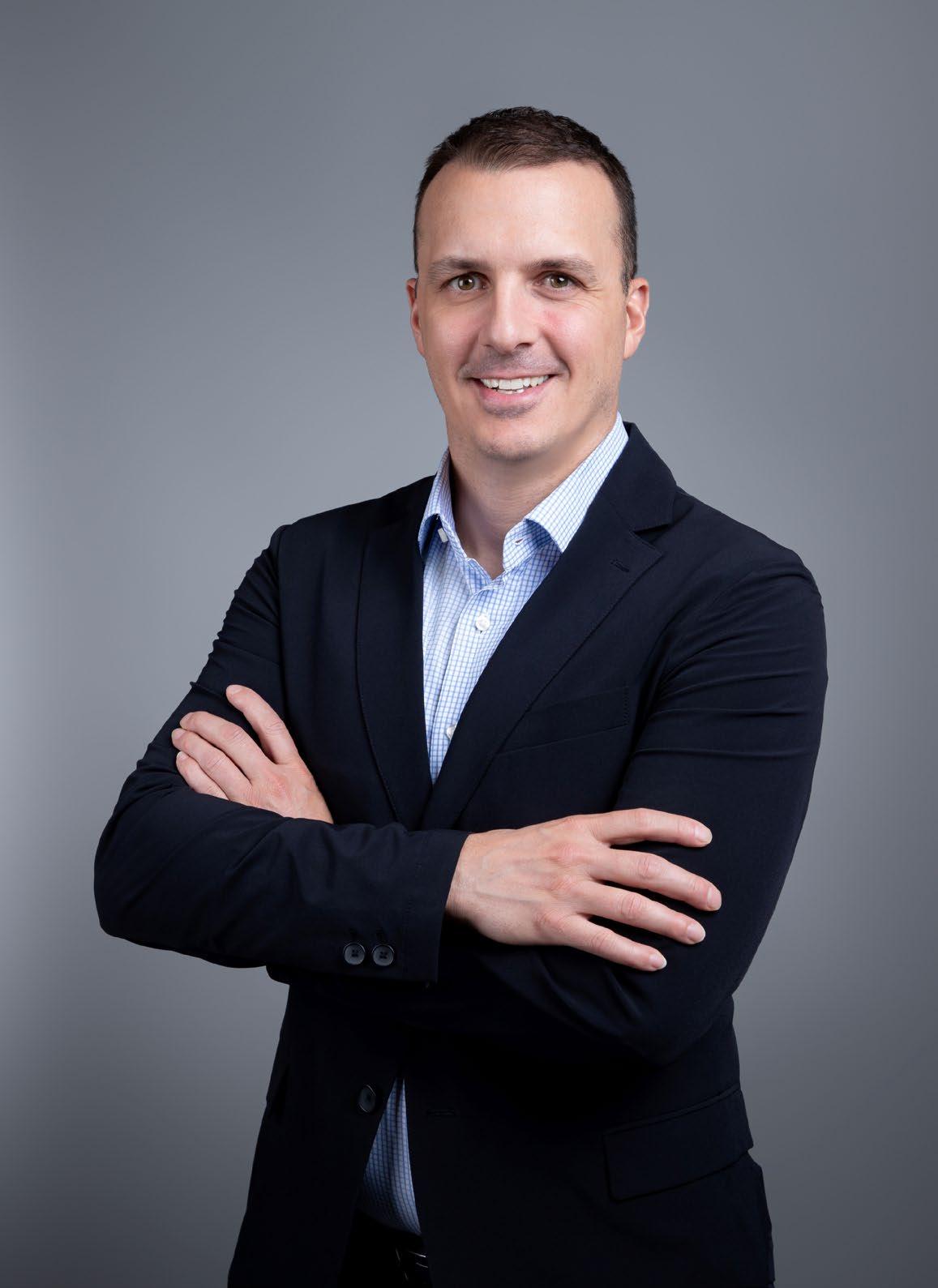
With over 1,100 lawyers from more than 50 countries, Cleary Gottlieb works across practices, industries, jurisdictions, and continents to provide clients with simple, actionable approaches to their most complex legal and business challenges. Clients know Cleary for our signature approach to serving their needs with a wide range of integrated capabilities in antitrust, bank regulatory, capital markets, corporate governance, enforcement, litigation, M&A, tax, and more.
Our lawyer teams bring a sharp focus on the issues that matter most and a commitment to both addressing our clients’ immediate needs and advancing their longer-term strategic goals. We support every client relationship with intellectual agility, commercial acumen, and a human touch. We have a proven track record for serving with innovation. We are fluent in the many languages of local and global business. And we have achieved consistent success in multiple jurisdictions. Global corporations, financial institutions, sovereign governments, local businesses, and individuals come to us for consistently practical and forward-looking advice.
dictions saw Hornung’s role continue to evolve. Hornung gradually took on more and more responsibility and recently added cochief operating officer to his title. “I enjoy an even deeper engagement now across multiple business lines and have the chance to work with our talent on the ground, including our local portfolio management teams,” he says.
“Adam’s journey with Hillhouse has been remarkable,” says Daniel Yeh, global cohead of private equity at White & Case. “His work ethic and leadership exemplify the highest standards of in-house counsel excellence, and his dedication to building the highest caliber teams and fostering innovation ensures that Hillhouse remains at the forefront of the alternative investment industry.”
Since his promotion, Hornung has been busy building teams and working with counterparts in departments like talent, strategy, new business lines, and stakeholder engagement to help strengthen Hillhouse as it expands. Today, the organization has over four hundred employees from eighteen countries. Together, they have closed complex deals in Japan, India, Australia, Netherlands, Switzerland, Canada, Singapore, Korea, UK, US, Germany, the Middle East, and elsewhere.
Several key moves have cemented the reputation Hillhouse enjoys for sound strategy and strong results. For example, Hillhouse invested in Zoom, and in 2017 the company formed a joint venture with Peet’s Coffee to take the brand to China.
In 2021, Hillhouse made a $2.9 billion investment in Dutch company Philips Domestic Appliances (now called Versuni) and introduced
them to new vendors and partners, which improved their supply chain and operating performance. Soon thereafter, Philips launched a top-selling new line of air fryers (AirFryer Combi 700), which sold over ten thousand units on its first day—a company first.
Other notable deals followed. Hillhouse is now among the largest private equity funds globally, investing in Asia and beyond. Its leadership team recently collaborated with like-minded business process management (BPM) veterans to launch Novarete with a Hillhouse commitment of more than $300 million. The investment will allow Novarete to build its team and take its IT-powered BPM platform into industries like healthcare and banking.

Goodwin:
“Adam’s thoughtful approach to building Hillhouse Investment’s global capabilities has been impressive. His steady leadership and focus on developing strong teams have been key to navigating complex international deals effectively.”
—Yash Rana, Partner and Cochair of Goodwin’s Private Equity Group
Gibson, Dunn & Crutcher LLP:
“Gibson Dunn is proud to be associated with Hillhouse, and we congratulate Adam Hornung and his exceptional legal team on their recognition.”
—David Irvine, Partner & Cochair of Gibson Dunn’s Finance Practice
White & Case:
“Adam Hornung has built a world-class team of fully integrated, solution-driven investment and legal professionals that thrives at the cutting edge of global alternative investments, with demonstrated success in navigating the complex landscape of crossborder deal-making.”
—Daniel Yeh, Global Cohead of Private Equity
Goodwin congratulates Adam Hornung and Hillhouse Investment on their successful global performance
We value our longstanding partnership with Hillhouse Investment and Adam Hornung. We’re proud to support their global initiatives across multiple jurisdictions, reflecting our shared commitment to excellence in cross-border transactions.
Top Law Firm for Private Equity and M&A
#1 Law Firm for Global M&A LESG FY 2023, by deal count
Goodwin does more buyouts and growth equity deals than any other firm in the world.

Adam Hornung,
Co-Chief Operating Officer & General Counsel of
Hillhouse, on being recognized for his outstanding achievements.
We are honored to be counted among Hillhouse’s partners in its pioneering investments across the globe.
More recently in Japan, the firm successfully completed a tender offer to take Samty Holdings Limited private. As Samty Holdings’ largest shareholder and one of Japan’s biggest financial firms, Daiwa Securities Group Inc is partnering with Hillhouse to help Samty Holdings’ management transform their business into a leading regional multifamily and accommodation asset manager.
Over the last fifteen months, Hillhouse-backed corporate services platform Ascentium closed more than six acquisitions globally, from Incorp Global in Asia Pacific to Harney’s Fiduciary in the US as it builds a digitally enabled broad service offering. At present, Ascentium has over thirty thousand clients across sixteen markets and counting. Hillhouse continues to help Ascentium accelerate growth, broaden services, and identify potential acquisitions in the Asia Pacific region, the Middle East, and Europe alike.
In 2025, Hillhouse will be preparing for its twentieth anniversary. As Hornung reflects on his career, he is content to be celebrating almost twenty years alongside the firm, going back to those early moments at inception.
“I’m still here because we have great people and an unbelievable culture at Hillhouse,” he explains. “We’ve demonstrated that our approach works. If you’re thoughtful and patient, you have a chance for long-term success in this industry, and that’s what we’re after.”
We are proud to work with
and the talented team at Hillhouse Investment.
Congratulations to Adam on his achievements and his recognition by Modern Counsel.



Bp’s turn away from wind projects highlights challenges in making fast money in the renewable space
By Will Grant
The British energy giant is offloading its US onshore wind energy business in what will amount to a cataclysmic shift in renewable energy strategy. Bp Wind Energy, a subsidiary of bp, is likely to be sold as the larger organization focuses on Lightsource bp, its solar energy subsidiary.
In 2023, bp announced its intention to take full ownership of solar company Lightsource, a company it already had a major stake in. The move to solar is seen as new CEO Murray Auchincloss’s response to struggling profitability in the renewables space.
The renewable energy sector currently faces rising material costs, high interest rates, and continuing supply chain challenges. With those challenges in mind, bp is seeking a buyer for nine onshore wind assets across six states with interest in a tenth. Those wind farms generate enough renewable electricity to potentially power 540,000 homes a year, according to a company press release.
In 2024, bp became the owner and lead developer of the Beacon Wind project located
A creative problem solver and visionary leader, Mike consistently bests the challenges of developing wind and solar projects.
between Cape Cod, Massachusetts, and Long Island, New York, in federal waters. The offloading of bp Wind Energy just months later is a particularly interesting development in the renewables space and is likely to inform broader trends in the industry.
That doesn’t put bp completely out of the wind space, though. In December 2024, the company announced a joint venture with JERA, the largest power producer in Japan. Bp will contribute $3.25 billion while JERA will contribute $2.55 billion. Auchincloss said the new venture, JERA Nex bp, would be a major player in its field while also serving as a relatively cheap investment for shareholders.
“We are very pleased to have reached an agreement with JERA to form a top five wind developer globally,” the CEO said in a prepared statement. “This will be a very strong vehicle to grow into an electrifying world, while maintaining a capitallight model for our shareholders. We very much look forward to combining our strengths in Europe and Asia-Pacific to create another innovative platform.”
On the solar side, Lightsource bp will expand the company’s presence globally, with a 62-gigawatt development pipeline and operations that include nineteen global markets and twenty-eight US solar projects. At present, Lightsource bp has the capability to power more than six hundred thousand homes annually.
“This deal [the acquisition of Lightsource] creates an engine for onshore renewable power development at bp—combining wind, solar, and batteries to generate the energy
flows our traders need to optimize value and the electrons our customers want. It also helps us with our own power demand,” William Lin, EVP for gas and low-carbon energy said in a statement. “Ultimately, this capital-light model will help create significant value for bp’s wider operations. We now look forward to welcoming the team into our global business, helping Lightsource bp continue to build on its market-leading position.”
Successful solar projects include the Arche Solar project in Ohio and Peacock Solar in Texas.
Amid all this change, Mike Rigo, managing counsel for wind and solar, has undoubtedly been busy. The attorney who began his practice at firm Baker Botts doing energy transaction work first encountered bp as one of his clients. Rigo came in-house in 2008 and has aided bp’s increasing presence in the renewables space. The managing counsel oversees a global legal team for offand onshore renewable energy.
In-house counsels like Rigo face difficult propositions, helping drive renewable innovation at an organization built by fossil fuels and with shareholders unwilling to incur any financial discomfort in the process. The balance and patience required is masterful, but fortunately, bp has in-house pros like Rigo in its employ.
Orrick:
“Mike is a fantastic colleague and true renewables expert who knows how to get things done—there is no better client!”
—Blake Winburne, Partner
builds a new legal function at newly public Pactiv Evergreen
By Billy Yost

Mitchell Chief Legal Officer
as chief legal officer and corporate secretary a year into the pandemic, Chandra Mitchell already had significant in-house experience on her résumé. She had held chief operating officer and general counsel roles at Yamaha Motor Ventures and other legal roles at Toyota North America and DRS Technologies. But the Pactiv Evergreen role came with a whole new level of challenges.
For one, Mitchell needed to build out a legal team nearly from scratch. Also, the food packaging and food service products company had gone public a year before Mitchell came on board. Furthermore, the pandemic itself added to the complexities because it severely limited inperson interactions. Mitchell met the new CEO, Mike King, in person only once before she accepted the role.
But Mitchell had a few aces up her sleeve. More than a decade earlier, she had helped facilitate several acquisitions that eventually formed Pactiv Evergreen. Mitchell had also worked on the deal that brought in Pactiv Evergreen’s majority shareholder, Reynolds Consumer Products, in the late 2000s. Essentially, Mitchell had a hand in cre-
ating the modern Pactiv Evergreen, though she wouldn’t come in-house until many years later.
“I was so glad that when the pandemic provided some significant challenges for us, Pactiv thought of me,” Mitchell says. “There was so much going on, with the company having gone public, a new CEO, and the pandemic environment. The growing pains of this organization were just being felt. I relish tough challenges, and it was a great time to come on, but that doesn’t mean it was easy.”
Working from home didn’t slow Mitchell down at all. Aside from the occasional small, in-person meeting, she built relationships across functions and got to know the public company’s stakeholders remotely.
“I don’t know many people who are experts in building a legal team from scratch remotely,” Mitchell says with a laugh. “Pactiv Evergreen is a conglomeration of many different organizations, and we were still running that way when I got here, particularly for the legal team.”
At every organization Mitchell had been part of previously, the “one company” mindset was critical in creating shared processes and cohesion across the business. Mitchell developed thirty-, sixty-, and ninety-day plans to diagnose the legal team’s areas of improvement. She held informal interviews with business and finance leaders to learn what gaps her team could fill. She introduced best practices she’d learned at Toyota and DRS but tweaked them to match the culture at Pactiv Evergreen.
“One of my lawyers told me that every day she comes to work, there is a new, hard puzzle to solve. If you like that kind of challenge, you’re going to like being on my team.”

“There was so much going on, with the company having gone public, a new CEO, and the pandemic environment. ... I relish tough challenges, and it was a great time to come on, but that doesn’t mean it was easy.”
Given the company’s core manufacturing business, safety is a top priority. Mitchell sought out new team members who embodied that culture of safety—amazing attorneys who could also model the organization’s core behaviors and values.
“I found people who had that spark, who were engaged, and who found doing hard things intellectually stimulating,” Mitchell explains.
“One of my lawyers told me that every day she comes to work, there is a new, hard puzzle to solve. If you like that kind of challenge, you’re going to like being on my team.”
In addition to leading the legal team, Mitchell sponsors the company’s social responsibility pillar. At the CEO’s request, she established more formalized giving pro -
grams across the company. For example, the company holds a philanthropic competition across functions and plants. Pactiv Evergreen has also focused on food insecurity, hosting lunch-packing events for students who aren’t always sure where their next meal is coming from.
These giving initiatives have been well received. The CLO notes that Pactiv Evergreen employees want to give back to their communities and she is very proud to have helped facilitate those efforts.
Mitchell is also excited to serve as the executive sponsor of Pactiv Evergreen’s first affinity group: a group for women. “So many companies have long-running resource groups, but because we’re the result of a lot of different companies coming together, this is where our path begins,” Mitchell says. “We’ve realized quickly how important these groups are and how much it means for people to come together. We have ideas for new groups going forward, and I’m thankful to be here for the launch of our first.”
In three years, working quickly and aggressively, Mitchell has taken Pactiv Evergreen from a newly public company to one providing significant value for its shareholders, all the while improving the work environment and strengthening ties to the communities where the company operates.
Indeed, Mitchell’s focused and results-oriented approach seems to have paid off. In December 2024, Pactiv announced its agreement to combine with Novolex, a manufacturer of diverse packaging products, in a transaction valued at $6.7 billion. Mitchell is pleased and proud to have been a crucial part of that successful effort and she’s excited to see what the future holds.
Foley & Lardner LLP:
“Chandra is both brilliant and pragmatic, a crucial combination for a top legal role. She’s an excellent leader who gets the job done in a way that is respectful and encouraging. She’s also a lot of fun!”
—Kate Wegrzyn, Partner
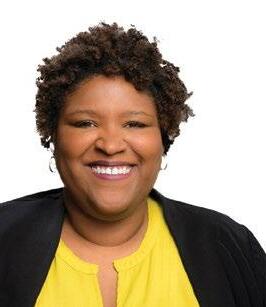
We thank Chandra Mitchell, Pactiv Evergreen’s Chief Legal Officer, for her unwavering dedication to excellence and visionary leadership.

Erika Bauer P138 Casey’s General Stores
Alan Bowie P135 Simon & Schuster
Bill Burtis P46 Juniper Networks
Malaika Caldwell P92 Kyndryl
Meredith Carlo P125 Fidelity National Information Services
Karen Colangelo P159 Pinterest
Beth Crocker P16 Clemson University
Kauê Curti P61 ByteDance
Sarah Decker P50 McAfee
Kyle Dufrane P146 General Motors
Aaron Fennimore P64 Western Digital
Valencia Gallon-Stubbs P164
Bethune-Cookman University
Lisa Haidostian P34 Walgreens
Bo Han P142 Orbital Therapeutics
Leigha Hanby P10 Dick’s Sporting Goods
Steve Heckle P116 LKQ Corporation
Ashley Hill P121 Woodside Energy
Mercedes Hobson P95 X Development
Chadwick T. Holeman P108 Devon Energy
Adam Hornung P172 Hillhouse Investment
Scott Kirkpatrick P30 The Coca-Cola Company
Janet Kwuon P100 Gilead Sciences
Melissa Lou P168 DaVita Kidney Care
Georgia Magno P78 Baker Hughes
Gus Makris P22 Dow Inc.
Maryrose Maness P154 Warner Music Group
Erica McKinney P20 McDonald’s
Chandra Mitchell P183 Pactiv Evergreen
David Modzeleski P25
Warner Bros. Discovery
Jonathan Murphy P84
Kawasaki Motors USA
Javaria Neagle P68
United Airlines
Gabor Balassa, P.C.
Partner
Kirkland & Ellis
312.862.2186
gabor.balassa@kirkland.com
Gabor is a senior litigation partner and trial lawyer who has successfully tried significant commercial disputes and focuses on class actions, accounting malpractice, breach of contract matters, and more.
Atif Khawaja, P.C.
Partner
Kirkland & Ellis
212.446.4749
atif.khawaja@kirkland.com
Atif litigates high-stakes commercial disputes and bet-the-company cases across industries and subject matters from existential disputes surrounding corporate control and investments to multibillion dollar commercial disputes.
Telly Andrews Partner
KMA Zuckert LLP
312.345.3045
tandrews@kmazuckert.com
Telly represents domestic and foreign air carriers, aerospace product manufacturers, commercial airports, pilots, fixed-base operators, and their insurers in connection with a broad spectrum of litigated matters.
Catherine Razzano P40 TikTok
Ali Burney
Partner, Investigations and White-Collar Defense
Steptoe LLP
852.2241.2572
aburney@Steptoe.com
Ali Burney represents clients in matters related to US economic sanctions, export controls, the US Foreign Corrupt Practices Act, and antimoney laundering laws.
Laura Richardson P54
Agiloft
Mike Rigo P180 bp
Audrey Sheetz P88 FanDuel
Kyanna Sabanoglu P58
Meta
Mona Thakkar P130
Volkswagen Group of America
Ala’a Wafa P112 Cummins Inc.
Willie White P150
JELD-WEN
Tom Yebernetsky P98
Ford Motor Company
How legal acts have shaped the way we experience technological advances in every decade
The Copyright Act of 1976 made new media (like movies, music, and TV) a protected intellectual property, recognizing the rights of developers and giving “fair use” an established definition.
To combat the rise of digital piracy, the 1998 Digital Millennium Copyright Act targeted P2P sites like Napster and Limewire for sharing copyrighted files and introduced “takedown notices” for copyright owners to issue to unpermitted platforms hosting their material.
Under President Obama in 2015, the Federal Communications Commission established net neutrality rules to reclassify the internet as a public utility and prevent throttling and “fast lanes” for companies willing to pay providers more, but it has since been repealed, restored, and may be repealed again.

As computers became prominent in business and the government, so too did cybercrime. The 1986 Computer Fraud and Abuse Act criminalized unauthorized access to protected systems and set the precedent for prosecuting hackers.
The Uniting and Strengthening America by Providing Appropriate Tools Required to Intercept and Obstruct Terrorism (USA PATRIOT) Act came weeks after 9/11 to allow the government the right to monitor digital communications, track online activity, and demand customer data from companies to prevent terrorism.
AI has heavily impacted the first five years of the decade, with numerous legal attempts to establish ethics and regulations to the everevolving technology, but the focus remains largely on exploring AI’s capabilities while keeping public safety in mind.







We combine ingenuity with experience to achieve great outcomes for our clients in high-stakes litigation and complex business transactions. With offices strategically located in major financial hubs across the United States and in the United Kingdom, we deliver partnerdriven service in areas of focus where we are recognized leaders, including global litigation, crisis management, life sciences, technology, and brand and reputation management.












